A broad and diverse mix of Local, National and International renewal-related News, Information and Opinions. Views expressed are those of the Authors and may or may not represent those of Catholics For Renewal. This website, going back to 2011, will be closed and accessibly archived from 28 January 2025 (details on Home Page).
News 2024- 28 January 2025 Below; Jan-July 2023 News HERE ; Aug-Dec 2023 News HERE July-December 2022 News HERE
Editorial (November 28, 2024): Is the Catholic Church Getting Back On Mission? HERE
Editorial (August-23 2024): Women’s involvement needed in the formation of future priests HERE Previous Editorials: HERE.
Events: 1.The Synod & the Australian Church, 19 Feb. HERE 2.How to become a Synodal Parish. Books: HERE. Transform Parish Life with See, Judge, Act
2024 – 2025 NEWS (to 25 January 2025)
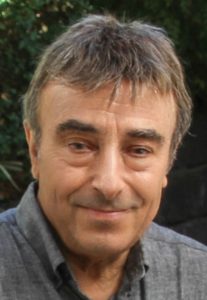 Catholics for Renewal ‘Last Post’, John Costa, Editor, CFR Newsletter & Website, 25 January 2025 Having been invited/persuaded in 2011 by Maria McGarvie & Peter Johnstone to join Catholics for Renewal and establish their website, we posted our first ‘News’ item there that year, and 14 years later I’m now publishing our ‘Last Post’. The website’s original News reporting philosophy has remained intact, which is to publish balanced rather than just one sided News Items on significant renewal issues, fearlessly contributing thoughtful commentary to rigorous reasoned research and analysis, towards providing very accessible relevant information, and preparation of Catholics for Renewal Documents, Editorials, Newsletters, and Submissions. At the same time a resulting large volume of gathered news reports over those years made it appropriate to retain key News items going no further back than to the innovative ‘Family Synod’ of 4 to 25 October 2015. While technicalities might not interest many they are of particular consequence to small volunteer organisations. A mix of planned and unplanned developments over those years obliged us to laboriously build and subsequently rebuild our large website three times at (mostly) short notice, in the process losing, though subsequently rebuilding new links. In a similar way, though independently and with similar short notice, we have also been obliged to rebuild our essential mailing and Newsletter creation platform three times. Beyond its few short paragraphs “The Time Has Come” was recently added to the top of this website’s pre-existing Home Page, and I have attempted there to provide broad context for CFR’s extensive original content, Catholics For Renewal closure, and need ahead for readily accessible information. That recently added paragraph mostly makes the point that despite any contrary perception, a significant change has actually begun towards long sought Church renewal as a consequence of the ‘Synod on Synodality’ outcomes of late October 2024. In particular, sought reforms which have been been clearly pre-expressed and documented by many Catholics can now potentially be more readily progressed over time ‘synodally’. These website resources will remain freely accessible online to anyone for around ten years after CFR closure. In a complementary way, hard copy CFR Research, Analyses, Deliberations, Documents, Newsletters, Editorials, Media Releases and Letters will shortly be physically preserved by Mannix Library in Melbourne. Mannix Library’s primary role is to serve the needs of staff and students of Catholic Theological College (CTC). The Library also welcomes staff and students from the wider University community, and provides library services to subscribed members of the general public. So following closure, we extend best wishes from Catholics for Renewal for much needed and now more confidently anticipated Church reforms ahead.
Catholics for Renewal ‘Last Post’, John Costa, Editor, CFR Newsletter & Website, 25 January 2025 Having been invited/persuaded in 2011 by Maria McGarvie & Peter Johnstone to join Catholics for Renewal and establish their website, we posted our first ‘News’ item there that year, and 14 years later I’m now publishing our ‘Last Post’. The website’s original News reporting philosophy has remained intact, which is to publish balanced rather than just one sided News Items on significant renewal issues, fearlessly contributing thoughtful commentary to rigorous reasoned research and analysis, towards providing very accessible relevant information, and preparation of Catholics for Renewal Documents, Editorials, Newsletters, and Submissions. At the same time a resulting large volume of gathered news reports over those years made it appropriate to retain key News items going no further back than to the innovative ‘Family Synod’ of 4 to 25 October 2015. While technicalities might not interest many they are of particular consequence to small volunteer organisations. A mix of planned and unplanned developments over those years obliged us to laboriously build and subsequently rebuild our large website three times at (mostly) short notice, in the process losing, though subsequently rebuilding new links. In a similar way, though independently and with similar short notice, we have also been obliged to rebuild our essential mailing and Newsletter creation platform three times. Beyond its few short paragraphs “The Time Has Come” was recently added to the top of this website’s pre-existing Home Page, and I have attempted there to provide broad context for CFR’s extensive original content, Catholics For Renewal closure, and need ahead for readily accessible information. That recently added paragraph mostly makes the point that despite any contrary perception, a significant change has actually begun towards long sought Church renewal as a consequence of the ‘Synod on Synodality’ outcomes of late October 2024. In particular, sought reforms which have been been clearly pre-expressed and documented by many Catholics can now potentially be more readily progressed over time ‘synodally’. These website resources will remain freely accessible online to anyone for around ten years after CFR closure. In a complementary way, hard copy CFR Research, Analyses, Deliberations, Documents, Newsletters, Editorials, Media Releases and Letters will shortly be physically preserved by Mannix Library in Melbourne. Mannix Library’s primary role is to serve the needs of staff and students of Catholic Theological College (CTC). The Library also welcomes staff and students from the wider University community, and provides library services to subscribed members of the general public. So following closure, we extend best wishes from Catholics for Renewal for much needed and now more confidently anticipated Church reforms ahead.
The battle over the future of the Catholic Church is fuelling conflict at one Australian university.
Limited edited extract from Jordan Baker, Subscription Newspaper The Age, 19 January 2025 .…..In biblical parlance, Skrbis (Vice Chancellor, Australian Catholic University) must appease both Caesar and God. The latter is harder to manage. Catholic politics is as intense as the secular kind – particularly now, when clerics worldwide are at odds over how to respond to plummeting mass attendance in the developed world. Progressives argue the sanctimonious wielding of doctrine as a weapon is driving people away, and the church should get off its high horse and back to its mission of reaching out to the poor and marginalised; conservatives say appeasing the secular world by weakening positions on issues such as gay marriage and abortion would fatally wound the church. The divisions are no less intense in Australia, where the three most powerful bishops in Sydney, Melbourne, and Brisbane hold different views. A series of scandals at ACU, including two in which university bosses have been accused of sanctioning pro-abortion views – has turned its pretty campuses into the epicentres of that battle over the future of the church. Bishops in hardline Sydney and centrist Melbourne want Skrbis gone, and have asked the Vatican to investigate. Progressive Brisbane, his chief supporter, is doubling down.”……(Source)
As Trump returns, we cannot fear repercussions for standing up, speaking out
Extract from Eilis McCulloh, Global Sisters Report, 17 January 2025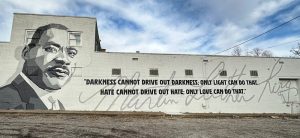 As I sit down to write this, it is Jan. 1 — the dawn of a new year and the hope of a fresh start. Yet, I find myself living in dreadful anticipation of the upcoming four years and praying that things will not be as bad as I think they will be. The United States will soon have a new president — a president who has shown us and told us exactly what he will do. Most of his priorities are not what we care for. He has talked about mass deportations, separating families, ending access to health care for many, restrictions for transgender people, and tax cuts for the ultra-wealthy on the backs of those who are already struggling to survive. These priorities should not come as a surprise — we saw much of this eight years ago. Yet it still feels like a shock to my system. Perhaps the most unsettling aspect is that this year ‘s inauguration also falls on Martin Luther King Jr. Day. On a day we honor King and his prophetic work to achieve civil rights and promote the dignity of all people, we will witness the inauguration of a president who seeks to destroy much of what King fought for. So, how does this year call us to respond? Tucked into one of my books, I found the following quote from King’s “But, If Not” sermon:…….(more). Photo: A mural of Martin Luther King Jr. in Youngstown, Ohio (Eilis McCulloh).
As I sit down to write this, it is Jan. 1 — the dawn of a new year and the hope of a fresh start. Yet, I find myself living in dreadful anticipation of the upcoming four years and praying that things will not be as bad as I think they will be. The United States will soon have a new president — a president who has shown us and told us exactly what he will do. Most of his priorities are not what we care for. He has talked about mass deportations, separating families, ending access to health care for many, restrictions for transgender people, and tax cuts for the ultra-wealthy on the backs of those who are already struggling to survive. These priorities should not come as a surprise — we saw much of this eight years ago. Yet it still feels like a shock to my system. Perhaps the most unsettling aspect is that this year ‘s inauguration also falls on Martin Luther King Jr. Day. On a day we honor King and his prophetic work to achieve civil rights and promote the dignity of all people, we will witness the inauguration of a president who seeks to destroy much of what King fought for. So, how does this year call us to respond? Tucked into one of my books, I found the following quote from King’s “But, If Not” sermon:…….(more). Photo: A mural of Martin Luther King Jr. in Youngstown, Ohio (Eilis McCulloh).
Pope Francis’ game-changing approach to women’s role in the church
Since the beginning of his pontificate, Pope Francis has appointed around 20 women to positions of responsibility in the Vatican, reaching previously unheard-of levels. La Croix analyzed these choices and put them in perspective with his speeches, which reflected a more traditional theology.
Limited extract from By Mikael Corre (and Gonzague de Pontac), Subscription Journal La Croix International 16 January 2025 Could this be what “trickle-down” means? The scene takes place on a rooftop in Rome in October 2023. On the set of the KTO news channel, set up facing the dome of St. Peter’s during the first session of the Synod on Synodality, the then-Archbishop of Korhogo, in the third-largest city in Ivory Coast, explained why he had appointed a woman to a leadership role in his diocese. “The fact that it was a woman (Sister Marie-Madeleine N’guessan, Ed.) leading the process as the diocesan coordinator of the Synod was not well accepted by the men, including some priests. But I did it deliberately because I like to follow examples. The pope appointed a Xavière Sister as under-secretary of the Synod (Sister Nathalie Becquart, Ed.). We have Xavières in our diocese, so we entrusted the process to a Xavière,” Cardinal Ignace Bessi Dogbo, who now leads the Archdiocese of Abidjan. Created a cardinal on December 7, he explained more seriously that he wanted to combat “clericalism” like Francis. The pope leads by example “The fact that Pope Francis appoints women to positions of responsibility in the Vatican can have a symbolic impact,” confirmed Sister Nathalie Becquart, the first woman allowed to vote in the Synod of Bishops in 2021. “This is why I talk about an empowerment process. Among the women, especially theologians, who participated in the Synod in 2023 and 2024, some had never before been invited to speak in front of priests, pastoral agents, or bishops in their country. Now they are.”…………The major “firsts” for women under Pope Francis
Could this be what “trickle-down” means? The scene takes place on a rooftop in Rome in October 2023. On the set of the KTO news channel, set up facing the dome of St. Peter’s during the first session of the Synod on Synodality, the then-Archbishop of Korhogo, in the third-largest city in Ivory Coast, explained why he had appointed a woman to a leadership role in his diocese. “The fact that it was a woman (Sister Marie-Madeleine N’guessan, Ed.) leading the process as the diocesan coordinator of the Synod was not well accepted by the men, including some priests. But I did it deliberately because I like to follow examples. The pope appointed a Xavière Sister as under-secretary of the Synod (Sister Nathalie Becquart, Ed.). We have Xavières in our diocese, so we entrusted the process to a Xavière,” Cardinal Ignace Bessi Dogbo, who now leads the Archdiocese of Abidjan. Created a cardinal on December 7, he explained more seriously that he wanted to combat “clericalism” like Francis. The pope leads by example “The fact that Pope Francis appoints women to positions of responsibility in the Vatican can have a symbolic impact,” confirmed Sister Nathalie Becquart, the first woman allowed to vote in the Synod of Bishops in 2021. “This is why I talk about an empowerment process. Among the women, especially theologians, who participated in the Synod in 2023 and 2024, some had never before been invited to speak in front of priests, pastoral agents, or bishops in their country. Now they are.”…………The major “firsts” for women under Pope Francis
Before Sister Simona Brambilla, Pope Francis made several groundbreaking appointments of women to unprecedented positions of responsibility. Here are some key milestones:
Sister Raffaella Petrini, 56, Sister Yvonne Reungoat, 80, and Maria Lia Zervino, 74, became the first female members of the Dicastery for Bishops in 2022. A year earlier, Raffaella Petrini was appointed Secretary General of the Vatican City State administration.
Sister Alessandra Smerilli, 50, was the first woman promoted in 2021 to secretary of a Roman Curia dicastery.
Sister Nathalie Becquart, 55, was appointed under-secretary of the Synod of Bishops in 2021, becoming the first woman allowed to vote in this institution.
Catia Summaria, 77, became the first woman to head a Vatican judicial body (Court of Appeal) in 2021.Barbara Jatta, 62, was appointed in 2016 as the first female director of the Vatican Museums…………(Source) Photo:Pope Francis, Sr Nathalie Becquart, crop L’Osservatore Romano 20210206
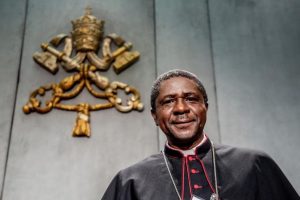
African archbishop says Synod supports small Christian communities in Africa
Extracts from Ngala Killian Chimtom Crux, 13 January 2025
BUEA, Cameroon – A leading African prelate has said that dwindling numbers in western Churches can be reversed if they adopt the small Christian communities approach practiced by the Church in Africa. Archbishop Andrew Nkea Fuanya of Bamenda, in Cameroon’s North West region, was speaking in Buea on the sidelines of the 48th Annual Seminar of members of the National Episcopal Conference of Cameroon (NECC) organized under the theme “Living Synodality in our Local Church.” Nkea, who was one of the 16 members of the Ordinary Council of the Synod and a leading African voice at the synod on synodality, told Crux that the African Church has continued to grow because of its reliance on small Christian communities. “We have the family unit, we have the small Christian community, we have the mission station, we have the parish, we have the deanery, and then we have the diocese. And these various aspects, small units of evangelization, have caught fire in the whole of Africa,” Nkea said……………….Because democracy is the government of the people, for the people, by the people. That sounds very good, theoretically. And the West has imposed this on us to think that this is the best way of governance. When I was growing up, when our local traditional rulers still had the powers that they had in those days, they were benevolent dictators. And they had such order and discipline in their villages……..(More). Photo: Archbishop Andrew Nkea Fuanya of Cameroon, Vatican News
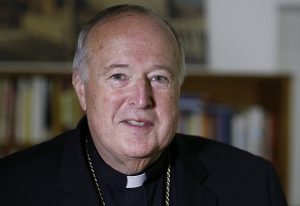 McElroy is an antidote to a US capital and church riven by division
McElroy is an antidote to a US capital and church riven by division
Extract from Opinion Piece, National Catholic Reporter, 10 January 2025
We are in a moment of unprecedented division and uncertainty in both the church and society. That’s why Pope Francis could not have made a better choice to lead the Archdiocese of Washington, D.C., when he tapped Cardinal Robert McElroy. The church in the District of Columbia and southern Maryland is receiving a worthy successor to Cardinal Wilton Gregory, the first African American to be named both a cardinal in the United States and archbishop of Washington. The church owes an enormous debt of gratitude to Gregory who, in 2002, led a reluctant U.S. hierarchy to its first acknowledgement of the truth of the abuse crisis, and for stepping in to steady an archdiocese shaken by scandal. It could reasonably be said that McElroy, a towering intellectual and a model pastor, has long been in training for his new assignment. He is deeply committed to the fullness of the church’s social justice tradition and to the reforms initiated by Vatican II and further accelerated by Pope Francis. As an advocate for immigrants and other scapegoated groups, the soft-spoken cardinal is clear and unequivocal…..(More). Cardinal Robert McElroy,OSV News, Catholic News Service, Paul Haring, 20250111
Nation’s top lawmakers to meet after Catholic Church found not liable for clerical abuse
Limited Extract from Cameron Houston, The Age, December 31, 2024 — 5.30am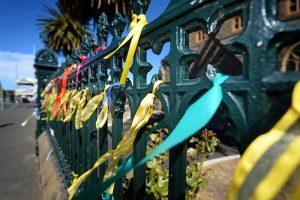 Attorneys-general offices from Australia’s states and territories will meet next week to consider urgent legislative reforms after a contentious court decision that a Catholic diocese was not liable for the clerical abuse of a five-year-old boy. The High Court ruled in November that the Ballarat diocese, in regional Victoria, could not be held responsible for misconduct by its former priest, Father Bryan Coffey, because he could not be legally considered an employee of the church. The landmark decision has upended thousands of legal cases against religious orders nationwide, including more than 1800 civil claims currently before courts in Victoria. The Ballarat diocese and its current bishop, Paul Bird, were initially sued in the Supreme Court of Victoria by a man who said he was sexually assaulted by Coffey at his parents’ home in Port Fairy, in south-west Victoria, in 1971. The man, known in court documents as DP, has spoken for the first time and called for urgent intervention by state and territory legislatures. “I strongly support immediate legislative reform across Australia to ensure that historical abuse survivors are not left in a compromised position with no legal recourse to pursue compensation remedies, or [left] in limbo with legislative reform taking years to come into play,” he said in a statement to this masthead. “The legal landscape has slowly changed for survivors with the limitation period and the Ellis defence being removed. I hope that this will be the next round of significant legislative reforms which will continue to strengthen legal protections for victims across Australia.”…..(Source) Photo: The Loud Fence in Ballarat, where abuse survivors tied ribbons, Dylan Burns
Attorneys-general offices from Australia’s states and territories will meet next week to consider urgent legislative reforms after a contentious court decision that a Catholic diocese was not liable for the clerical abuse of a five-year-old boy. The High Court ruled in November that the Ballarat diocese, in regional Victoria, could not be held responsible for misconduct by its former priest, Father Bryan Coffey, because he could not be legally considered an employee of the church. The landmark decision has upended thousands of legal cases against religious orders nationwide, including more than 1800 civil claims currently before courts in Victoria. The Ballarat diocese and its current bishop, Paul Bird, were initially sued in the Supreme Court of Victoria by a man who said he was sexually assaulted by Coffey at his parents’ home in Port Fairy, in south-west Victoria, in 1971. The man, known in court documents as DP, has spoken for the first time and called for urgent intervention by state and territory legislatures. “I strongly support immediate legislative reform across Australia to ensure that historical abuse survivors are not left in a compromised position with no legal recourse to pursue compensation remedies, or [left] in limbo with legislative reform taking years to come into play,” he said in a statement to this masthead. “The legal landscape has slowly changed for survivors with the limitation period and the Ellis defence being removed. I hope that this will be the next round of significant legislative reforms which will continue to strengthen legal protections for victims across Australia.”…..(Source) Photo: The Loud Fence in Ballarat, where abuse survivors tied ribbons, Dylan Burns
President-elect Donald Trump has nominated the president of an anti-LGBTQ Catholic group to become the next U.S. ambassador to the Vatican.
Extract from Michael Lavers, Washington Blade, 23 December 2025 President-elect Donald Trump has  nominated the president of an anti-LGBTQ Catholic group to become the next U.S. ambassador to the Vatican. The incoming president on Dec. 20 announced he had nominated Brian Burch, president and co-founder of CatholicVote, for the ambassadorship. “Brian loves the church and the United States,” said Trump on Truth Social. “He will make us all proud.” Burch on X said he is “deeply honored and humbled to have been nominated by President Trump to serve as the United States Ambassador to the Holy See.” “The role of ambassador is to represent the government of the United States in its relations with the Holy See,” said Burch. “The Catholic Church is the largest and most important religious institution in the world, and its relationship to the United States is of vital importance.” “I am committed to working with leaders inside the Vatican and the new administration to promote the dignity of all people and the common good,” he added. “I look forward to the confirmation process and the opportunity to continue to serve my country and the church. To God be the glory.” Burch in his post also thanked his wife, Sara, and their nine children for their support…….(Source). Photo: Brian Burch. Screen capture via The Catholic Professional_YouTube 20241223
nominated the president of an anti-LGBTQ Catholic group to become the next U.S. ambassador to the Vatican. The incoming president on Dec. 20 announced he had nominated Brian Burch, president and co-founder of CatholicVote, for the ambassadorship. “Brian loves the church and the United States,” said Trump on Truth Social. “He will make us all proud.” Burch on X said he is “deeply honored and humbled to have been nominated by President Trump to serve as the United States Ambassador to the Holy See.” “The role of ambassador is to represent the government of the United States in its relations with the Holy See,” said Burch. “The Catholic Church is the largest and most important religious institution in the world, and its relationship to the United States is of vital importance.” “I am committed to working with leaders inside the Vatican and the new administration to promote the dignity of all people and the common good,” he added. “I look forward to the confirmation process and the opportunity to continue to serve my country and the church. To God be the glory.” Burch in his post also thanked his wife, Sara, and their nine children for their support…….(Source). Photo: Brian Burch. Screen capture via The Catholic Professional_YouTube 20241223
Letter to The Forum. The age, 3 December 2024
Ashamed at church
I’m embarrassed and outraged to keep reading headlines such as “Legal limbo after church absolved for boy’s abuse” (31/12). In 2018, the Australian Catholic Church abandoned the Ellis defence following the royal commission recommendations. How can church authorities justify continuing to exploit this loophole? I’d hoped that churches had moved beyond the time when their policies were driven by lawyers and insurance advisers rather than accepting responsibility for its priests’ criminal offences. Surely state and federal governments can come together and close this gaping loophole in our laws? Fr Kevin Burke, Sandringham. Source
 Same-sex and remarried divorced couples: The ambiguities of ‘Fiducia Supplicans’
Same-sex and remarried divorced couples: The ambiguities of ‘Fiducia Supplicans’
Blessings for same-sex couples and remarried divorcees have been primarily defined by what they are not since their authorization by the Vatican last December. A year later, we know more about what they are prohibited from being than the specific form they can take.
Limited Extract from Mikael Corre, Subscription Journal La Croix International, 18 December 2024
Let’s face it: everyone is a little lost. Since the publication of the Vatican’s statement Fiducia supplicans, the priestly blessing of couples “in irregular situations”—including same-sex couples and remarried divorcees—has been theoretically permissible within the church. But what form should these blessings take in practice? On this question, the flurry of reactions, critiques, clarifications, and interpretations over the past year seems only to have deepened the confusion. At the heart of the issue lies a key shortcoming of the original text, presented by Cardinal Victor Manuel Fernández, prefect of the Dicastery for the Doctrine of the Faith, and authorized by Pope Francis: Fiducia supplicans focuses more on describing what these blessings are not than on explaining what they might actually look like. What they are not To summarize, these blessings are not a “liturgical rite” or “a blessing similar to a liturgical rite.” For instance, they cannot occur during a Mass or at a time “similar” to a wedding celebration. They “should not be fixed ritually by ecclesial authorities,” and “one should neither provide for nor promote a ritual for the blessings of couples in an irregular situation.” Unlike many blessings found in the Book of Blessings—for the sick, travelers, fields, homes, animals, or even vehicles—these blessings cannot have a fixed, specific text. Behind closed doors What, then, is left? What words can be spoken, and where, and by whom? Fiducia supplicans specifies twice that these blessings may be administered by “a priest,” meaning an ordained man encountered, for instance, during a pilgrimage or a church visit. However, it also mentions “a pastor” once, a term typically referring to the parish priest responsible for a community. This raises a critical question: should these blessings be kept hidden from other parishioners?…..(Source). Image: Fingers_pexels-photo-3693914.jpeg
Two Women join Vatican council that implements Synod
Extract from CathNews, Catholic Review, 16 December 2024
For the first time, women will serve on the Ordinary Council of the General Secretariat of the Synod, the committee that oversees implementation of the most recent Synod and prepares the next assembly. The Vatican announced on Friday Pope Francis’ nomination of four members to the 16th Ordinary Council of the Vatican Synod office. Among his choices are: Consolata Missionary Sr Simona Brambilla, secretary of the Dicastery for Institutes of Consecrated Life and Societies of Apostolic Life, and María Lía Zervino, a member of the Dicastery for Bishops. The Pope also appointed to the council Cardinals Jean-Claude Hollerich of Luxembourg, relator general of the Synod of Bishops on synodality, and Roberto Repole of Turin, Italy. Previously, ordinary councils were comprised solely of bishops, therefore the appointment of two women – a religious sister and a consecrated virgin – signals a departure from that custom. In October, the Synod assembly elected 12 members to the ordinary council from among its ranks, leaving four places for papal appointees. Pope Francis also expanded the council’s size from 16 to 17 members to accommodate the head of the dicastery pertaining to the topic of the next synod. The Vatican has not said if the Pope has chosen the topic for the next synod. The 12 elected council members were chosen to represent different regions of the world. Oceania is represented by Perth Archbishop Timothy Costelloe SDB. The membership also includes one representative of the Eastern Catholic churches and two each from North America, Latin America, Europe, Africa and Asia. The new members of the council will meet via videocall Dec. 17 to discuss the implementation phase of the synod on synodality as well as preparations for the next synod, the Vatican said…..(More)
A controversial graduation address
“On March 15, 2022, the Roman journalist, Sandro Magister, published a memorandum that, he alleged, was circulating among the Cardinals of the Catholic Church at that time. This memorandum was intended to inform the Cardinals about the current state of the Church and the papacy and was calculated to influence them when they would gather in conclave to elect the next Pope after the death of Pope Francis.”
Extract from Bill Uren, Eureka Street, 11 December 2024
On March 15, 2022, the Roman journalist, Sandro Magister, published a memorandum that, he alleged, was circulating among the Cardinals of the Catholic Church at that time. This memorandum was intended to inform the Cardinals about the current state of the Church and the papacy and was calculated to influence them when they would gather in conclave to elect the next Pope after the death of Pope Francis. The memorandum was very critical of Pope Francis himself and particularly his interventions in the operations of the Vatican Curia. It deplored the financial transactions in which the Curia had been involved – and where the Holy See had incurred substantial losses. Even more significantly, it was dismissive of the Synod on Synodality and the model of ecclesiastical governance the Synod was proposing to introduce where a much greater participation of the laity in the lead-up to, and review of, episcopal decision-making was envisaged. The memorandum was circulated anonymously under the name, ‘Demos’, but the author was reliably identified soon after as the Australian Cardinal, George Pell. Cardinal Pell on other occasions had spoken critically on the way in which synodality may dilute the ‘apostolic tradition’, the authority which a bishop, as the successor of the Apostles, may exercise in his own diocese. When Cardinal Pell died in Rome in January, 2023, it was anticipated that an Australian archbishop would soon be designated to succeed him in the ranks of the Cardinals. He and his immediate predecessors as Cardinal had been the Archbishop of Sydney, and it was confidently predicted that the present incumbent in that diocese, Archbishop Anthony Fisher, would soon be raised to that dignity. Indeed, some of his supporters and colleagues in the diocesan offices and in the Australian newspaper had been more than a little forthright in their remonstrances that such a papal designation had not been more immediately forthcoming. Imagine their consternation, then, when, instead of Archbishop Fisher or even some other Australian archbishop, Bishop Mykola Bychok, the Ukrainian Eparch of Saints Peter and Paul in Melbourne, was designated Cardinal-elect by the Pope on October 10, 2024. He was duly installed in Rome on December 7, the youngest member of the College of Cardinals. It was both a surprising and not-so-surprising appointment……(Source)
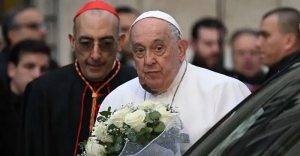 New cardinals, an aging pope and the upcoming conclave
New cardinals, an aging pope and the upcoming conclave
Extract from Robert Mickens, UCA News, 10 December 2024
Pope Francis turns 88 on Dec. 17. Depending on how one keeps score, that will make him something like the fifth or sixth oldest man ever to occupy the Chair of Peter. According to legend, Pope Saint Agatho holds the all-time record. A Benedictine hermit from Sicily, he was supposedly 104 years old (some say perhaps even 107) when he died in the late 7th century as Bishop of Rome. Nonetheless, Agatho, who was called the Wonderworker, had a short reign. He did not even become a cardinal until he was 99 years old. And he was already 101 when elected pope. More than fourteen centuries later, another 99-year-old finally became a cardinal of the Holy Roman Church. He’s Archbishop Angelo Acerbi, a retired papal nuncio who was among 21 men who received the red hat from Francis during a Dec. 7 consistory in St. Peter’s Basilica. No one seriously expects that the same fate awaits Acerbi as that of the ancient St. Agatho, though stranger things have happened — some would say even in this current pontificate! But more than doing strange things, Francis has deliberately been disruptive, putting forth new challenges and instituting reforms of various magnitudes at many different levels throughout the Church. He’s done this to rouse a tired institution that is helplessly watching its center of gravity dramatically shift away from Europe towards Africa and Asia. He’s done this to shake the Church from its complacency and self-preservation, its tendency to wallow in self-absorption. This year’s Advent consistory, the tenth of the Francis pontificate, is the Jesuit pope’s latest “shock to the system.” Among the 20 new cardinals who are under the age of 80, and thus still able to participate in a conclave, are men with a wide variety of talents and experience. Seventeen are still under the age of 70, 13 of them are 65 or younger, and seven have not yet reached their 60th birthday. These younger members — like Frank Leo, 53, the archbishop of Toronto; Baldassare Reina, 54, vicar of Rome; and Roberto Repole, 57, archbishop of Turin — will likely become increasingly influential in the Church’s life over the coming decades. The pope certainly expects them to be major actors in ensuring that his ambitious project of synodality takes root throughout the Church. Francis has also chosen impressive, more senior men to be members of the College of Cardinals……(Source). Photo: Pope Francis, Spanish Steps Rome, Dec8, 2024, AFP_UCA_News_20241210
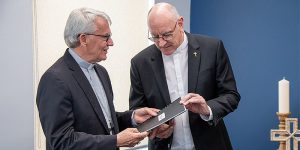 Perth Archdiocese unveils vision for synodality in final assembly report
Perth Archdiocese unveils vision for synodality in final assembly report
Extract from CathNews, The Record, 10 December 2024 The Perth Archdiocese developed a comprehensive final report from its Archdiocesan Assembly, signalling a bold step toward implementing synodality and co-responsibility. The assembly, convened by Perth Archbishop Timothy Costelloe SDB, aimed to re-establish a Diocesan Pastoral Council (DPC) after a hiatus since 1994. The initiative marked a turning point for the archdiocese – aligning it with the global and national Church community in advocating for broader inclusivity, formation, collaboration, and pastoral outreach. The 2023-2024 assembly took place following the conclusion of Australia’s Fifth Plenary Council in 2022, which underscored the need for renewed governance structures across the Church in Australia. Drawing inspiration from Decree 7 of the Plenary Council, Archbishop Costelloe emphasised the importance of listening, discernment, and synodality as essential principles guiding the formation of the DPC. Preparation for the assembly involved an extensive year-long process of formation, rooted in the Ignatian spiritual tradition, culminating in the assembly on July 13 at Newman College, Perth. The final report includes several insights and recommendations: Inclusivity and Diversity: That the Church look at how it can create a welcoming environment for marginalised communities, including Indigenous Australians, migrants, and those feeling alienated by past challenges, such as the sexual abuse crisis. Youth Engagement: Recognising the urgency of attracting younger generations, the assembly called for innovative approaches to youth ministry and education. Role of Women: Delegates advocated for greater recognition and involvement of women in decision-making roles within the Church. Formation and Education: Comprehensive faith formation for clergy and laity alike was identified as essential for fostering a missionary and service-oriented Church. The report outlines the next steps for the DPC, including drafting statutes to govern its operations and ensuring diverse representation among its members……..(More) Photo: Abp Timothy Costelloe receives final report from VG Fr Vincent Glynn, Perth Archdiocese, CathNews, 20241210
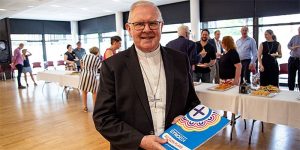 Archbishop Coleridge launches Brisbane’s SYNOD24 document
Archbishop Coleridge launches Brisbane’s SYNOD24 document
Extract from CathNews, Joe Higgins The Catholic Leader 6 December 2024. Action plans from Brisbane Archdiocese’s SYNOD24 have been published in a final document launched in the cathedral precinct last week. Source: The Catholic Leader. The action plans were the fruits of the discernment and discussion of about 130 synod members at the two sessions of SYNOD24 over two weekends in September and October. After the Synod sessions came to a close, the action plans – as well as the notes from synod members on their endorsements and challenges – were handed to Brisbane Archbishop Mark Coleridge who discerned what actions should be implemented and how. In the foreword to the document, Archbishop Coleridge said the actions had been “substantially unchanged” from how they were handed to him by the Synod members. He said having consulted with the archdiocese, he signed off on the documents by his legislative power outlined in canon 466. “In that sense, these are decisions not just of the archbishop but of the Church,” he said. He also has provided priority ratings to guide the archdiocese in weighting its implementation of the actions. “The judgements made are mine, though I realise that the imminent change of leadership in the archdiocese and changes in society through the next few years may influence the process of implementation,” he said. There are 50 actions in total. There are 21 actions with a high priority; 20 with a medium priority; and nine with a low priority. Speaking to a gathering at the launch, Archbishop Coleridge said the SYNOD24 action plans had to be understood in the context of the Church in Australia at this time. He said they must be read alongside the outcomes of Australia’s Fifth Plenary Council and the documents of the Synod on Synodality in Rome……..SOURCE . (download and read the document at aobsynod2024.com ) Photo: Archbishop Coleridge SYNOD24 document, CathNews, The Catholic Leader, Joe Higgins 20241206
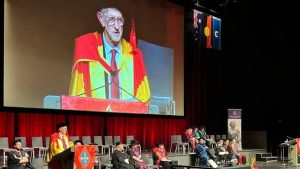 The abortion speech, the student walkout – and the Catholic civil war
The abortion speech, the student walkout – and the Catholic civil war
Extract from Jordan Baker, The Age, 3 December 2024
High-profile conservative Catholic lawyers have warned the Australian Catholic University it faces losing its religious designation if it fails to defend the faith as church leaders split with university bosses in the fallout from an anti-abortion speech on campus. The warning follows a furious, six-page letter to ACU from Sydney Archbishop Anthony Fisher, who raised concerns about the ambivalence of the university’s commitment to its Catholic identity. Joe de Bruyn was invited to give a speech for the Australian Catholic University after receiving an honorary doctorate. Joe de Bruyn was invited to give a speech for the Australian Catholic University after receiving an honorary doctorate. The nine lawyers, including former NSW Coalition attorney general Greg Smith and former state Coalition finance minister Damien Tudehope, wrote to the ACU’s Senate on Tuesday saying their review of church law had made recommendations for the preservation of “the future Catholic identity of ACU”…….(More). Photo: Joe de Bruyn ACU Graduation speech, The Age-20241204.
Australian ambassador: Clergy abuse an ‘existential threat’ for Catholic Church
Limited extract from Christopher White, Subscription Journal La Croix International, 2 December 2024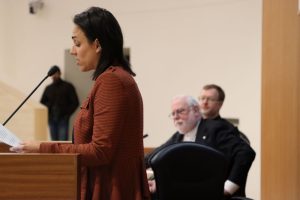 Decades of clergy sex abuse scandals are an “existential threat” to the Catholic Church and can only be remedied through transparency and prioritizing survivors, according to the outgoing Australian ambassador to the Vatican. “Clerical abuse has resulted in lost credibility, a mounting devotional crisis and, it would not be hyperbolic to say, a real existential threat for the Catholic Church,” said Ambassador Chiara Porro. The ambassador gave her remarks in a Nov. 21 lecture at the Pontifical Gregorian University. The event offered the Australian diplomat an occasion to offer public reflections on the theme of safeguarding, which had been one of her top priorities during her four-year posting here. “Talking about child sexual abuse can be confronting and challenging. But as I have often said, it is absolutely indispensable, because child sexual abuse thrives on silence,” she said. “Breaking that silence is a vital step to drive the society-wide effort we need to build a true culture of safety.” The event was co-sponsored by the Australian Embassy to the Holy See and the Gregorian University’s Institute of Anthropology. In attendance was the Vatican’s foreign minister, Archbishop Paul Gallagher; Cardinal Peter Turkson, chancellor of the Pontifical Academies of Sciences; and Cardinal Blase Cupich of Chicago, who served as a lead organizer of Pope Francis’ 2019 summit on the protection of minors……(Source). Photo: Aust Ambassador to Holy See, Chiara Porro, Photo Mirticeli Medeiros, Institute_Anthropology_Interdisciplinary_Studies, 20241202
Decades of clergy sex abuse scandals are an “existential threat” to the Catholic Church and can only be remedied through transparency and prioritizing survivors, according to the outgoing Australian ambassador to the Vatican. “Clerical abuse has resulted in lost credibility, a mounting devotional crisis and, it would not be hyperbolic to say, a real existential threat for the Catholic Church,” said Ambassador Chiara Porro. The ambassador gave her remarks in a Nov. 21 lecture at the Pontifical Gregorian University. The event offered the Australian diplomat an occasion to offer public reflections on the theme of safeguarding, which had been one of her top priorities during her four-year posting here. “Talking about child sexual abuse can be confronting and challenging. But as I have often said, it is absolutely indispensable, because child sexual abuse thrives on silence,” she said. “Breaking that silence is a vital step to drive the society-wide effort we need to build a true culture of safety.” The event was co-sponsored by the Australian Embassy to the Holy See and the Gregorian University’s Institute of Anthropology. In attendance was the Vatican’s foreign minister, Archbishop Paul Gallagher; Cardinal Peter Turkson, chancellor of the Pontifical Academies of Sciences; and Cardinal Blase Cupich of Chicago, who served as a lead organizer of Pope Francis’ 2019 summit on the protection of minors……(Source). Photo: Aust Ambassador to Holy See, Chiara Porro, Photo Mirticeli Medeiros, Institute_Anthropology_Interdisciplinary_Studies, 20241202
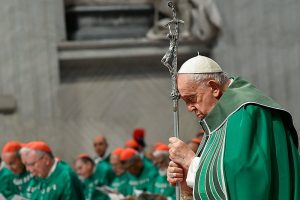 Pope calls on local churches to implement Synod proposals
Pope calls on local churches to implement Synod proposals
Extract from Cath News, CNS, 26 November 2024 Pope Francis yesterday published a note calling on local churches to accept and implement proposals from the final document of the Synod of Bishops on synodality. The document “participates in the ordinary magisterium of the successor of Peter, and as such, I ask that it be accepted,” the Pope wrote in the note. “Local churches and groupings of churches are now called upon to implement, in different contexts, the authoritative indications contained in the document, through the processes of discernment and decision-making provided by law and by the document itself,” he wrote nearly a month after the Synod’s close. The final document outlined key priorities for the Church, including increased participation of laity through new ministries and adjusted governing structures, greater transparency and accountability among Church leadership and creating space for previously marginalised groups. After Synod members voted to approve the final document, Pope Francis announced that he would not write the customary apostolic exhortation after the Synod but would instead offer the document to the entire Church for implementation……(More). Photo: Pope Francis Synod participants conclusion October 26, Vatican Media, CathNews
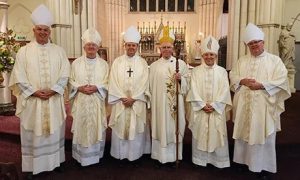 NZ Catholic bishops lament sexual abuse
NZ Catholic bishops lament sexual abuse
Extract from CathNews NZ, 18 November 2024
In a letter read at all Masses last Sunday, the NZ Catholic bishops lamented the actions and lack of actions, the sins and crimes of priests, religious and lay people working in Catholic settings. They said that some of the earlier responses and solutions were ill-advised and had devastating consequences. Along with the sins and crimes of the priests, religious and lay workers, they are left full of shame. The bishops said they have heard how the response of Church leaders was inadequate, inappropriate and, in many cases, added to survivors’ grief and trauma. Renewing their sincere and unconditional apology to victims of abuse in the Catholic Church, the bishops acknowledged that words can never replace what was stolen or fully restore what was destroyed – and to this end they continue to reflect on the lessons of the Royal Commission. Looking back, the bishops say they cannot change the past, but they can help shape the future. The Sunday assembly also engaged in a Litany of Lament………(More) Photo: CathNewsNZ 20241118 NZ Bishops
Pope Francis’ challenge to become a synodal Church
Extract from Bruce Duncan*, Eureka Street, 14 November 2024
TheSynod on Synodality which concluded in Rome on 27 October has not issued stunning documents quite like the Second Vatican Council in 1965 with ‘The Church in the Modern World’, or its Declaration on Religious Freedom. However, Pope Francis wanted to promote something just as significant; he wanted the Church everywhere to learn or relearn the processes of participation involved with synodality. In its ‘Final Document: For a Synodal Church: Communion, Participation, Mission’ the Synod identified ‘three practices that are intimately connected: ecclesial discernment, decision-making processes, and a culture of transparency, accountability and evaluation.’ (#11). If I may use an analogy, the Church can be compared to a motor vehicle in urgent need of repairs. Instead of sending the car off just for minor repairs, panel-beating and a service, it is as if Francis is pulling out the old petrol-guzzling engine entirely, and replacing it with the best of electric engines fitted with the latest electronics so that it runs more smoothly and without damaging the environment with carbon emissions. Francis is promoting synodality to renew the inner workings of how the Church should operate today, carrying forward the vision of the Second Vatican Council. He wants every part of the Church to work through the implications in their different circumstances, while of course still remaining in communion with the wider Church. Australiahad a first run at learning this process with the Plenary Council during 2021-2022 with widespread consultation and discussion at parish, diocesan and national levels. Anyone could join in, have their say in the listening sessions, and make recommendations for action. The Australian experience was closely watched overseas, and helped in the design of the Synod, including the practice of having round-table meetings, with lay men and women sitting as equals in conversation with leading churchmen and theologians, even the Pope himself, along with representatives from other churches and observers. Pope Francis did not expect the Synod to make dramatic doctrinal changes, though there was definite progress on many issues, particularly recommendations for…………(Source) *Bruce Duncan is a Redemptorist priest who lectured on Catholic social thought and movements at Yarra Theological Union for many years.

High Court rules on Ballarat case
Extract from CathNews, 14 November 2024
The Ballarat Diocese has been found not liable for the historical sexual abuse of a young boy by a priest, in a landmark decision that casts doubts over thousands of legal cases against religious orders nationwide. Source: The Age. The High Court yesterday overturned on appeal a previous ruling by Victoria’s Supreme Court and the Court of Appeal that had found the Ballarat Diocese was legally responsible for the misconduct of its former priest, Bryan Coffey. The relevant legislation did not provide a basis for imposing vicarious liability on the Church because the priest could not be legally considered as an employee, the High Court found. The matter has already come to the attention of attorneys-general at state and federal levels, with the High Court conceding that “reformulation of the law of vicarious liability is properly the province of the legislature,” according to the judgment. The diocese and its current bishop, Bishop Paul Bird CSsR, were sued in the Supreme Court of Victoria by a man who said he was sexually assaulted by Coffey at his parents’ home in Port Fairy in 1971. The man, known in court documents as DP, was five years old at the time of the abuse………..(Source)
Vatican, Catholic leaders from Europe discuss sexual abuse in the Church
Extracts from Catholic News agency, 13 November 2024
Catholic leaders from across Europe are in Rome this week to discuss how the Church can best protect children from sexual abuse and how to help those who have already been hurt by it. The Vatican’s Pontifical Commission for the Protection of Minors (PCPM) is hosting a conference on safeguarding in the Catholic Church in Europe from Nov. 13–15…………At the end of October, the Vatican’s safeguarding commission issued its first annual report assessing the Catholic Church’s policies and procedures to prevent abuse in dioceses worldwide from Africa to Oceania. The report noted that in Europe, there are positive advances toward greater safeguarding frameworks and measures within the Church, with numerous good practices in place, but “the differences in response strategies between bishops and religious can present opportunities for growth and improvement.”……(Source)
Archbishop Justin Welby resigns as head of the Church of England
Archbishop Justin Welby, the Primate of the Anglican Communion, announced his resignation November 12, just days after the publication of a report criticizing his handling of a case involving the sexual abuse of minors. Limited extract from Heloise de Neuville, Subscription Journal La Croix International, 13 November 2024 With his position deemed “untenable” by many of his peers, Archbishop Justin Welby of Canterbury, head of the Church of England and Primate of the Anglican Communion announced his resignation November 12. This decision comes barely a week after the release of the Makin report, an independent investigation that revealed cover-ups by senior Church of England officials regarding abuses committed between the 1970s and 2010 by John Smyth on at least 115 boys and young men during Christian summer camps. Smyth, an Anglican lawyer and committed layman, was described in the report as “arguably the most prolific serial abuser to be associated with the Church of England.” While the report found it “unlikely” that Welby had no knowledge of the suspicions surrounding Smyth at the time—something Welby strongly denied—it is primarily his handling of the case in 2013 that is under scrutiny. That year, the Anglican archbishop was officially informed of the accusations against the former lawyer. The Makin report was unequivocal in its conclusion that the archbishop “could and should have” reported the facts to the police…..(Source)
The End of the Synod……And the beginning of synodality
Extracts from Massino Faggioli, Commonweal, 12 November 2024
When Francis was elected pope in 2013, “synodality” was a technical term used mostly by ecclesiologists and Church historians. But a synodal Church was the hope of many who did not have the word for it. The conclusion of the second assembly in October did not necessarily satisfy those hopes. But the process and the Final Document suggest that Catholicism is moving in the direction of a more communional, participatory, and missionary Church—if slowly…………Francis’s pontificate seems to show that papal primacy and synodality are proceeding on parallel paths—close, but still separate. Francis has given synodality an unprecedented boost, opening Catholicism to a theology that develops key themes of Vatican II. At the same time, papal primacy in this pontificate is supported by a unique theological and institutional structure unavailable to synodality. The key question is how to provide synodality a stable and visible dimension without simply creating other ecclesiastical institutions that would interest and involve only a few people. We are entering a very delicate phase: how to shape and reform old and new Church institutions in ways that also keep alive the…….(Source)
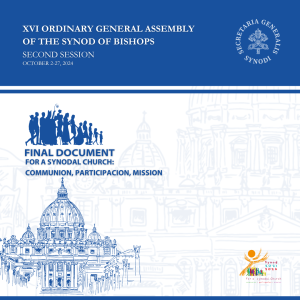 Responses to some key parts of the Final ‘Synod on Synodality’ Report 9 November 2024
Responses to some key parts of the Final ‘Synod on Synodality’ Report 9 November 2024
Extracts from Dr Mick Leahy & Dr Peter Wilkinson respectively, Catholics For Renewal News, also linked below to comments and some other responses, 9 November 2024.
For issues particularly focused on by Catholics For Renewal, the document linked below briefly comments on and/or directly extracts selected parts of the Final Report of the ‘Synod on Synodality’ (XVI Ordinary General Assembly of the Synod of Bishops, Second Session, Oct 2-27, 2024).
“……..I have just finished reading the Italian version. In many ways it is a very rich document, marking some significant developments on the teachings of Vat II. Of particular interest is its call to reform canon law ‘in a synodal key’. Indeed, in this section it goes into some interesting specifics of clarifying the meaning of ‘consultative’ and ‘deliberative’ votes in the church, insisting that there can be no opposition between them, and that a view expressed by participants in an assembly cannot be ignored by competent authority, but, if overruled, it can only be so in light of overwhelming arguments, and must be expressed with justifying reasons ……………Dr Mick Leahy Read systematic responses to Report items by Dr Peter Wilkinson Also Link to Final Report, In Italian or English…..Link to response of Women’s ordination advocates……….Link to New Ways Ministry’s disappointment with 2024 Synod ignoring LBGTQ+ issues….Link to National Catholic Reporter’s call of the Synod for all baptized Catholics to become involved in shaping the future of our Church…..Link to Vatican News on the five parts that make up the structure of the report……Link to America Magazine’s perspective that controversial issues are here to stay………..All of these responses and Links are available (HERE). Image. Cover, Final Synod Report 2024
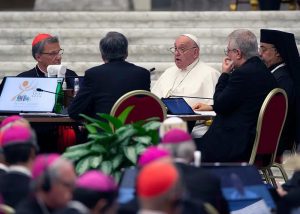 Will the synod transform the church like Vatican II? Father Gilles Routhier, an expert at the Synod of Bishops on Synodality and a theologian teaching at Laval University in Quebec, reflects on the recently concluded three-year synodal process in Rome and its connection to the “experience” of the Second Vatican Council.
Will the synod transform the church like Vatican II? Father Gilles Routhier, an expert at the Synod of Bishops on Synodality and a theologian teaching at Laval University in Quebec, reflects on the recently concluded three-year synodal process in Rome and its connection to the “experience” of the Second Vatican Council.
Limited Extract from Gilles Routhier, Subscription Journal, LaCroix International, 9 November 2024
At the end of the Second Vatican Council, many voices resonated with the sentiment: “The Council is over…; the Council begins!” There was a strong awareness that much needed to be received and implemented if the church was to find renewed vitality, as envisioned by St. John XXIII. Among the reforms, liturgical renewal was conducted most systematically, but many other changes awaited action. Despite challenges, resistance, and diversions, Vatican II left profound marks on the church’s life, practices, and internal relationships among bishops, priests, religious members, and laity, as well as on the church’s interactions with non-Catholic Christians, believers of other religions, and the contemporary world. These impacts stemmed as much from the Council’s teachings as from the fact that the Council itself was an event………By incorporating the results of the assembly’s deliberations into his teaching, Pope Francis has shown that church governance and the papal magisterium cannot be detached from the deliberation of the entire People of God. The synod is over. The synod begins. The final document is a call for the Catholic Church’s conversion—already begun but still to be pursued.……Source HERE Photo: Pope Francis, Second Session 17th Ordinary General Assembly, Synod of Bishops, Oct 26_2024 Photo ALESSIA GIULIANI, Catholic Press, MaxPPP
Spirit cannot be restrained—even on the question of women
Limited Extract from CathNews NZ, 11 November 2024
By Paul Zulehner, professor emeritus of Pastoral Theology at the University of Vienna.
The Synod’s final document has been approved and immediately enacted by Pope Francis. Unlike previous synods, there will be no post-synodal letter. This decision clearly demonstrates the Pope’s vision of how consultation (decision-making) and actual decision-making should interact. The process has emphasised unity and harmony, though the Pope accepts that some topics saw considerable dissent. The document challenges dissenters to respect the decision made; in this instance, appealing to a higher authority is not an option. Controversial Paragraph 60 The paragraph on women drew the highest number of dissenting votes. Here is the text, translated from English…….(MORE)
Theologian Halik: Greater decentralisation of the Church is needed
Extract from CathNews NZ, 7 November 2024 Czech theologian and priest Tomas Halik explains in an interview with katholisch.de why this is not the end, but just the beginning, now the second session of the World Synod in Rome is over. Mr Halik, the discussions at the second session of the World Synod have come to an end after almost four weeks. How do you assess the final phase? Halik: I am convinced that the future of Christianity – at least in this first century of the third millennium – depends to a large extent on how the process of synodal renewal of the Church continues. What most threatens synodal renewal is the idea that the second session is some kind of conclusion to the synodal process. In reality, it must be a beginning. How do you think the success of synodality should be measured? Halik: It must be measured primarily on two levels: The first is the transformation of mentality, which presupposes a deepening of theology and spirituality. The second is the ability of the Church to extend the synodal principle beyond the visible boundaries of the Church and to offer it as inspiration in order to transform the process of globalisation into a process of sharing, mutual respect and compatibility in the spirit of the encyclical “Fratelli tutti” (2020) to transform it. There were some “controversial” topics during the Synod, such as the Church’s treatment of LGBTQ people, more lay participation and the question of the ordination of women. But this synod was not supposed to make any decisions. What does Pope Francis really want to achieve? Halik: The synod assembly in Rome is not an ecumenical council, but rather a kind of “retreat”, “spiritual exercises”……..(MORE)
Confirmation should not be last time young people come to church: Pope
The Church must put more effort into ensuring that the sacrament of Confirmation is not the “sacrament of goodbye” for young people, who receive it and then do not come to church again until they want to get married, Pope Francis said yesterday. From CathNews, CNS, 31 October 2024 “The problem is how to ensure that the sacrament of Confirmation is not reduced, in practice, to ‘last rites,’ that is the sacrament of ‘departure’ from the Church, but is rather the sacrament of the beginning of an active participation in its life,” he said at his weekly general audience. Continuing a series of audience talks about the Holy Spirit in the life of the Church, the Pope said parishes need to identify laypeople “who have had a personal encounter with Christ and have had a true experience of the Spirit”, and ask them to lead the Confirmation preparation classes. But all Catholics must help by rekindling the “flame” of the Holy Spirit that they received at Confirmation like the disciples received at Pentecost, he said. And the Holy Year 2025, which begins on December 24, is a good time to do that. “Here is a good goal for the Jubilee Year: To remove the ashes of habit and disengagement, to become, like the torchbearers at the Olympics, bearers of the flame of the Spirit,” he said. “May the Spirit help us to take a few steps in this direction!”……(More)

Church must continue as a missionary Church: Pope
Extract from CathNews, CNS, 28 October 2024
The Church cannot risk becoming “static” but must continue as a “missionary Church that walks with her Lord through the streets of the world”, Pope Francis said yesterday. Source: CNS. “We cannot remain inert before the questions raised by the women and men of today, before the challenges of our time, the urgency of evangelisation and the many wounds that afflict humanity,” the Pope said in his homily during the closing Mass for the Synod of Bishops in St Peter’s Basilica yesterday.
“A sedentary Church, that inadvertently withdraws from life and confines itself to the margins of reality, is a Church that risks remaining blind and becoming comfortable with its own unease,” he said. Pope Francis delivered his homily seated in front of the basilica’s newly restored 17th-century baldachin – the gilded bronze canopy that had been shrouded in scaffolding for restoration work since February. The previous day, the Pope received the final document approved by the more than 350 members of the Synod. The document called for the increased participation of lay men and women in all levels of Church life, including in parishes, dioceses and in seminaries. In his homily, the Pope called on the Church not to remain in a state of “blindness” to the issues in the Church and the world, a blindness that can take the form of embracing worldliness, placing a premium on comfort or having a closed heart. The Church must listen to men and women “who wish to discover the joy of the Gospel,” he said, but it also must listen to “those who have turned away” from faith and to “the silent cry of those who are indifferent”, as well as the poor, marginalised and desperate. “We do not need a sedentary and defeatist Church,” he said, “but a Church that hears the cry of the world and – I want to say it, maybe someone will be scandalised – a Church that gets its hands dirty to serve the Lord.”…..Source. Photo: Pope Francis closing Synod Mass, CNS, Lola Gomez
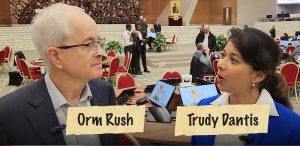 Synod on Synodality Close Interview of Orm Rush, 25 October 2024
Synod on Synodality Close Interview of Orm Rush, 25 October 2024
ACBC Interview of Australian Theologian Orm Rush, by Trudy Dantis.
Five Minute Video interview (Part 2) of Orm Rush by Trudy Dantis, Director of the National Centre For Pastoral Research of the Australian Catholic Bishops Conference. Source, ACBC. HERE
Pope Francis and practising what one preaches
Limited Extract from Kieran Tapsell, Pearls and Irritations, John Menadue Journal, 18 October 2024 Pope Francis has called upon Church authorities to cooperate with civil authorities in relation to child sexual abuse by Church personnel. When it comes to the Vatican cooperating, it is a different story. On 28 September 2024, while in Belgium, Pope Francis is reported to have said: ‘There is no room for abuse in the church. I ask everyone, don’t cover up abuse! Evil must not be hidden, it must be in the open … so that the abuser is judged, whether they be a layman or a laywoman, a priest or a bishop, that they be judged. The word of God is clear.’ If the word of God is clear, Pope Francis is not listening to it. The Holy See only publishes its disciplinary decisions when the allegations are in the public domain. On17 December 2017, the Australian Royal Commission into Institutional Responses to Child Sexual Abuse published its Final Report. Its recommendation 16.10, was that the Holy See should abolish the pontifical secret over clergy sexual abuse. Its recommendation 16.16 was that the Holy See publish in a timely manner its decisions in disciplinary cases and the reasons for them. The Final Report of the 2021 French Independent Commission on Sexual Abuse in the Catholic Church made a similar recommendation. The Australian Royal Commission accepted that it may be appropriate to suppress information leading to the identification of the victim. On 19 December 2019, Pope Francis, to his credit, abolished the pontifical secret, but retained what he called ‘office confidentiality’ for disciplinary proceedings. His Instruction stated that ‘office confidentiality’ did not prevent compliance with civil reporting laws. On 26 February 2020, the Holy See responded to the Royal Commission’s recommendations 16.10 and 16.16. It stated that the pontifical secret had now been abolished but that ‘the publication of decisions in individual cases needs to be evaluated in light of the duty to protect the good name, image and privacy of all persons involved’. ‘All persons involved’ includes the perpetrators and not just the victims. Since 2020, the only published decisions in individual cases seem to be those where the scandals have already been exposed in the media, for example, the 449-page report on Cardinal McCarrick. When the Vatican hands down a disciplinary decision, it is forwarded to the priest’s bishop and is kept in the diocesan secret archive. Neither the United States Conference of Catholic Bishops receives copies of the decisions, nor does the Australian Catholic Bishops Conference…………(More)
Call for end to Church’s ‘lonely decisions’ Extract from CathNews NZ, NCR, English Katholisch, 17 October 2024
Extract from CathNews NZ, NCR, English Katholisch, 17 October 2024
The Catholic Church must move towards collective decision-making, and “the time of lonely decisions in the Catholic Church is over” according to Synod advisor Thomas Söding. In an interview with Vatican News on Saturday, Söding stressed the importance of unity. “For us, deliberation and decision-making belong together. For us, commonality in decision-making is also part of this.” Söding’s remarks come as the Synod on Synodality in Rome continues. It is highlighting the Church’s focus on greater participation in decision-making processes. Söding, Vice President of the Central Committee of German Catholics (ZdK), explained that the Church’s decision-making structure is evolving to reflect a more collaborative approach. “Participation, joint consultation, joint decision-making ‘in Catholic style’ – that is the tradition that we now want to continue” said the theology professor. He noted that this aligns with efforts in Germany’s Synodal Way, where deliberation and decision-making are closely intertwined. While acknowledging the distinct roles of bishops, priests and the laity, Söding underscored the need for commonality in reaching decisions. The Catholic Church wants to stay together. “But we also need greater sovereignty to play on the respective local contexts so that unity and diversity can be brought into a good balance in a completely new way” Söding stressed. Localised regulations warning Söding went on to warn against creating a fragmented Church through localised regulations. “The Vatican should not use the synod to develop as many individual regulations as possible for as many individual countries as possible” he stated. Pope Francis’ decision to invite bishops, other men and women to the Synod of Bishops changed the atmosphere, said Söding. “New voices are being heard. People talk to each other differently, even when speaking as bishops.” Söding described the fact that people from the southern hemisphere also have their say at the Synod on Synodality as “a great asset for the Catholic Church, also in Europe”…..(Source). Photo: CathNews NZ 20241017

Archbishop Costelloe addresses Synod forum in Rome
Extract from CathNews, ACBC, CNS Vatican Media, 20241017
The forum was held in the auditorium of the Jesuit Generalate, looking at the topic “Synodality and the Primacy of the Bishop of Rome”. Archbishop Costelloe said his task was to share his thoughts on “the relationship between the role of the Bishop of Rome and the role of the body of bishops gathered in the Synodal Assembly together with lay women and men, religious, and other clergy”. “In essence we are reflecting on the realities and the possibilities of the network of relationships which hold together synodality, collegiality and the exercise of the primacy.” Archbishop Costelloe said the synodal process “holds a key to understanding how the Synod of Bishops can be of service to the Pope in his role and also of assistance to the bishops themselves”. He discussed his experience of the “threefold dynamic interplay between synodality, collegiality and the primacy” at both the Synod on Synodality and Australia’s Plenary Council. “That council was a local experience which, particularly in terms of its structure and procedures, anticipated the present Synod,” Archbishop Costelloe said. “Both experiences, overwhelmingly positive, have alerted me to the very real danger that what should be a circular process can easily become a linear process: in such a scenario the first stage of the process is to consult the faithful, the second stage of the process is for the bishops to discern the presence or otherwise of harmony between what the faithful have said and what the Church teaches, and the third stage of the process is to submit the eventual conclusions, proposals and decisions to the Pope for approval.” He said the problem with this understanding is that it “separates into three distinct groups” the faithful, the bishops “who act as judges and even censors of what the people have said” and the Pope, “who simply receives at the end the final outcomes in which he himself has previously had little part to play”. “Such an approach, if too rigidly followed, perpetuates a pyramidal structuring of the Church. Such a structure is not in harmony with the vision of Pope Francis, or with the theology of Vatican II.”……(Source)Photo:Pope-Francis-and-Archbishop-Timothy-Costelloe-Oct 4 Vatican Media CNS, CathNews 20241017
 Book highlights Pope Francis’ salutary disruption
Book highlights Pope Francis’ salutary disruption
Edited extract from Mike Mostromatteo, Catholic Outlook, 17 October 2024 The Catholic Church may be on the verge of a new era of laity-supported engagement and encounter as it enters the third decade of the new millennium. So says educator, author and longtime Vatican watcher Michael Higgins in his new release, The Jesuit Disruptor: A Personal Portrait of Pope Francis. The book makes a compelling apology for the Argentina-born pontiff’s plans to free the church from an overreliance on doctrine and tradition and draws attention to the pope’s efforts to bring new talent and fresh thinking into hidebound curial operations. As president and vice-chancellor (emeritus) of St. Jerome’s University in Waterloo, Ontario, Higgins is a longtime commentator and consultant on Vatican issues. He is also author or co-author of esteemed biographies on Thomas Merton and the late Toronto Cardinal Emmett Carter, as well as books on the Jesuit religious order and the church in the new millennium. In addition, Higgins serves as consultant to the Canadian Broadcasting Corporation for much of its church-related programming. The word “disruptor” is an apt title for this new personal portrait. Higgins draws attention to the “-or” spelling, distinguishing it from the more common “-er” understanding of disrupter as something ruinous and harmful. The Cambridge dictionary defines “disruptor” as someone who changes the traditional way an institution operates, especially in a new and effective way. Pope Francis’ Jesuit formation as a priest and later bishop and cardinal is key to the book’s argument. Inspired by Jesuit founder Ignatius Loyola and his spiritual exercises, Jesuits have long been noted for missionary work, education, social justice and aggressive evangelization. As the first Jesuit to occupy the Holy See, Francis clearly brings the society’s ethos to bear on the church…….(More). Photo: Pope Francis in prayer as he presides over the 2022 Way of the Cross at the Colosseum in Rome, Vatican Media, Catholic Outlook 20241017
What is it with the Roman Catholic Church and women?
Limited Extract from Opinion Piece by Dr. Michael W. Higgins, Catholic Outlook, 16 October 2024 What is it with the Roman Catholic Church and women? It is not as if they have just arrived on the scene and need to be integrated into the life of the Church. In fact, they are the life of the church. It is the women who do the heavy lifting of Catholic life: they educate, research, facilitate, spiritually nourish, and sustain the regular rhythms of Catholic religious practice. And, yet, the hierarchy of the Church needs to justify and validate their presence and gifts by writing documents about their irreplaceable charisms or feminine genius, their mystery and mystique, their call to complementarity. The church leadership does this because it sees the clamouring for the inclusion of women in its sacramental ministry as both a rupture with theological tradition and as a threat to its universal unity. So when the issue of women in the diaconate surfaced at last year’s first session of the Synod on Synodality it was not a surprise nor particularly welcomed. But it wasn’t banned either. There was a genuine expectation among many that it would return with the second session—currently unfolding in Rome—but Pope Francis, fearing its contentiousness would detract from the larger agenda of the synod and having already set up a Study Group to look at the issue (and having decided to place oversight in the hands of his fellow Argentine and trusted theologian, “Tucho” Fernandez), sought to defang the matter. Understandably, many concluded that the pope was shelving an issue that remains for many Catholics a subject of urgency. But that interpretation, in my view, misreads Francis’s intention. This unique synod constitutes the highpoint of his papacy; it is establishing a new way of functioning as a church built on the pillars of deep listening, respectful dialogue, and openness to others, a model of social behaviour and governance that could be the church’s gift to a fractious world. Allowing debates around women and holy orders would compromise what Francis wants the synod to accomplish. Still, the issue isn’t going away because it can’t or shouldn’t go away. It needs to be addressed fully, transparently, and with integrity. Francis’s narrative about women and their place in the church is a potent blend of the platitudinous and the pious. And it is unpersuasive. So where do we go?…………(More)

Secret Synod
Vatican Diary: “What are they talking about?” A recap of the first eight days of the second session of the Synod of Bishops on synodality.
Limited Extract from Mikael Corre, Subscription journal La Croix International, 15 October 2024
……This year, the atmosphere is more relaxed than in October 2023. The approximately 350 participants have gotten to know each other, and despite differences in culture and sensitivity, most are happy to meet again. “Hey, how are you? Life’s good?” an Asian bishop asked one of his South American colleagues at midday October 4. The two men passed together through the large audience hall doors, flanked by Swiss Guards. “Coffee?” Last year, the pope asked the synodal fathers and mothers – about 50 women are present – not to respond to journalists. This year, he hasn’t said anything about the matter. It must be said that the media pressure has lessened. When asked, the Vatican did not provide La Croix with the number of journalists accredited in 2023 and this year. But the difference is noticeable: “It’s nice that there are fewer of you, we’re less bothered,” joked an anonymous bishop, describing a genuine “serenity” in the discussions, with a calmer, “more prayerful” atmosphere. However, the reduced media coverage also reflected a certain disinterest. In France, Google searches for the word “synod” dropped by 77% between October 4, 2023, and October 2, 2024, the respective opening days of the two Roman sessions. “Many lost interest when the pope announced the removal of issues like female diaconate and priestly celibacy,” said French Sister Christiane Joly (1), quoted by my colleague Malo Tresca. Indeed, on February 22, Pope Francis announced the creation of a dozen “study groups” parallel to the synod, tasked with exploring certain issues discussed last October, until June 2025. “So, what are they talking about this year?” a rather conservative reader asked me this week, worried “about what’s being cooked up in this secret synod.” Here’s a summary of what’s happened since this second session began, particularly the first eight days, during which the role of women remained a topic of discussion. Wednesday, October 2: Female diaconate “not ready”……Thursday, October 3: Study Groups open……..Friday, October 4: Women in Group 5……..Sunday, October 6: Letter to the Middle East…….Further reading: Synod: A vigil of forgiveness for the ‘sins’ in the church, on the eve of the second session……….. Tuesday, October 8: Lunch with LGBTQI Catholics……Wednesday, October 9: Election of the Final Document Drafting Committee……..(Source). Photo Mikael Corre by Franck Ferville La Croix 20241014
 The Spirit is Moving: Updates from a Global Synod, Letter 3.
The Spirit is Moving: Updates from a Global Synod, Letter 3.
Extract from Br Mark O’Connor FMS, 15 October 2024, Catholic Outlook, Diocese of Parramatta
Throughout October 2024, Br Mark O’Connor FMS, Vicar for Communications for the Diocese of Parramatta and the Pope Francis Fellow at Newman College, University of Melbourne, is providing reports on the second session of the Synod on Synodality in Rome. This is an extract from his third letter for Tuesday, October 15th.
………Mood swings are not uncommon for many of us. They can interrupt our usual ways of coping with reality. Usually, we simply take a break or have a drink (!) or in extreme cases seek professional help. Rome’s weather has also been rather moody in the last week or so. We have been constantly interrupted, oscillating between wild storms, cloudy days, and the usual sunny autumn weather. The martyred Lutheran, Dietrich Bonhoeffer particularly understood that the action of the Spirit can be unpredictable and unsettle us. Indeed, the history of the pilgrim people of God (aka the holy, apostolic Roman Catholic church) and our own personal journeys, are full of surprises, twists and turns, mood swings, and a few major interruptions! Pope John XXIII ‘interrupted’ what appeared to be a calm, comfortable, and stable church, and ‘opened up the windows’ by calling the Second Vatican Council and the Spirit moved amongst us. His successor Popes, over the last sixty years, have each led, ‘interrupted’ the church, and implemented Vatican II, in their own unique way. Synodality: The “gift” of Pope Francis For the last decade, Pope Francis has interrupted and energised the church with his own pastoral vision, born of the Latin American church’s rich history of renewal. He has given us all new impetus to the reception of that great Council. Francis has especially emphasised the Gospel themes of mercy, compassion, and the accompaniment of the people of God. He is sensitive to ordinary people as they struggle to connect their faith to the cultures in which they live. I believe one of the great lasting gifts of Francis for the future of the Church, is his insistence that the mission path ahead (call it evangelisation if you want to use a fancy word) must first begin by humbly listening, then prayerfully discerning, and only then living our way into new forms of pastoral action. Hence, Pope Francis prioritises synodality as the map or methodology for our future church journey. He wants this to be a major legacy of his pontificate. Francis sums it up by stressing: “My hope is that following this Synod, synodality may endure as a permanent mode of working within the Church, at all levels, becomes a shared ecclesial style.” As the delegates have met daily in small groups this last fortnight, listening to each other in ‘conversations of the Spirit’, the general mood is that this ecclesial path of dialogue and encounter is indeed deepening in the global Catholic Church………….(Source)Photo: Alessandro Colle- Shutterstock, Catholic Outlook 20241014
Canon lawyers and theologians recommend ways to make synodality more concrete
Extract from Catholic Outlook, Thomas Reese, Religion News Service, 11 October 2024
(RNS) — Pope Francis preaches about synodality, but canon lawyers are showing us how to make it more than a pious wish.
VATICAN CITY (RNS) — The study groups appointed by Pope Francis to deal with controversial topics removed from the synod’s agenda made their interim reports to the synod on Thursday (Oct. 3). The decision of the pope last March to remove these topics from discussion at the synod was received with disappointment by many observers. He seemed to be cutting off open discussion, which is what people thought synodality was all about. The pope, on the other hand, felt that there were too many topics to be dealt with adequately by the synod and that they would distract from his central topic: synodality. He also felt that these topics were complicated and needed further study. As a result, the pope sent these topics to 10 study groups and two commissions that were to report back to him in June of 2025. Their interim reports to the synod give us some indication of the progress or lack thereof made by the groups. Many of the topics under study are not new to the church. We have been discussing seminary formation since the Council of Trent. Likewise, the relationship between bishops and religious orders has been debated for centuries. Nor is the relationship between the Eastern Catholic churches and the Roman church new. How to select bishops has been an issue since apostolic times. The relationship between the Catholic Church and other Christian churches has come up since the Reformation, although relations have greatly improved since the Second Vatican Council. What is new is the cultural and historical context in which we live today. Great strides have been made in our understanding of physical and social sciences as well as human rights, which include women’s rights. We live in a pluralistic world that is interrelated and threatened by war, famine and global warming. Today, Catholics have a greater understanding of Scripture, tradition and church history thanks to scholarship that began in the 20th century. Theology has broken out of its scholastic prison and developed new methods for approaching old and new issues. The church has gone through the revolutionary reforms of the Second Vatican Council, followed by the repressive regimes of John Paul and Benedict. Francis has once again opened the church to free discussion, although he makes clear the church is not a democracy and that he will make the final decisions.
In this context, how should we see the group reports?….(More)
Second session of Brisbane’s SYNOD24 opens with actions endorsed on lay people, formation and women and men
Extracts from Joe Higgins, The Catholic Leader, 11 October 2024
CHRISTIAN unity was front and centre as the Church in Brisbane opened the second two-day session of SYNOD24 today. The morning began with an ecumenical service, which included members from other Christian churches who work alongside Brisbane archdiocese through Queensland Churches Together. Jumping into the decrees…………..Lay Participation. The first decree up for discussion was Plenary Council Decree Five – “Communion in Grace Sacrament to the World”. This decree had five actions, which were all endorsed by the synod.
The first action was about building up a ministry of administration and hospitality carried out in parishes and communities. This action was endorsed 115 to three.
The second action was about increasing the active participation of the laity by expanding opportunities for lay-led ministries, with the necessary steps taken for training and permission. This action was endorsed 91 to 27.
The third action was about promoting opportunities for lay preaching both within and outside the Sunday Mass with adequate support and training.
This action was endorsed 93 to 24.
The fourth action was about developing and implementing a project to support families participating in the life of parishes and communities.
This action was endorsed 112 to five.
The fifth action was about reviewing formation on the Sacrament of Penance and exploring ways the sacrament could be implemented to meet the needs of the faithful. This action was endorsed 116 to one.
Women and men……(MORE)
 Church must “shape the transition” not “manage the downfall”
Church must “shape the transition” not “manage the downfall”
Extract from CathNews NZ 10 October 2024
Viennese theologian Paul Zulehner (pictured) is convinced that even though churches are increasingly less relevant in today’s world, they still have the ability to help society with today’s problems. Carrying on in the same old way won’t achieve this, he points out. But churches can be “sparring partners for those seeking meaning” or “midwives of hope” in a world filled with fear, he suggests. Catholic without attending Mass Zulehner sees a future where the usual worship gatherings in ageing parish communities won’t be sufficient. The Catholic Church is in the midst of a “turning point” he says. It’s going from a church of priests to one of baptismal vocations. He refers to an online survey which the Austrian Partners Initiative set up and conducted earlier this year. Kathpress says Zulehner presented the study’s first results in lectures in Vienna and Salzburg. He found in the “priestly church” the parish community centres on the priest, while in the “baptismal vocation church” it centres on the people of God. Those who represent the former prove to be far more resistant to structural reforms. The image of the Church has changed, he says. The study pointed to strong agreement with the statement “You can be a good Christian even without Sunday Mass” – a blatant contradiction to the teachings of the Second Vatican Council (1962-1965). In the baptismal vocation Church, celebrations of the Word led by women and men were accepted enthusiastically he says. The celebration of the Eucharist was called into question as the “source and culmination of Christian life” according to the Vatican Council. Get on with it, reinvent Zulehner would like to see more honesty in the Church. It is better to admit that the main motive for structural reforms is a lack of money than to conceal dwindling resources and to put forward religious reasons, he says. As the Kathpress press agency reported on Tuesday this week, the Viennese theologian and sociologist of religion explained: “Then it will be easier to be honest about who decides and what priorities play a role in the decisions”. He also notes the Church is losing its political power, which harms people and society. The Church must not “manage the downfall”, but must “shape the transition”. In this way, he opposed an “exhausting, even paralysing church depression”…….(More). Photo: Paul Zuleher Viennese theologian
What Francis’ newest cardinal picks mean for the next pope
Limited extracts from Christoper White, National Catholic Reporter, 8 October 2024
Unexpected names, overlooked places and people. Of the 21 new cardinals, 20 are under the age of 80 and thus eligible to vote in a papal conclave…………..On the other end of the spectrum is Redemptorist Bishop Mykola Bychok, the 44-year-old Ukrainian Greek Catholic prelate who leads the Eparchy of Sts. Peter and Paul in Melbourne, Australia. By naming Bychok a cardinal, Francis now bestows his first red hat to a Ukrainian Greek Catholic, opting to overlook its primate, Major-Archbishop Sviatoslav Shevchuk of Kyiv–Galicia, who has previously been critical of some of the pope’s remarks on the ongoing war in Ukraine. Bychok’s elevation will also give Australia its first cardinal following the death of Cardinal George Pell in January 2023. In typical Francis fashion, the move bypasses the major sees of Sydney and Melbourne, though the current leaders of those two dioceses who are more associated with the late Pell, who regularly quarreled with Francis, were never expected to receive the honor. More surprising is the decision to bypass Salesian Archbishop Timothy Costelloe, current president of the Australian Catholic Bishops’ Conference, who has been deeply involved in the pope’s ongoing synod on synodality…..(More)
 Pope Francis taps Melbourne bishop to be one of 21 new Catholic cardinals
Pope Francis taps Melbourne bishop to be one of 21 new Catholic cardinals
Limited Extract from Brittany Busch, Subscription Newspaper, The Age, 7 October 2024
Pope Francis has named the 44-year-old head of the Ukrainian Greek Catholic Church in Melbourne a cardinal, drawing words of praise from Australia’s Catholic community. Bishop Mykola Bychok was nominated as a cardinal along with 20 other clergy around the world on Sunday, the pope announced in Rome. Melbourne Archbishop Peter Comensoli said it was a great joy to see Bychok’s appointment after first welcoming him to Melbourne in 2021. “To come to a new country, and then to face into the devastation for his peoples that the war against Ukraine has brought, has been an enormous challenge. Cardinal-designate Bychok has risen to this challenge with dignity and strength,” Comensoli said. Cardinals, who are senior members of the church’s hierarchy, have the special role of electing popes when the Holy See is vacant. They fulfil their cardinal duties in addition to existing roles in the church. Episcopal vicar Andriy Mykytyuk said his colleague’s appointment was a proud moment, and asked for the Catholic community to keep the cardinal-designate in their prayers as he took on the new responsibility. “He’s a good leader, he’s the youngest Catholic bishop in Australia,” Mykytyuk said. “It’s really important for us, not just for Ukrainians but for the whole Catholic community.” The Ukrainian Greek Catholic Church, which is in full communion (effectively, in agreement) with the Roman Catholic Church, is headquartered in Kyiv. The nomination of Bychok gave Ukraine its only cardinal and sent a subtle political message as Russia’s war grinds on. Francis’ decision to appoint new cardinals significantly increases the size of the College of Cardinals and further cements his mark on the group of prelates who will one day elect his successor…..(Source). Photo: Bishop Mykola Bychok, Ukrainian Greek Catholic Church. The Age, 20241007
Pope Francis calls for Church to reimagine the role of bishops
Extract from CathNews NZ, Catholic News Agency, 7 October 2024
Pope Francis has called for a re-examination of the role of bishops in the Catholic Church, emphasising the need for greater collaboration with laypeople. Addressing over 400 delegates at the Vatican’s Paul VI Hall, Francis noted that including laymen, laywomen, priests and religious as synod delegates reflects a shift towards greater participation in decision-making. Francis said bishops should see their ministry as a “collegial” and “synodal” endeavour involving all members of the Church. “Never can a bishop, or any other Christian, think of himself ‘without others’” the pope said. “Just as no one is saved alone, the proclamation of salvation needs everyone and requires that everyone be heard.” The Synod on Synodality is a two-year process that fosters greater dialogue and participation within the Church. It is seen as a significant opportunity to address the institution’s challenges. The pope’s call for a reimagined role for bishops is a key part of this effort. Non-bishops do not diminish bishops’ authority The pope also emphasised the importance of humility and mercy in the Church’s mission……(More)
 Synod rules out women deacons
Synod rules out women deacons
Extract from CathNews, Crux, 4 October 2024
A Synod on Synodality study group responsible for evaluating the female diaconate has said that, while still exploring other forms of women’s’ involvement in the Church, they will not become deacons. Cardinal Victor Manuel Fernández, prefect of the Vatican’s Dicastery for the Doctrine of the Faith, made the announcement during the synod’s afternoon session on Wednesday, the first official working day of the October 2-27 synod. On the women’s diaconate, he said, “We would like to share from the outset that, based on the analysis conducted so far – which also takes into account the work done by the two commissions established by Pope Francis on the female diaconate – the dicastery judges that there is still no room for a positive decision by the Magisterium regarding the access of women to the diaconate, understood as a degree of the Sacrament of Holy Orders.” “The Holy Father himself recently confirmed this consideration publicly. In any event, the Dicastery judges that the opportunity to continue the work of in-depth study remains open,” he said. Pope Francis has previously established two different commissions to study the issue of the women’s diaconate, with the first being established in 2016. Both commissions presented their findings, which were ultimately inconclusive, to the Pope. The topic of the women’s diaconate was among the most hotly debated during last year’s Synod gathering, which touched on other sensitive issues such as priestly celibacy, women’s priestly ordination, and a broader inclusion of the LGBTQ+ community. However, Pope Francis in May took these questions off of the Synod discussion table, instead assigning them to study groups he formed to continue reflection on various points that emerged during the Synod discussion…….(More). Photo: Cardinal Victor Manuel Fernandez CNS/Pablo Esparza
 From Management to Ministry?
From Management to Ministry?
The feeling at the Synod is that something will have to be done about the role of women
Extract from Massimo Fagioli, Commonweal, 1 October 2024
“If [Henrik] Ibsen was a feminist, then I am a bishop,” James Joyce quipped in regard to what some contended were the social messages of Henrik Ibsen plays like A Doll’s House and Hedda Gabler. I wonder what Joyce might say today about the Catholics (bishops and the pope among them) attempting to strike feminist positions on the role of women in the Church as the second assembly of the Synod gets underway. The Church’s official teaching on women is something that keeps Catholicism stuck in what John O’Malley, SJ, called “the long nineteenth century.” The specific matter of women in the diaconate has been removed from the agenda of the Synod in Rome this month and is being handled by the Dicastery for the Doctrine of the Faith. But it’s hard to imagine the issue of the role of women and ministry won’t be at the center of synodal discernment the next few weeks, judging at least from articles appearing in the October 2024 issue of Donne Chiesa Mondo, the supplement to the official newspaper of the Vatican, L’Osservatore Romano. The Church arrives at the Synod seemingly ready to temper the expectations of many Catholic women by maintaining a “secretarial reshuffle” rather than offering an actual synodal reform—in other words, recommitting to appointing women to high-profile positions in Vatican offices. Given Pope Francis’s criticism of the administrative technocracy, this would be paradoxical, even if it could be justified as a necessary step. But it’s not a solution, and it could even become a dangerous and illusory substitute. As Phyllis Zagano said in her recent Jones Lecture at Fordham University: “‘Management’ is open to women. ‘Ministry’ is not.” Commenting on the interview Francis gave to America in November 2022, Zagano continued: So there are three principles, two theological and one administrative. To sum up [Francis’s] belief, the “Petrine principle” covers ministry and the “Marian principle” presents the church as “spouse,” and these two so-called “theological principles” are complemented by the “administrative principle” to which women are suited. Yet Francis’s Synod is also an opportunity to turn the page on the “administrative-managerial” feminism that has brought a number of women to Vatican, diocesan, curia, and bishops’ conferences offices. For almost a century (and especially at Vatican II), the Church has focused on ecclesiology about what the Church is, but Catholicism still hasn’t found itself in regard to women. Consequently, too many women in the Western world have found that Catholicism is not for them. The evidence is there in the loss of entire generations of Catholic women in many countries………..(More). Photo: Synod of Bishops Members before opening of second synod session, CNS, Lola Gomez
Vatican spokesman defends papal record on sexual abuse, chides non-Catholic institutions. Extract from Catholic World News and Vatican News, 1 October 2024
CWN Editor’s Note: Recalling the Pope’s words on abuse in Belgium and his two-hour meeting with abuse victims there, a leading Vatican spokesman deplored the sexual abuse of minors while praising the Church’s record in addressing abuse when compared to other institutions. The abuse scandal was in the spotlight during the Pope’s visit to the nation. “The Pope cited statistics showing that the majority of abuses occur within families, at schools, and in the world of sports,” said Andrea Tornielli, editorial director of the Dicastery for Communication. “With unprecedented clarity, he aimed to eliminate any alibi for the misuse of those numbers by those who would seek to defend themselves by highlighting others’ responsibilities and minimizing the issue.” Tornielli also defended the steps taken by Pope St. John Paul II and Pope Benedict XVI to address sexual abuse: It is true that the Church has undertaken, in the last quarter century, a path that has led to very strict emergency laws against abuse. It is true that others have not taken the same steps. However, it is equally true that abuse within the Church is something horrible, which always begins with an abuse of power and manipulation of the conscience of those who are defenseless…….(More)
 Day two of Brisbane SYNOD24 endorses actions on reconciliation, mission and governance
Day two of Brisbane SYNOD24 endorses actions on reconciliation, mission and governance
Extract from Joe Higgins, The Catholic Leader, 7 September 2024
…..Power of governance The first decree up for discussion on day two was Plenary Council decree seven – “At the Service of Communion, Participation and Mission: Governance”. This decree had four actions and all of them were endorsed by the synod. The first action was about establishing a council to advise the archbishop on continuing the synodal vision of the Church in Brisbane. This action was endorsed by the synod, with 116 endorsements and four challenges. The second action was about establishing a council on the level of parishes and communities to continue the synodal vision in the Church in Brisbane. This action was endorsed by the synod, 107 to 12. The third action was about a project at the deanery level to identify candidates from underrepresented groups who could serve as experts on councils at archdiocesan and parish levels. This action was endorsed by the synod, 109 to four. The fourth action was developing a parish handover process to help parishes discern with, engage and support incoming and existing clergy in the power of governance. This action was endorsed by the synod, 103 to 20. Church on mission The second decree of the day was Plenary Council decree three – “Called by Christ, Sent Forth as Missionary Disciples”. This decree had six actions. The first action was about forming a family and intergenerational ministry to develop and implement family faith formation across educational and archdiocesan agencies. This action was endorsed by the synod, 108 to nine. The second action was about self-nominated Mass centres intentionally offering Mass and liturgical celebrations for diverse needs in the community. This action was endorsed by the synod, 88 to 31. This was the closest vote of the day, but still cleared the two-thirds majority required for endorsement at 74 per cent. The third action was about the archdiocese providing facilitated learning sessions, workshops and forums for safe and supportive story-telling, truth-telling and dialogue. This action was endorsed by the synod, 101 to 12. The fourth action was about supporting formation and mission in ecumenism and interfaith dialogue, driven at the deanery level. This action was endorsed by the synod, 109 to 10. The fifth action was about developing and implementing a strategy for mission in digital spaces for Catholic creators. This action was endorsed by the synod, 101 to six. The sixth action was about engaging and developing pastoral mission through sport. This action was endorsed by the synod, 98 to 20…..(More)
Photo: synod-voting-Brisbane – Joe Higgins 20240917
 Day one of SYNOD24 shows Brisbane Church learning to walk together
Day one of SYNOD24 shows Brisbane Church learning to walk together
Extract from Joe Higgins, The Catholic Leader, 6 September 2024
Hope is the word on everyone’s lips as SYNOD24 closes its first day for Brisbane archdiocese today. Synod member Jan Heath said coming out of her first session with the “Conversation in the Spirit”, she felt “a lot of anticipation and hope for what the Holy Spirit is doing in the Church”. She said the energy in the room was “absolutely buzzing”. “The organisation has been absolutely fantastic; it’s well organised, it’s professional but at the same time there’s a sense of people sharing from their hearts,” she said. “(People are) sharing from their hearts – their relationships with Jesus, their hopes for the future, the absolute sense of calmness was a sign to us that the Holy Spirit is really at work here.” Day one began with a Mass in Holy Spirit Chapel celebrated by Brisbane Archbishop Mark Coleridge and concelebrated by auxiliary Bishop Tim Norton with many clergy of the archdiocese and religious orders. In his homily, Archbishop Coleridge said, echoing the words of Pope Francis, that a synod was not a parliament “where power prevails by vote of the majority”. “That would be putting new wine into old wineskins – all would be lost,” he said. “What we are doing is something much more mysterious; it is of God. “For the cellar of the Church to be properly stocked for the feast, we need wine both new and old.”…..(More). Photo: Synodal_gathering_Brisbane 20240906
 Monsignor Tomáš Halík: A Church that Accompanies – Synodality, Catholicity and Ecumenicity
Monsignor Tomáš Halík: A Church that Accompanies – Synodality, Catholicity and Ecumenicity
Extract from Monsignor Tomáš Halík, Catholic Outlook, 6 September 20246 September 2024.
A Church that Accompanies: Synodality, catholicity and ecumenicity
Between the first and second sessions of the synod, new tasks and challenges emerge. Greater attention needs to be paid to the wider context of the synodal renewal, to the preconditions and consequences of this process. It concerns a much larger and more demanding task than simply transforming a rigid clerical system within the Catholic Church into a net of flexible communication. Synodality, the common way (syn hodos), is designed to renew, revive and deepen not only not only communication within the Church, but the Church’s ability to communicate with other systems in society, with other cultures and religions, with the whole human family. The synodality is to be an inspiring response to the question of how to overcome the crisis of globalization, how to transform a civilization of technological, informational and economic interconnection and, at the same time, dangerous divisions and tensions into a culture of coexistence in peace and justice. Synodality is a way of developing the catholicity (universality) of Christianity. Catholicity, as well as unity, holiness and apostolic character, was given to the Church as a gift and at the same time as a task for the journey through history to its eschatological goal. The Second Vatican Council emphasized that the mission of catholicity includes ecumenical and interreligious cooperation. Pope Francis enriches the understanding of catholicity and ecumenicity with an emphasis on ecological responsibility: care must be taken to ensure that the whole planet returns to being an “oikumene”, a habitable space, a home for the whole human family and all life on earth. Ecumenicity includes openness, welcoming, hospitality and inclusiveness – not a naive and uncritical conformity to the external world, but an openness and receptivity to the dynamics of the Holy Spirit…..(More). Photo: Tomas Halik Msgr, Czech theologian, philosopher and Priest .jpg

Mixed opinions about unproven Synod on Synodality
Extract from John Warhurst, Pearls & Irritations, John Menadue Public Policy Journal, 29 August 2024
The Second Session of the Synod of Bishops on Synodality is now just weeks away. Opinions differ markedly among reformers about its trajectory so far. Some are deeply disillusioned and fearful. Others see evidence of real progress even if change is slow and incremental. The views of the former were represented in a recent editorial by the Melbourne-based renewal group, Catholics for Renewal, which raised fears that this may be a “Clayton’s Synod” which might fall short of real renewal, stalled on its journey by hesitancy, opposition and a “refusal to commit to co-responsibility”. Others see evidence of real progress even if change is slow and incremental. Among them are several recent international visitors close to the international process, Dr Myriam Wijlens and Professor Massimo Faggioli. Their renewal credentials are undoubted, shown by their role as international consultants and co-authors of the 2021 official report, The Light from the Southern Cross: Promoting Co-responsible governance for the Catholic Church in Australia. Among those Catholics deeply involved in and committed to church renewal two distinct groupings have emerged. There are those who are persuaded that some renewal is already underway and that more is now inevitable, and those who are yet to be convinced and who maintain their determined drive against the status quo. The former believe that synodality as a way of being church is now so embedded that there is no going back, while the latter want a synodal model that addresses the existing dysfunctions, including gender inequality and lack of co-responsibility, more decisively and more quickly…….(More) Photo: Bishop P&I
 Brisbane on the move to a Diocesan Synod
Brisbane on the move to a Diocesan Synod
“How can we be a more co-responsible church on mission?”
Edited extract from Archdiocese of Brisbane, 29 August 2024
SYNOD24 marks the Implementation Phase of the Fifth Plenary Council. Since 2018 our Australian church has been asking the question: “What is the Holy Spirit asking of us at this time”?. Through listening, dialogue and discernment your voices have been heard and captured through Fifth Plenary Council Decrees. Now it is time to move our Archdiocese into action. On September 6th and 7th and October 11th and 12th of 2024, the Archdiocese of Brisbane will celebrate a Synod to mark the next phase of the Plenary Council journey, the Implementation Phase. Our Archdiocesan Synod will discern the practical and Spirit-led actions that we, as the Archdiocese of Brisbane, need to undertake in the Implementation Phase of the Plenary Council. Bearing in mind that the Decrees have yet to be officially approved by the Apostolic See, these actions will be practical and able to be implemented immediately. The Synod Engagement Team, and the Synod Writing will engage in strategic consultations with key stake holders, community members and Church agencies. Guided by the question: “How can we be a more co-responsible church on mission?”, these consultations will help discern creative dreaming and actionable ideas about what is already happening within the Archdiocese that should be affirmed, what lessons can be learned from others, and where the gaps and needs are………(More). Photo: Archdiocese of Brisbane
 Diocese launches new pastoral plan for a synodal Church
Diocese launches new pastoral plan for a synodal Church
Extract from CathNews, Catholic Outlook, 23 August 2024
Parramatta Diocese has launched its “Pastoral Plan for a Synodal Church 2024-2028”, which establishes and articulates the diocese’s Christ-centred vision for the next four years. More than 220 people gathered at the Western Sydney Conference Centre in Penrith on August 10 to celebrate the launch. The all-day gathering marked the apex of an extensive process of synodality within the Diocese – that is, of “walking together” – of deep listening, dialogue and discernment with people of different backgrounds, faiths and walks of life across Western Sydney and the Blue Mountains. Bishop Vincent Long OFM Conv said the new pastoral plan supports his motto to “go out into the deep” (Luke 5:4), as it builds upon the former plan, Faith in our Future 2014-2018, and sets out the direction and priorities of the diocese as a synodal Church over the next four years. “Our journey has only just begun,” Bishop Long said. “As we move forward, we endeavour to institutionalise best practice in communal discernment, decision making and governance, which would enhance the authority of the ordained and the rightful participation of the faithful,” he said. “Like the disciples on the road to Emmaus, we are strengthened by the encounter with Jesus as we embark on the journey of participation, communion and mission.” Reverend Dr Ormond Rush said the new pastoral plan is built on a framework of key shared principles. These include the significance of baptism as the starting point for the Diocese’s shared mission in the Church, as well as sensus fidei, meaning “sense of the faith”. “We see this in how a person lives, speaks and acts as a follower of God. It helps us understand that everyone, not just clergy, can recognise true expressions of faith,” Fr Rush said. “It is this sensus fidei, which propels us to work towards a Synodal Church by recognising the truth in what is said as we listen to others, to better understand our faith to make informed decisions, and to keep us on the right path.” ………….(MORE including link to downloadable copy of Diocese of Parramatta’s Pastoral Plan for a Synodal Church 2024-2048). Photo: Launch of Parramatta Diocese Pastoral Plan, Parramatta Diocese, Alphonsus Fok, 20240823
 Geraldton holds its first Synod assembly
Geraldton holds its first Synod assembly
Extract from CathNews, 22 August 2024
History is being made this week as people throughout the Geraldton Diocese in Western Australia gather for the diocese’s first Synod assembly. The assembly began last night outside St Francis Xavier Catholic Cathedral in Geraldton and will continue through to a concluding Mass at 5pm on Friday. Geraldton Bishop Michael Morrissey said the Synod was a “special way of bringing people together to listen carefully to what the Holy Spirit is calling us to be as people of God in this place.” “Under Pope Francis the entire Church is being reminded that we all have a role to play in the Church as baptised believers,” he said. Leading up to the Synod, the diocese hosted listening sessions that gave rise to a working document that formed the basis of the assembly. The theme for the Synod is “The door is open, the heart even more”, inspired by a script above the Mullewa Presbytery door built by Msgr John Hawes, a reminder for him to remain open-hearted to each person who knocked on his door. Assembly delegates are representing all the parishes of the diocese, as well as ministry areas such as aged care, social services, education and health. Observers from other Christian faith traditions will also attend, joined by seven youth delegates from Nagle College. “This is not an event, or a conference”, said Dr Mark Copland, chief facilitator for the assembly. “It is a way of doing or being Church, in which we deeply listen to each other – clergy, religious, lay, young and old…..(Source). Image: Geraldton Diocese Synod logo, Supplied
 Pope discusses climate change with Jeff Bezos
Pope discusses climate change with Jeff Bezos
Edited Extract from Justin McLellan, Earthbeat, National Catholic Reporter, 21 August 2024
Pope Francis met with Amazon founder Jeff Bezos and his fiancée, Lauren Sánchez, vice chair of the Bezos Earth Fund, at the Vatican to discuss climate change. Sánchez posted photos of the meeting at the Domus Sanctae Marthae, the residence where Fancis lives, in an Instagram post Aug. 15, saying that the pope’s “wisdom, warmth, and humor were deeply touching.” “He reminded us not to take life too seriously, a simple yet powerful reminder to keep lightness in our hearts,” she wrote. The meeting was not listed on the pope’s official agenda nor publicized through the Vatican’s media channels. Sánchez wrote that the three of them discussed the “urgent need for climate action,” a passion she said she shares with the pope as vice-chair of the Bezos Earth Fund. Francis’ “belief in finding beauty and meaning in everything we do resonated deeply with me,” she wrote on Instagram, adding, “I love that he encourages priests to read poetry and literature to stay connected with the human spirit.”……….In March, Sanchez announced the Bezos Earth Fund would invest $60 million in centers focused on biomanufacturing and creating proteins. Bezos has committed to spending $10 billion on fighting climate change through the fund……..(More). Photo: Pope Francis, Jeff Bezos & fiance Lauren Sanchez, Vatican CNS Instagram.
 The status and contribution of women in the Indian church
The status and contribution of women in the Indian church
Extract frm Robancy A Helen, Global Sisters Report, 21 August 2024
On Feb. 8, 2024, Pope Francis, explained how every attempt at church reform, like the Second Vatican Council’s reform of the liturgy, must be motivated by “spousal fidelity: the Church-bride will always be more beautiful the more she loves Christ the bridegroom, to the point of belonging to him totally, to the point of conforming to him fully.” He said that women shouldn’t be “reduced” to the ministry question. The pope incorporated the church’s role as Christ’s bride into his prepared text, saying, “I want to say one thing about women’s ministry. The church is a woman, the church is a mother, the church has its figure in Mary, and the church-woman, whose figure is Mary, is greater than Peter; that is, it is something else.”…..(More). Photo: Parishioners Mount Carmel Cathedral, Alappuzha, India, OSV News Barb, Fraze, 2023, Global Sosters Report
 ‘Catholic bishops in New Zealand need to reconsider their positions’
‘Catholic bishops in New Zealand need to reconsider their positions’
The New Zealand Royal Commission’s final report condemns Catholic Church leaders for failing to address abuse and neglect, despite past promises of transparency. Their lack of accountability and evasion of responsibility suggests that the current bishops should reconsider their positions.
Extract from Dr. Christopher Longhurst, Subscripion Journal, La Croix International, 16 August 2024
Based on the New Zealand Royal Commission of Inquiry into Abuse in Care’s final report, Catholic Church leaders have brought great shame on the New Zealand Catholic Church. Their lack of accountability and transparency in responding to pervasive abuse merits serious condemnation. The Commission found that “Catholic Church leaders have not been accountable or transparent to their congregations and the broader community about the nature and extent of abuse and neglect by their members.” (199) Given such a finding, perhaps it would be best for the local Church and New Zealand society if those church leaders—the bishops, tendered their resignations to the pope……(MORE). Photo:Sacred Heart Cathedral, Wellington, Photo Pear285m CC BY-SA 4, La Croix 20240816
 Dioceses of Western Australia apologise to abuse victims and survivors
Dioceses of Western Australia apologise to abuse victims and survivors
Extract from CathNews, 16 August 2024
The Catholic dioceses of Western Australia – Perth, Bunbury, Geraldton and Broome – yesterday issued a joint statement, acknowledging the release of a state parliamentary committee report on support for survivors of institutional child sexual abuse. “The Catholic Dioceses of Western Australia extend their heartfelt and unreserved apology to all those who have suffered the horror of sexual abuse perpetrated by clergy and lay Church workers,” the statement read. “The four dioceses acknowledge the life-long harm and impact of child sexual abuse on victims and survivors perpetrated by people they trusted within the Church. “The protection of children remains the highest priority for the Catholic dioceses of Western Australia.” The WA Community Development and Justice Standing Committee handed down its final report yesterday after examining the support available to survivors of institutional child abuse, ABC News reports. The report made 21 recommendations, including that all parties accept that more needs to be done to provide justice to survivors of institutional child sexual abuse. “It is very apparent that the resources that have been allocated to support and compensate victims of abuse are wholly inadequate,” committee chair David Honey said. The inquiry found the use of the term “historical” in relation to child sexual abuse contributed to the notion that it is an issue of the past, and recommended it no longer be used. It also recommended the names of known child abusers should be published prominently on church websites and the WA Government should create a centrally accessible list of all known perpetrators. In the statement, the diocese said they will now “take the appropriate time to thoughtfully consider” the final report and subsequent recommendations. Accordingly, before being afforded the necessary opportunity to do so, the Catholic Dioceses of Western Australia will make no further comment on the Inquiry or its report at this time.”…(Source). Photo: State parliamentary committee justice survivors, ABC News Keane Bourke, CathNews20240816
Bishop Vincent’s address at the launch of the 2024-2028 Diocesan Pastoral Plan Extract from Catholic Outlook, 14 August 2024
 ……It is with a sense of joy, confidence and hope that we have gathered here for the launch of our Pastoral Plan, which is the fruit of a year-long journey of listening, discernment and consensus-building in the Spirit. Actually, the Diocese of Parramatta has committed to the reform of the Second Vatican Council since its inception. Bishop Bede Heather, the first Bishop of the Diocese, took for his motto as This Sacred Council. He instilled within our foundations a vision for the Church rooted in the ecclesiology of the People of God, that is to say, the primacy of baptism. His successors continued to implement this vision in their own ways. Bishop Kevin Manning presided over the construction of St Patrick’s as the most iconic Vatican II-oriented Cathedral in Australia while Archbishop Anthony Fishop OP oversaw the development of “Faith in our Future” project. For my part, “I sit on the old mat in order to weave the new mat”. I am privileged to build on their legacies. With you, the clergy and people of the Diocese, I have sought to make a wholehearted response to Pope Francis’ invitation to walk the path of synodality. We undertook the most comprehensive, independent and professional Governance Review ever taken in the post-Royal Commission era. This resulted in the establishment or enhancement of our synodal structures and ecclesial institutions. Lay and, in particular, women members thereof provide diverse perspectives and grass-roots input into our governance and decision-making processes. We are the first diocese in Australia to hold a Diocesan Synod following the Fifth Plenary Council of Australia. We show the rest of the Church in Australia a strong innovative civil and ecclesial governance framework for mission in the 21st Century. As Fr Ormond Rush remarked, synodality is Vatican II in a nutshell. The Diocese of Parramatta has decisively embraced the new, holistic and inclusive way of being Church that the Council pointed to some 60 years ago. Indeed, we can only be a more effective instrument of the Gospel when the totality of God’s People is involved. Pope Francis reminds us that the Church cannot be fully itself without involving everyone as co-responsible for its life and mission. The time has come for Church leaders to engage in an energetic communal search with the faithful in their dioceses if they want to be bold and creative in the task of rethinking the goals, structures, style and methods of evangelisation in their respective communities…..(More). Photo:Bishop Vincent Long, photo Alphonsus Fok, Diocese of Parramatta, Catholic Outlook, 20240813
……It is with a sense of joy, confidence and hope that we have gathered here for the launch of our Pastoral Plan, which is the fruit of a year-long journey of listening, discernment and consensus-building in the Spirit. Actually, the Diocese of Parramatta has committed to the reform of the Second Vatican Council since its inception. Bishop Bede Heather, the first Bishop of the Diocese, took for his motto as This Sacred Council. He instilled within our foundations a vision for the Church rooted in the ecclesiology of the People of God, that is to say, the primacy of baptism. His successors continued to implement this vision in their own ways. Bishop Kevin Manning presided over the construction of St Patrick’s as the most iconic Vatican II-oriented Cathedral in Australia while Archbishop Anthony Fishop OP oversaw the development of “Faith in our Future” project. For my part, “I sit on the old mat in order to weave the new mat”. I am privileged to build on their legacies. With you, the clergy and people of the Diocese, I have sought to make a wholehearted response to Pope Francis’ invitation to walk the path of synodality. We undertook the most comprehensive, independent and professional Governance Review ever taken in the post-Royal Commission era. This resulted in the establishment or enhancement of our synodal structures and ecclesial institutions. Lay and, in particular, women members thereof provide diverse perspectives and grass-roots input into our governance and decision-making processes. We are the first diocese in Australia to hold a Diocesan Synod following the Fifth Plenary Council of Australia. We show the rest of the Church in Australia a strong innovative civil and ecclesial governance framework for mission in the 21st Century. As Fr Ormond Rush remarked, synodality is Vatican II in a nutshell. The Diocese of Parramatta has decisively embraced the new, holistic and inclusive way of being Church that the Council pointed to some 60 years ago. Indeed, we can only be a more effective instrument of the Gospel when the totality of God’s People is involved. Pope Francis reminds us that the Church cannot be fully itself without involving everyone as co-responsible for its life and mission. The time has come for Church leaders to engage in an energetic communal search with the faithful in their dioceses if they want to be bold and creative in the task of rethinking the goals, structures, style and methods of evangelisation in their respective communities…..(More). Photo:Bishop Vincent Long, photo Alphonsus Fok, Diocese of Parramatta, Catholic Outlook, 20240813
 Dublin seminary has only one student
Dublin seminary has only one student
Extract from CathnewsNZ, 12 August 2024
A severe vocations crisis is on full display in Dublin: its seminary has just one student. Fr Séamus McEntee, the vocations director for the Archdiocese of Dublin, confirmed the worrying number. “In September, we will have another man coming in… I wish there were more” he said. McEntee also mentioned ongoing conversations with other men considering the priesthood. However, the discernment process is lengthy and rigorous. “I have to discern with them for up to two years before I judge them fit to apply even” McEntry explained. “Then they go forward for panel interview and different assessments and so forth before they go into propaedeutic [preparatory study] year in Valladolid in Spain.” Six dioceses to become three The news comes amid Ireland’s Catholic Church consolidating its six dioceses into three. It is the largest restructure in nearly 900 years. As well as a shortage of priests, the consolidation comes amidst a declining number of practising Catholics. Severe priest shortage. Ireland has only 2,100 priests serving an estimated 3.5 million Catholics and, with many priests nearing retirement combined with the significant lack of new seminarians, the future looks very different from what the country is used to. In 2022, Archbishop of Dublin Dermot Farrell invited “women and men who feel that they are called to ministry to come forward to train as instituted lectors, acolytes and catechists. “These are lay ministers, women and men, who are publicly recognised by the Church and appointed by the diocese to minister alongside priests and deacons in leading liturgies, supporting adult faith formation and accompanying families preparing for the sacraments. “It is my pastoral responsibility as Bishop to do this – for the sake of the gospel and for the sake of the People of God” he said. Lay funeral ministry…..(More) Photo: Ireland Catholic Church, CathnewsNZ 20240812

Next wave of litigation will target bishops’ pledges, not priests’ crimes
Extract from David Clohessy, National Catholic Reporter, 5 August 2024 Sante Fe, New Mexico, Archbishop John Wester is facing an unusual new legal challenge. It has attracted little news coverage. It does not allege clergy sex crimes against children. But I strongly suspect that it has sent plenty of shivers up the spines of Catholic officials across the country. And I predict that it will inspire other similar cases soon. Here’s why. For more than 20 years, in the wake of the horrific 2002 revelations of clergy sex crimes and cover-ups that began in Boston and soon spread across the country, bishops have apologized repeatedly. More significantly, they’ve also made a great many promises. For the most part, little attention has been paid to whether or not those promises, especially the ones made in legal settlements, have been kept. That’s what’s happening in New Mexico. Though media attention to the abuse crisis began to wane in the 2010s, by 2017, two dozen dioceses had been pressured into reluctantly revealing and posting on their websites the names of “credibly accused” child molesting clerics. That September, Wester then finally also took this minimal but long-overdue step, listing 74 such priests, brothers and deacons. Like his brother bishops, Wester unilaterally decided which proven, admitted and “credibly accused” offenders’ names to disclose. (From the outset, controversy surfaced over which men Wester chose to omit from his list.) The following year, New Mexico’s attorney general executed a search warrant for church abuse records. Archbishop John Wester of Santa Fe, New Mexico, seen in a Sept. 12, 2022, photo, has been accused of violating agreements the diocese made in settling its bankruptcy case. (OSV News/Gregory Shemitz) Weeks later, again like dozens of his clerical colleagues, Wester cited dozens of ongoing lawsuits as the reason his archdiocese was filing for Chapter 11 bankruptcy protection. That process was finally resolved in 2022. But now, as NCR reported in April, an experienced victims’ attorney argues that when Wester settled the bankruptcy case, he committed to several non-economic concessions, including giving up unilateral control over which alleged abusers are put on the archdiocesan “credibly accused” list………….(More) Photo: Ribbons of Support LoudFENCE W_Virginia osv News, The Catholic Spirt, Colleen Rowan, NCR 20240805
 Outreach conference underscores progress and challenges for LGBTQ Catholics
Outreach conference underscores progress and challenges for LGBTQ Catholics
Extract from Camillo Barone, National Catolic Reporter, 5 August 2024 Immediately after the opening Mass of the Outreach 2024 LGBTQ Catholic Ministry Conference celebrated in the chapel of Georgetown University by Washington Cardinal Wilton Gregory, Christine Zuba ran excitedly to greet and hug Fr. Andrea Conocchia. The Italian priest has repeatedly brought a group of transgender women sex workers to visit Pope Francis at the Vatican, and the pontiff has struck up a friendship and correspondence of letters with him. Zuba, a Catholic transgender woman who is a retired electrical engineer from New Jersey, met Conocchia a year ago at the 2023 Outreach conference and has kept in touch with him through Facebook. As the rest of the conference attendees left the chapel to go to their respective panels, Zuba remained talking and taking pictures with Conocchia standing at the foot of the altar. Suddenly, the priest proposed something Zuba could never have expected. Christine Zuba and Fr. Andrea Conocchia pose for a photo Aug. 3 after Mass during the 2024 Outreach conference. Christine Zuba and Fr. Andrea Conocchia pose for a photo Aug. 3 after Mass during the 2024 Outreach conference. “Why don’t you also come and meet the pope when I go back to him?” he asked her. The 2024 Outreach conference, Aug. 2-4, brought together more than 400 LGBTQ Catholic laypeople, clergy, scholars, artists, educators, students and family members from all over the U.S. and abroad for more than 10 panels, moments of prayer and spirituality, and social hours. For the first time since the Outreach conferences began in 2022, this year a cardinal celebrated a Mass for the attendees. In a letter to Outreach founder Jesuit Fr. James Martin, Francis said he was “glad” about Gregory’s participation in the conference, adding that he would join him in prayer. “The presence and the pastoral needs of our LGBTQ sisters and brothers may often be viewed as a volatile topic, but they must be faced with sincerity and genuine compassion,” Gregory said in his homily Aug. 3. “I pray that this conference advances that goal and makes us a stronger, holier and more welcoming church and nation.”…..(More). Photo: Catholic Transgender woman, Holy Trimity Catholic Church, Washington DC, NCR Photo, Camillo Baarone, NCR 20240805.jpg [Quality Word W10]
 The Vatican synod agenda calls for transparency. But on women deacons, it’s lacking.
The Vatican synod agenda calls for transparency. But on women deacons, it’s lacking.
Extract from Christopher White, National Catholic Reporter,31 July 2024
One of the clarion calls included on the agenda for October’s Synod of Bishops is for the church to consider how to build a greater culture of transparency and accountability. But when it comes to women deacons, a number of leading theologians, scholars and activists believe the Vatican’s doctrinal office is failing to practice what the synod is trying to preach. Earlier this year, Pope Francis established 10 study groups to examine some of the most contentious issues that surfaced at the first session of the synod on synodality in October 2023, including one to consider the question of women deacons. The membership of the study groups had been kept secret for over three months, but at the conclusion of the July 9 press conference to present the agenda for the Oct. 2-27 synod assembly, when reporters could no longer ask questions, the Vatican published the names of the individuals participating in each group — with one critical exception. Under “group five” — which has been tasked with considering “some theological and canonical matters regarding specific ministerial forms” and, in particular, “theological and pastoral research on the access of women to the diaconate,” no individual members were listed. Instead, a note explained that “the in-depth study of the issues at hand-particularly the question of the necessary participation of women in the life and leadership of the church has been entrusted to the Dicastery for the Doctrine of the Faith, under the coordination of the Secretary for the Doctrinal Section, Msgr. Armando Matteo.” ……(More) Photo: St Peters Square, Vatican Nov 2019, CNS Paul Haring NCR20240731
 Has the synodal church stopped listening?
Has the synodal church stopped listening?
Extracts from Daryl Grigsby, National Catholic Reporter, 30 July 2024 As the official synodal process enters its fourth year, the Vatican recently released the document, the instrumentum laboris, to guide discussions for the October 2024 synod. The document was relatively stunning in its admission of challenges, beauty of language on the Trinity and Christ and mission; and, for its announcement that opening the diaconate for women will not be a topic of discussion at this coming October synod in Rome. But there were many omissions — too many for a document that was to lay out the next steps in the “listening” process called synodality. When it comes to my beloved Catholic Church, I am a realist. I did not expect there to be a decision on women deacons finalized and announced after the October synod. I did, however, expect input from experts, robust dialogue, learning and discerning among those present. The synthesis report from last October contained 81 proposals. Those proposals included bishop accountability, enhancing priest engagement in the synod, more formation for laity and priests, establishing ministries for youth in local parishes, and increasing awareness of Catholic social doctrine, among many others. The proposals were contained within the document’s three major parts: “The Face of the Synodal Church,” “All Disciples, All Missionaries,” and “Weaving Bonds, Building Communities.” These proposals were the outcome of global listening sessions in parishes, schools and other institutions; with results compiled into diocesan, national and then continental reports. These reports from around the world were reviewed, analyzed and summarized in the Document for the Continental Stage. That information then led to the instrumentum laboris, which guided the discussions for the October 2023 in Rome………..How tragic is it: as our priests and deacons age, we rely increasingly on foreign priests, we fervently pray for an “increase in vocations,” and yet do not even discuss unleashing a resource and solution right in our midst? Imagine the impact of a woman deacon officiating alongside a parish priest. I can attest to the impact, for the church I attended in Seattle had a woman, Patty Repikoff, serving as pastoral life director. The energy, relationships, connections and mission of the parish were greatly enhanced by her homilies, pastoral skills and talents. Not even discussing this issue in October is a major mistake. Jesus told us, the Spirit is like the wind, we do not know where it has been, or where it is going (John 3:8). How do we discern its direction without dialogue? The apostle Paul asked, “How can they hear without someone preaching to them?” (Romans 10:14). I would ask, “How can we discern, without listening?………..(More) (Photo): Synod Start, CNS Photo Lola Gomez, La Croix 20240730
Archdiocese of Seattle’s 136 parishes officially become 60 parish families
Extract from Northwest Catholic, National Catholic Reporter, 26 July 2024 The Archdiocese of Seattle’s 136 parishes have officially become 60 parish families as part of Partners in the Gospel, the archdiocese’s strategic pastoral planning initiative. The July 1 move comes after two years of planning and consultation with clergy, parish and school staffs and the laity, the archdiocese said. Each parish family will be led by a pastor or pastoral coordinator, and many will have at least one parochial vicar. “Together, over the next three years, the parish family will work to form one new canonical parish, while creatively re-envisioning how they will serve their community,” the archdiocese said in a news release. In a July 1 letter to Catholics in the archdiocese, Archbishop Paul D. Etienne explained that the goal of Partners in the Gospel is to reinvigorate parish life and help people draw closer to Jesus. “Imagine full Sunday Masses, people engaged in the sacraments, growing youth and young adult groups, and people excited about their Catholic faith,” Etienne wrote. “One way we hope to achieve this is by changing how we’re structured to more effectively use our resources — our people, our structures and our finances — so that we can recalibrate our focus on achieving this mission,” he added…..(More)
 Truth telling to fill gap left by defeat of Voice referendum
Truth telling to fill gap left by defeat of Voice referendum
Extract from CathNews, The Age, ABC News/Mitchell Woolnough, 26 July 2024
A minimalist, community-led plan to “tell the truth” about Indigenous dispossession is envisioned by the Albanese Government to fill the void on reconciliation after its crushing Voice referendum loss. Truth-telling is one of the three key elements of reform proposed by the Uluru Statement from the Heart – the influential Indigenous-authored document that spawned the Voice proposal. According to Government sources speaking anonymously to detail private thinking, Labor views a program to educate Australians about Indigenous history as less politically contentious than a treaty, the statement’s third component. As retiring Indigenous Australians Minister Linda Burney declared, history would look kindly upon the Voice effort and Liberal MP Julian Leeser lamented the “national silence” that has existed since its defeat, Labor favours a truth-telling model led by local Indigenous groups unearthing local histories to eventually form a national story of Aboriginal Australia. This approach would contrast with truth-telling models such as that in Victoria, where the state Labor government has shunned a number of the sometimes contentious policy recommendations by the royal commission-style inquiry it established………(More)
 A busy week for three potential future popes
A busy week for three potential future popes
Extract from Christoper white, National Catholic Reporter, 25 July 2024 Since the beginning of his pontificate, Pope Francis has refused to take a proper summer vacation — forgoing the tradition of popes escaping the Roman heat at the holiday villa of Castel Gandolfo outside of the city. Even so, during July and August, the pope is taking a break from most liturgies and meetings leading to a reduced public schedule, and this week — as Francis gets some much needed rest inside Vatican walls ahead of the longest international trip of his papacy in September — three potential future popes are having their own moment in the spotlight……(More). Photo:Cardinal Pietro Parolin, Canadian Cardinal Gérald Lacroix, Cardinal Luis Antonio Tagle – National Catholic Reporter 20240724
 Munich archdiocese faces revenue drop – forcing cuts
Munich archdiocese faces revenue drop – forcing cuts
Extract from CathNews NZ, Katholisch, 25 July 2024
The German Archdiocese of Munich and Freising has reported a significant 6.2% drop in church tax revenue for 2023, due primarily to many parishioners leaving the church. Finance Director Markus Reif announced at the Federal Budget Press Conference in Munich that the archdiocese’s income fell by €41 million to €617 million. The German church tax system requires registered church members to pay a tax, usually 8-9% of their income tax, to their respective church. The state collects this tax and then distributes it to the churches. The tax funds church activities, salaries and social services. Members can opt-out by formally leaving the church, which stops the tax obligation. The decline in registered parishioners in Munich reflects a nationwide trend. According to the German Bishops’ Conference, 522,821 people in Germany left the church last year…….(More)
 Yes-no: Despite papal denial women’s diaconate talks persist
Yes-no: Despite papal denial women’s diaconate talks persist
Extract from CathNews NZ, USCCB, 22 July 2024 The women’s diaconate is a discussion that won’t go away. Pope Francis consistently says “no” when asked if women can be deacons or join the Catholic clergy. But Francis supports discussion about the women’s diaconate. This October’s synod working document affirms “theological reflection should continue”. Since last December the Pope and his Council of Cardinal Advisors – the “C9” – have had four meetings where women’s input has been sought. Talks from the December council meeting were published in February. Speeches three women made at that meeting and two cardinals’ responses to them are included in a book published on July 11. The Church “has sometimes fallen into the trap of considering loyalty to ideas to be more important than attention to reality” the Pope’s foreword to the book says. The women’s diaconate At the February meeting, Salesian Sister Linda Pocher (pictured) told the C9 that justifications for reserving ordained ministry to men “are weak, and it is important to recognise and be aware of it”. Biblically, the 12 apostles’ calling cannot be equated with the institution of priestly or episcopal orders as they are understood today. Theological justifications for excluding women from holy orders that assumed women were inherently incapable of holding positions in the public sphere don’t hold true today, she said. Furthermore historical papal decisions don’t justify maintaining the practice. Many popes have altered positions held by their predecessors…….(More). Photo: Salesian sister Linda Poche, CathNews NZ, 20240722
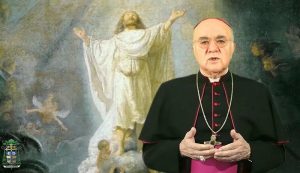 Vatican excommunicates former nuncio Viganò Convicted of the crime of schism, the former nuncio to the United States, Carlo Maria Viganò, was declared excommunicated latae sentiae.
Vatican excommunicates former nuncio Viganò Convicted of the crime of schism, the former nuncio to the United States, Carlo Maria Viganò, was declared excommunicated latae sentiae.
La Croix International
Limited extract from Xavier Le Normand, Subscription Journal La Croix International, 5 July 2024
“The Most Reverend Carlo Maria Viganò was found guilty of the reserved offense of schism.” Consequence: the former apostolic nuncio to the United States is “declared the latae sentiae excommunication in accordance with canon 1364”. This article of the code of canon law provides for the ipse facto excommunication of “the apostate of the faith, the heretic or the schismatic”. This conclusion was announced in a press release published on July 5 by the Press Office of the Holy See. It follows a meeting of the Congress of the Dicastery for the Doctrine organized the day before, to rule on the accusations of schism brought against Archbishop Viganò. “His public statements manifesting his refusal to recognize and submit to the Supreme Pontiff, his rejection of communion with the members of the Church subject to him, and of the legitimacy and magisterial authority of the Second Vatican Council are well known,” explains the press release. It is specified that the decision was communicated to the Italian archbishop on July 5……(Source). Photo:Archbishop Vigano, YouTube. La Croix International, 20240705
Yes proponents analyse defeat of Voice referendum
Extract from CathNews, The Catholic Weekly, 5 July 2024
A failure of process, a shift in the nation’s temper and the city-regions divide were among factors contributing to the defeat of the Voice to Parliament referendum, leading Yes proponents said at the launch of two new books. Fr Frank Brennan SJ and Damien Freeman, the authors of Lessons from Our Failure to Build a Constitutional Bridge in the 2023 Referendum and The End of Settlement, both published by Connor Court, were joined by senior Australian Catholic University staff and academics, members of parliament, and a large, engaged audience for the launch at North Sydney’s Peter Cosgrove Centre on Tuesday…..(More)
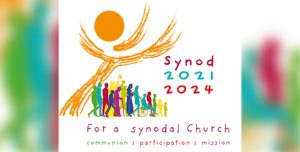 The Vatican will next week publish the guiding document for discussions at the final assembly of the Church’s Synod on Synodality.
The Vatican will next week publish the guiding document for discussions at the final assembly of the Church’s Synod on Synodality.
Extract from CathNews, CNA, 4 July 2024 The Instrumentum Laboris, or “working tool” for the upcoming 16th Ordinary General Assembly of the Synod of Bishops, will be presented at a July 9 press conference by Cardinals Mario Grech and Jean-Claude Hollerich, together with the special secretaries of the synodal assembly. Dubbed the “Instrumentum Laboris 2,” the document has been in preparation since early June, when approximately 20 experts in theology, ecclesiology, and canon law held a closed-door meeting to analyse Synod reports from dioceses and religious communities. The Instrumentum Laboris will guide the discussions at an assembly at the Vatican in October. The month-long gathering is the second session of a two-part assembly of the Synod on Synodality. The first session was held in October 2023. The second October assembly is a continuation of the multiyear Synod on Synodality, which began in October 2021 and has included stages of discernment and discussion at various levels of the Church. The meeting will bring together Catholic bishops, priests, religious, and laypeople from around the world to discuss topics included in the Instrumentum Laboris and to prepare the Synod’s final document…..(More)
 The Viganò ‘schism’ in this post-Vatican II moment
The Viganò ‘schism’ in this post-Vatican II moment
Signs of the times. The Viganò phenomenon highlights a significant post-Vatican II rift within Catholicism. While Viganò’s conspiracy theories are troubling, the main concern is the silent schism of disengagement and potential backlash against synodal decisions. Limited extracts from ‘signs of the Times’, Massimo Faggioli, Subscription Journal La Croix International, 4 July 2024
Will there be a Viganò schism? Surely not a schism like the ones in the handbooks of Church history. But news that the Vatican’s Dicastery for the Doctrine of the Faith had summoned Italian Archbishop Carlo Maria Viganò to answer to charges of schism reveals something of this Catholic moment and Catholic culture…………Today, the notion of schism is inseparable from the virtualization of religious identities in online communities that “gather” on social media. The Viganò online saga, which a Catholic from just 20 years ago or a hermit living off the grid or offline today would have a hard time understanding, helps us realize that there is a pre-and a post-internet history of schisms in the Catholic Church. And now, we are in a particular moment in the history of the post-Vatican II Church………..Amid the “synodal process” Second, the Catholic Church finds itself in the middle of the “synodal process.” Viganò’s tirades and conspiracy theories have to do with Pope Francis as much as with synodality as a key moment in the reception of Vatican II. We had schisms after Vatican I (the Old Catholic Church) and after Vatican II (the Lefebvrites). It is possible that there will also be one (or more) after the Synod on synodality. At Vatican II, some of the compromises between different theological options in the wording of the final documents were the result of fears and threats of a schism. This is happening again now during the Synod, though not out of fear of the Viganò schism but of something bigger. The prime problem for the Synod is not the sedevacantist extremism of the former papal nuncio but the silent schism of disengagement and disillusionment. There are also fears of strong reactions of rejection of synodal or post-synodal groundbreaking decisions (for example, on women’s diaconate) by some local or continental churches. The recent refusal of many Catholic Church leaders in Africa to implement Fiducia supplicans on blessings for same-sex couples has been accepted by the same Vatican Dicastery for the Doctrine of the Faith that has now summoned Archbishop Viganò to answer to charges of schism……(Source).
 Perth Archdiocesan Assembly: The Journey so far
Perth Archdiocesan Assembly: The Journey so far
Extract fom Contributor, The Record, Perth Archdiocese 28 June 2024
The Perth Catholic community is being invited to dedicate the weekend of Saturday 6 and Sunday 7 July to prayer for the upcoming Archdiocesan Assembly. Vicar General, the Very Rev Fr Vincent Glynn said parishes, agencies and communities across the Archdiocese are invited to pray the Archdiocesan Assembly prayer at all Masses. This prayer has been sent out to all parishes and communities. The first Archdiocesan Assembly for Perth will be held on Saturday 13 July 2024, however there have been other large-scale meetings that looked at the mission of the diocese.
This significant event follows a day of formation held for all delegates on 23 September 2023, setting the stage for extensive discernment and preparation over the last nine months. An Archdiocesan Assembly An Archdiocesan Assembly is a gathering of nominated clergy, religious, and lay representatives from across diocese to discuss and deliberate on matters of pastoral importance. The assembly serves as a platform for dialogue, decision-making, and planning, aiming to support and advise the diocesan bishop. It operates within the framework provided by Canon Law, focusing on investigating, considering, and formulating practical strategies for pastoral works and initiatives with the diocese. Vicar General and Vicar for Education, the Very Rev Fr Vincent Glynn, explained the core focus for the coming Assembly for the Archdiocese of Perth. “The Assembly centres on establishing a Diocesan Pastoral Council (DPC) that reflects the way of synodality, as emphasised by Pope Francis.” A DPC, as outlined in Canon Law, is a consultative body offering support and advice to the Bishop. Here, the aim is to create a council that embodies “synodality,” a collaborative approach encouraging participation from clergy, religious figures, and lay Catholics….Source. Photo: Perth Archdiocesan assemblyAbp Tim Costelloe
Spanish nuns excommunicated for crime of schism
Extract from CathNews, CNA, 26 June 2024
The Church in Spain has decreed the excommunication and expulsion from the consecrated life of the Poor Clare nuns of Belorado for committing the crime of schism. Source: CNA. Canon 751 of the Code of Canon Law states that schism is “the refusal of submission to the supreme pontiff or of communion with the members of the Church subject to him.” The penalty for this crime is excommunication. The Archdiocese of Burgos announced on June 22 it “has communicated the decree of declaration of excommunication and declaration of “ipso facto” [immediate] expulsion from consecrated life of each and every one of the 10 sisters who have incurred schism.” The statement also points out that these “are the same sisters who have presented their free and personal decision to leave the Catholic Church. Given this decision, it is necessary to remember that the declaration of excommunication is a legal action considered by the Church as a medicinal measure, which prompts reflection and personal conversion.” “The Church always shows her profound compassion and, as a mother, is ready to welcome her children who, like the prodigal son, trust in God’s mercy and begin the journey back to the Father’s house,” the statement said. In addition, the Archdiocese of Burgos indicated that there were eight sisters who “have not incurred excommunication, as they have not supported the schism”. On May 13, the community of Poor Clare sisters of the monasteries of Belorado and Orduña made public a manifesto and a letter in which they announced that they were leaving the Catholic Church and placed themselves under the tutelage of the excommunicated false bishop Pablo de Rojas…..(Source)
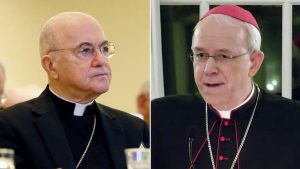 Papal critic Bishop Schneider warns that excommunicating Viganò will lead to further division
Papal critic Bishop Schneider warns that excommunicating Viganò will lead to further division
Extract from Claire Giangravé – Religion News Service, America, The Jesuit Review, 0240625
VATICAN CITY (RNS) — An outspoken critic of Pope Francis, the Auxiliary Bishop Athanasius Schneider of Astana, Kazakhstan, said that while Archbishop Carlo Maria Viganò’s public opposition of the pope “is irreverent and disrespectful,” the Vatican should think twice before excommunicating him. “I think the pope would be wise and prudent if he were to not excommunicate Archbishop Viganò,” Schneider told Religion News Service in an interview on Monday (June 24), adding that, “with this act, the Holy See will increase divisions even more.” The Vatican Department for the Doctrine of the Faith, formerly known as the Vatican’s Inquisition, summoned Viganò to trial on June 28 under charges of schism, which can incur the penalty of excommunication. Viganò wrote in a public statement that he has no intention of attending the “fake trial” and doubled down on his criticism of the pope and the Vatican. Schneider said Vatican officials should invite Viganò privately, and not in a judicial setting, to smooth over differences. “I lament that Archbishop Viganò uses disrespectful language,” he said, adding that “it’s not edifying or helpful to anyone.” Viganò, who was papal nuncio to the United States, rose to fame in 2018 when he published a lengthy letter accusing Pope Francis of covering up reports of sexual abuse of minors by the influential U.S. ex-cardinal Theodore McCarrick. In the letter he asked the pope to resign from his position…..(Source) Photo: Vigano-Schneider Web RNS America TJR 20240625
 Melbourne students ‘build bridges’ by contributing to online meeting with Pope
Melbourne students ‘build bridges’ by contributing to online meeting with Pope
Extract from Catholic Archdiocese of Melbourne, Melbourne Catholic and Carol Glatz (CNS) 25 June 2024
Surreal and ‘inspiring’ are two of the words Melbourne-based university students Louise Luu and Daniel Pertile use to describe their experiences of meeting online with Pope Francis and other Catholic students from around the Asia–Pacific on Thursday 20 June. The Holy Father hosted the video call as part of the fourth instalment of the Building Bridges Initiative, a unique forum that since 2022 has invited university students from large geographic regions to share honestly with each other and the Pope on issues affecting young people. During the call, students shared their concerns about a range of issues, including mental health, discrimination, and a desire for deeper faith formation and to be included more in Church life. The fourth event connected students from the Asia–Pacific region, including from Indonesia, South Korea, Japan, Australia, the Philippines and Taiwan, while previous events had facilitated encounters between Pope Francis and students from the Americas, Africa and South Asia. Organised by the Pontifical Commission for Latin America and Loyola University Chicago, the Building Bridges Initiative partnered with six universities in the Asia–Pacific region to support students on a month-long ‘synodal encounter’ leading up to a meeting with the Pope. Australian Catholic University (ACU) was selected to oversee the involvement of university students from across Australia, New Zealand and Papua New Guinea, but the Australian students who participated came from a broad range of universities….(Source) Photo: Pope and 12 youth video call 20240620, CAM, Screen shot Loyola University Chicago YouTube channel OR Pope and 12 Youth video chat 20240620 CAM
Kiwi student questions Pope on abortion
abortion
Extract from CathNews NZ, 24 June 2024
Abortion was one topic New Zealand student Seamus Lohrey quizzed the Pope on during an online forum last Thursday. He was one of 12 students from the Asia-Pacific region who shared young people’s concerns with the Pope during the online “Building Bridges” forum. Organised by Loyola University Chicago, the forum was designed to enable Pope Francis and young people to meet and discuss their concerns. New Zealand’s youth Lohrey represents a group he has been meeting with in New Zealand as part of the Building Bridges initiative. He told Francis his student group is concerned with the Church’s failure “in fully respecting and acting in accord with human dignity”. Because humans are created in God’s image and likeness, we should be treated as full and valued members of society, he said. The Church is inconsistent regarding human dignity, he said. Abortion example Lohrey told Francis his student group sees the Church offering insufficient dignity to the most vulnerable in our societies. “We expect people to meet our rules, which turns people away from a relationship with Christ and makes the Church unattractive,” he said. “For example those who procure abortion are some of the most spiritually, emotionally and physically vulnerable people in our societies, yet the Church responds with an automatic excommunication. “These people, desperately in need of unconditional love, must meet our requirements before we fully minister to them. This is a contradiction of the word unconditional. “So how can young people be the change we need?” he asked……(Source)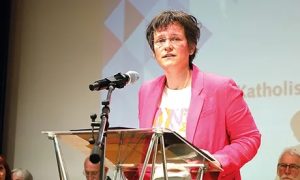
“No turning back” – women’s ordination to be discussed at Synod
Extract from CathNews NZ, Vatican News, 24 June 2024
According to a pastoral theologian, women’s ordination will be a significant topic at the upcoming Synod on Synodality and there will be “no turning back” on the issue. Klara-Antonia Csiszar, Professor of Pastoral Theology at the Catholic Private University of Linz, shared with Catholic media that while there will be no vote on ordaining female deacons, progress towards a more inclusive Church is underway. Patience, Csiszar noted, is necessary for these changes to unfold. Csiszar pointed out that the major theological challenge regarding women’s ordination revolves around the concept of “representatio Christi” – the representation of Christ in sacramental actions. Despite unresolved questions, Csiszar believes that separating deacons and deaconesses from the traditional three-tiered (Deacon – Priest – Bishop) ordained ministry could be a viable solution….(More). Photo: Klara-Antonia-Csiszaz, CathNews NZ, Vat News, 20240624
 Archbishop Viganó charged with schism by the Vatican, will face trial Extract from Gerard O’Connell America, The Jesuit Review, 20 June 2024 The Vatican’s Dicastery for the Doctrine of the Faith has formally charged Archbishop Carlo Maria Viganó, former nuncio to the United States, with schism and has opened a penal trial in this regard. If convicted, he would be excommunicated and could also be removed from the clerical state. The decision to open “an extrajudicial penal trial” against the archbishop was taken at a meeting of the senior officers of this same Vatican office on May 20, according to the decree that was leaked to the media, a copy of which America has seen. Archbishop Viganó also announced the news with a post on X. Although the text does not say so, the officials who took the decision would have been the prefect of the dicastery, Cardinal Victor Manuel Fernández, the secretary for the disciplinary section, Mgr. John Kennedy, the undersecretary of the same section, Monsignor Philippe Curbelié, and the promoter of justice, the Rev. Robert Joseph Geisinger, S.J. They decided for the normal administrative extrajudicial process, which covers the way the dicastery deals with about 90 percent of disciplinary cases. The decree says that it considered “superfluous” the prior investigation in accordance with Canon 1717 that states, “Whenever an ordinary has knowledge, which at least seems true, of a delict, he is carefully to inquire personally or through another suitable person about the facts, circumstances, and imputability, unless such an inquiry seems entirely superfluous.” This means that the evidence against him had already been collected by the dicastery and did not require fuller investigation. Much of it was already in the public domain. America has learned that the decision to proceed with the extrajudicial penal trial would have been approved by the pope, since the accused is a bishop. The decree said that on June 3, 2024, the dicastery “appointed the judge of the trial, the assessors, and the notary, officials of the dicastery.” The decree summoned Archbishop Viganó “to present himself” at the dicastery in the Vatican on June 20 (today) at 3:30 p.m. so that he “may take notice of the accusations and evidence concerning the crime of schism of which he has been accused.” It specifies that this crime involves “public statements which result in a denial of the elements necessary to maintain communion with the Catholic Church: denial of the legitimacy of Pope Francis, rupture of communion with Him, and rejection of the Second Vatican Council.”……….(Source). Photo:Abp Carlo Maria Vigano, then US apostolic nuncio, CNS, Eric Thayer, New York Times, America TJV 20240620.
Archbishop Viganó charged with schism by the Vatican, will face trial Extract from Gerard O’Connell America, The Jesuit Review, 20 June 2024 The Vatican’s Dicastery for the Doctrine of the Faith has formally charged Archbishop Carlo Maria Viganó, former nuncio to the United States, with schism and has opened a penal trial in this regard. If convicted, he would be excommunicated and could also be removed from the clerical state. The decision to open “an extrajudicial penal trial” against the archbishop was taken at a meeting of the senior officers of this same Vatican office on May 20, according to the decree that was leaked to the media, a copy of which America has seen. Archbishop Viganó also announced the news with a post on X. Although the text does not say so, the officials who took the decision would have been the prefect of the dicastery, Cardinal Victor Manuel Fernández, the secretary for the disciplinary section, Mgr. John Kennedy, the undersecretary of the same section, Monsignor Philippe Curbelié, and the promoter of justice, the Rev. Robert Joseph Geisinger, S.J. They decided for the normal administrative extrajudicial process, which covers the way the dicastery deals with about 90 percent of disciplinary cases. The decree says that it considered “superfluous” the prior investigation in accordance with Canon 1717 that states, “Whenever an ordinary has knowledge, which at least seems true, of a delict, he is carefully to inquire personally or through another suitable person about the facts, circumstances, and imputability, unless such an inquiry seems entirely superfluous.” This means that the evidence against him had already been collected by the dicastery and did not require fuller investigation. Much of it was already in the public domain. America has learned that the decision to proceed with the extrajudicial penal trial would have been approved by the pope, since the accused is a bishop. The decree said that on June 3, 2024, the dicastery “appointed the judge of the trial, the assessors, and the notary, officials of the dicastery.” The decree summoned Archbishop Viganó “to present himself” at the dicastery in the Vatican on June 20 (today) at 3:30 p.m. so that he “may take notice of the accusations and evidence concerning the crime of schism of which he has been accused.” It specifies that this crime involves “public statements which result in a denial of the elements necessary to maintain communion with the Catholic Church: denial of the legitimacy of Pope Francis, rupture of communion with Him, and rejection of the Second Vatican Council.”……….(Source). Photo:Abp Carlo Maria Vigano, then US apostolic nuncio, CNS, Eric Thayer, New York Times, America TJV 20240620.
 Hundreds take part in final Latin Mass at Melbourne’s St Patrick’s Cathedral
Hundreds take part in final Latin Mass at Melbourne’s St Patrick’s Cathedral
Extract from CathNews, Tess Livingstone The Australian, 20 June 2024 “We shall return,” a buoyant Fr Glen Tattersall said after the final traditional Latin Mass at St Patrick’s Cathedral in Melbourne last night. Source: The Australian. The cathedral was packed with a crowd of 850 people, every pew from the front the back and across the cathedral transepts were taken. They came in business suits, in strollers, on trams, and in fluoro tradie gear. Most were rugged up in heavy coats against the Melbourne winter, which did not dim the spirit of the cathedral lit with candlelight and optimism. Melbourne Archbishop Peter A Comensoli sat in the sanctuary, but did not address the congregation. Acting on an edict from the Vatican, Archbishop Comensoli has been forced to stop the popular Mass at the cathedral, which has been held weekly since 2011. Many of the people said they sometimes went to the new Mass in English, but preferred the traditional Mass for the greater transcendence it offered. In his sermon, Fr Tattersall recalled the words of the then-Bishop George Pell, who was the auxiliary bishop of Melbourne, when he celebrated the traditional Latin Mass in St Patrick’s in June 1992. “It was the first traditional Mass celebrated by a bishop in an Australian cathedral since 1970,” Fr Tattersall said. In that memorable sermon, he said, Bishop Pell acknowledged the widespread interest in the Mass. “Bishop Pell said: ‘This is a precious inheritance; it is not ours to improve or to prune. It is the source of faith and repentance, the source of everlasting renewal. To the extent that we depart from this central tradition of worship and conversion, that we damage or pollute this core, we are weakened and enfeebled’.”……..(Source). Photo: Final Latin Mass St Patrick’s Cathdral-Melbourne, Archdiocse of Melbourne, CathNews 20240620
 Parramatta youth leader only Aussie chosen to meet with Pope Francis at online synodal Building Bridges initiative
Parramatta youth leader only Aussie chosen to meet with Pope Francis at online synodal Building Bridges initiative
Faith formation and loneliness key issues for young people
Extract from Anita Sulentic, Catholic Outlook, 20 June 2024
Elizabeth beat out some stiff competition to be selected to represent Australia at a virtual meeting with Pope Francis tonight with 11 other university students from the Asia-Pacific region. “Everyone [that was chosen] was really good! It was stiff competition,” laughs Elizabeth, one of the 20 young Australian Catholics who were selected to be part of the Building Bridges Initiative – a synodal process to help Pope Francis understand the issues affecting young people. The group of 20 from around Australia met on several occasions to discuss what issues young people face across family life, social issues, peer issues and more. “Everyone’s input was really interesting, but we all agreed quite quickly on the main issues which are loneliness and a lack of faith formation. Coming from a big “very religious” Catholic family of 11, Elizabeth was surprised when she met other young Catholics at a youth group who felt lonely in their faith……..(Source) Photo: Elizabeth Fernandez Building Bridges Initiative with Pope Francis, Mary Brazell, Diocese of Parramatta, Cath Outlook 20240620
 Brisbane archdiocese offers sites to state government to help in housing crisis
Brisbane archdiocese offers sites to state government to help in housing crisis
Extract from Joe Higgins, The Catholic Leader, 17 June 2024
BRISBANE archdiocese and The Salvation Army are offering 15 sites immediately to the Queensland Government in a plan to ease housing stress across the state. The initial 15 sites could provide 500 dwellings in the first two years while the full extent of the plan could unlock up to 20,000 dwellings. The Coalition announced they had committed to the Yes in Faith’s Backyard plan, as part of a build-to-rent scheme if elected in October, while the Miles Government were yet to make a decision. Brisbane auxiliary Bishop Tim Norton said the Church welcomed any proposal that would assist and care for people experiencing homelessness. He said part of the mission of the Church was to provide for people who were living on the margins…..(Source). Image: Brisbane Archdiocese 20240617
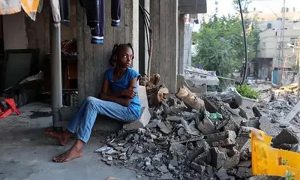 Record 120 million people forcibly displaced globally
Record 120 million people forcibly displaced globally
Extract from CathNews NZ, UCA News, 17 June 2024
The United Nations has reported a record-breaking 120 million people are currently living forcibly displaced by war, violence and persecution. Revealed by the United Nations High Commissioner for Refugees (UNHCR) on 13 June, this alarming figure underscores a growing global crisis. The UNHCR attributed the surge in displacement to ongoing conflicts in regions such as Gaza, Sudan, and Myanmar. The displaced population now mirrors the population size of Japan. “Conflict remains a very, very big driver of mass displacement” stated UN refugee chief Filippo Grandi. At the end of 2022, 117.3 million people were displaced, and this number grew to 120 million by April 2023. This marks a significant increase from 110 million the previous year, continuing a 12-year trend of rising displacement figures. Reflecting on his eight-year tenure, Grandi noted that the displacement numbers have more than doubled. He called it “a terrible indictment on the state of the world”…..(Source). Photo:forcibly displaced peeople_CathNews NZ 20240617
Diocese of San Diego to file for bankruptcy for the second time
Extract from By John Lavenburg, National Correspondent, Cruxnow, 17 June 2024
NEW YORK – With the Diocese of San Diego facing about 450 lawsuits over alleged sexual abuse of minors by priests, religious, and laity, Cardinal Robert McElroy has informed the clergy and faithful that today the diocese will file for bankruptcy for the second time. The announcement comes about 16 months after McElroy said the diocese was considering the move. “For the past year, the Diocese has held substantive and helpful negotiations with attorneys representing the victims of abuse, and I, in collaboration with the leadership of the Diocese, have come to the conclusion that this is the moment to enter formally into bankruptcy and continue negotiations as part of the bankruptcy process,” McElroy said in a June 13 letter. McElroy explained that bankruptcy offers the best pathway for the diocese to both justly compensate victims of sexual abuse, and to “continue the church’s mission of education, pastoral service and outreach to the poor and the marginalized.”
McElroy added that filing for bankruptcy provides a framework to achieve equity among the differing claims of victims, and also establishes a fund to compensate past victims of sexual abuse who come forward in the future. Further, McElroy said the move “will achieve a definite conclusion to its legal liability for past claims of sexual abuse” through the eventual bankruptcy settlement. Despite the challenges ahead for the diocese, McElroy made clear that only the church is to blame. “As we move through this difficult process during the coming year, it is essential that we all keep in mind that it was the moral failure of those who directly abused children and teenagers, and the equally great moral failure of those who reassigned them or were not vigilant, that led to the psychological and spiritual wounds that still crush the hearts and souls of so many men and women in our midst,” McElroy said………..(Source).
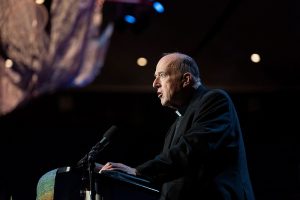 McElroy Speaks on Church culture war frontlines
McElroy Speaks on Church culture war frontlines
Extracts from Michael Sean Winters, NCR online, 13 June 2024
The bishops are still in executive session this morning, but one issue has become a perennial and central part of all of their discussions: synodality. Of all the initiatives Pope Francis has begun, and which the U.S. bishops’ conference has ignored, synodality is the one that can’t be shunted aside. Laudato Si’ was passed off to outside groups and Amoris Laetitia received no real attention from the bishops’ conference, but the body has been required to engage in the synodal process and it permeates almost every discussion. So, while we wait for the public session this afternoon, I thought I would discuss the keynote address Cardinal Robert McElroy delivered Monday at the Catholic Health Association meeting in San Diego on the theme “The Synodal Challenge for Catholic Health Care in the United States.”…………..The first question the cardinal articulated was how to “create and deepen analogical methods of discernment at all levels rooted in perceiving the presence of God, listening, truly listening, with profound respect to the voices of others, and [making] all feel included and respected.” He noted that the Catholic Health Association has a “head start” on this because its ministries were rooted in consecrated religious life, but that the regulatory and economic headwinds of the ambient culture meant that such discernment would require “tremendous effort, commitment and conversion.” It is easy to see how this insight applies to other ministries of the church too. His second question was exceedingly thorny: “How should the doctrinal tradition and history of the church shape the church’s ability to refine its teachings when confronted with a world where life itself is evolving in critical ways, and it is becoming clear that on some issues the understanding of human nature and moral reality upon which previous declarations of doctrine were made were in fact highly limited or time-bound?” This is a call for the renewal of moral theology, and the cardinal cited Pope Francis’ motu proprio “Ad Theologiam Promovendam” and its call to integrate a more inductive theological method, as pointing the way forward. McElroy noted that practitioners of health care must bring their insights and experiences to bear on this renewal of Catholic moral theology. The third question was how to “enflesh the pastoral stance of Jesus Christ,”……….(Source). Photo: Cardinal Robert McElroy on experience as delegate to Synod on Synodality October 2023, LA Religious Education Congress. OSV News/Courtesy of Archdiocese of LA Digital Team, NCR Online, 13 June 2024
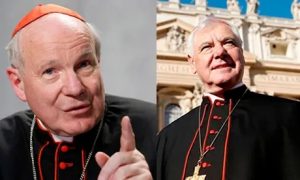 Two top cardinals – only men can be priests
Two top cardinals – only men can be priests
Extract from CathNews NZ, 13 June 2024
Two prominent cardinals have reaffirmed that only men can be ordained to the priesthood, aligning with Pope Francis’s recent statements. “Women cannot be called to this office” Cardinal Gerhard Ludwig Müller stated during an interview with Swiss portal kath.ch on 7 June. Müller, former prefect of the Congregation for the Doctrine of the Faith, explained that the exclusion of women from priestly ordination is rooted in the sacrament itself. He emphasised the theological belief that, while all people are fundamentally equal in their relationship with God, only men can embody the role of Christ within the Church. Just as “a man cannot become a mother and a woman cannot become a father”, it is only men who are called to the priesthood Müller said. “The vocation comes from God. One would have to complain to God himself that he created human beings as man and woman.” He also referenced the symbolic nature of the Church which is traditionally viewed as female, with Mary, the Mother of God, serving as its archetype. Thus, Müller asserted “Only a man can represent Christ in relation to the Church”. The Church “must not change this” Cardinal Christoph Schönborn, Archbishop of Vienna, echoed Müller’s sentiments……(Source). Photo: Cardinals-schonborn-and-muller, CathNews NZ 20240613
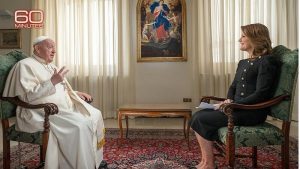 Women deacons: A closed book?
Women deacons: A closed book?
Extracts from Opinion Piece, Bill Uren, Eureka Street, 11 June 2024
An interview with Pope Francis was aired on the American television network CBS 60 Minutes on 20 May. Over the course of the interview, Norah O’Donnell asked the Pope whether there would ever be the prospect within the Catholic Church of a woman being ordained as a deacon in Holy Orders. The Pope’s reply was a blunt ‘No’. Pressed a little further by O’Donnell, the Pope elaborated. He had no problems recognising deaconesses as in the early Church, but women deacons in Holy Orders were definitely excluded. This negative response came as a surprise to many Vatican watchers. Firstly, because the Pope has been quite constructive in promoting women to positions of responsibility in the Church. Secondly, because he had commissioned two groups of experts to investigate the question of women deacons. The first was to explore the role of women as deacons/deaconesses in the history of the Church. The second was to review the theology of the diaconate as such. The first commission apparently came back with inconclusive results. The second met in September 2021 and July 2022, but the results of these discussions, too, have not been made public……………..One would be bold to dismiss the persuasiveness of these considerations or even the Pope’s sense of the untimeliness of such an intervention at present. What is surprising, however, is that the Pope has taken the unusual medium of a CBS 60 Minutes programme to express his negative judgment on women deacons. One would have expected such a judgment to be dignified by an Apostolic Letter, a Declaration or a Motu Proprio. But to do so on a television programme is at least highly unusual or even inappropriate. And to do so when a group of theologians has been specially commissioned between sessions of the Synod to investigate the issue further and to bring the results of their investigation to the second session of the Synod not only seems to be pre-empting their research but also acting in an authoritarian and distinctly unsynodal manner. There is no sign of deference to the deliberations of the Synod or to the possibility that new evidence or a new understanding of the existing evidence might render conclusive what has hitherto been interpreted as inconclusive. One waits expectantly to see how this ongoing discussion plays out at the Synod in October and how it clarifies (or obscures) the relation between the official teaching organs in the Church (including the papacy) and the emerging deliberations and decisions agreed upon by the members of the Synod. Is the Synod window-dressing or a genuine sharing of authority?….(Source). Photo:60 Minutes Pope Francis Eureka St 11 June 2024.jpeg
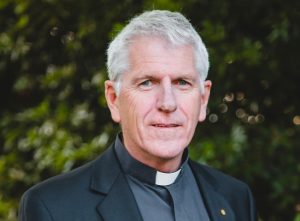 Melbourne Archdiocese Vicar General Fr Joe Caddy to become Bishop of Cairns
Melbourne Archdiocese Vicar General Fr Joe Caddy to become Bishop of Cairns
Extract from CathNews, ACBC Media Blog, 7 June 2024
Bishop-elect Caddy, 64, was born and raised in Melbourne and ordained to the priesthood in the Archdiocese of Melbourne in 1990. From 2002 to 2013 he served as part-time chaplain in the prison ministry team, providing the Sunday worship service and pastoral care to prisoners and their families in Melbourne’s men’s maximum-security prisons. He served as CEO of CatholicCare (Greater Melbourne, Geelong and Gippsland) from 2004 to 2017, during which time he advised the Victorian and federal governments, Australian Council of Social Service, and other bodies on a range of issues including homelessness, juvenile justice and local government. “The news of the appointment of Fr Joe Caddy as the next Bishop of Cairns will be greeted by the Catholic community in Cairns with great joy and a sense of expectation and renewed hope,” Australian Catholic Bishops Conference President Archbishop Timothy Costelloe SDB said. “Fr Joe brings to this new mission and ministry a wealth of experience and many gifts which he will now put at the service of the people of his new diocese. “He has, in recent years, served as Vicar General of the Archdiocese of Melbourne, and prior to this has been deeply involved in parish ministry and in the life and mission of the social outreach arm of the archdiocese. His many pastoral gifts will be deeply appreciated in Cairns.”…..(More). Photo: Fr Joe Caddy, ACBC
Abuse victim got $50,000 through redress scheme. He fought on, and settled for $500,000
Limited extract from Cameron Houston, The Age, 6 June 2024
A victim of historical sexual abuse at the former Bayswater Boys’ Home has reached a $500,000 settlement with the Salvation Army, after receiving just $50,000 under the National Redress Scheme. The case raises significant concerns about the capacity of the redress scheme to adequately compensate victims of historical abuse. Under the scheme, payments are capped at $150,000 and require recipients to waive their legal rights to sue the organisation involved…..(Source)
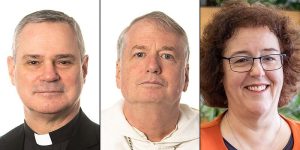 Church proposal seeks to address concerns with discrimination bill
Church proposal seeks to address concerns with discrimination bill
Extract from CathNews, Rosie Lewis, The Australian, 31 May 2024
Catholic Church leaders have put forward a proposal to the Albanese Government to address concerns about its draft religious discrimination laws, warning that as the legislation stands faith groups “would go a long way backwards”. Source: The Australian. The three-pronged proposal, obtained by The Australian, was sent to the Government and the Opposition earlier this month before major party negotiations on the draft laws broke down. The Coalition is demanding Labor address the extensive list of problems outlined by the Australian Catholic Bishops Conference before it considers its final position. Signed by Melbourne Archbishop Peter A Comensoli, Sydney Archbishop Anthony Fisher OP and National Catholic Education Commission executive director Jacinta Collins, the proposal allows for the removal of section 38 of the Sex Discrimination Act but says it should be replaced by more precise protections for religious schools and corporations. The Australian understands the Anglican Church has put forward a similar plan. “If the (Government’s) amendments to the SDA and the proposed Religious Discrimination Bill were enacted as currently drafted, there would be a very real and substantial reduction in existing legal and operational freedoms for religious education institutions,” the archbishops and Ms Collins state. “In essence, we would go a long way backwards. The current proposals would not provide sufficient legal and operational freedoms for religious educational institutions to maintain their religious ethos and fidelity to religious beliefs and practice.” The Catholic leaders set out a series of amendments to the SDA to ensure religious schools can “appropriately manage” student conduct where it’s necessary “to preserve the institutions’ religious ethos”. Opposition legal affairs spokeswoman Michaelia Cash urged the Government to act on feedback from faith groups, amid a stalemate between Labor and the Coalition on religious discrimination reforms. “ Mr Dreyfus’s spokesman said no Australian should be discriminated against because of who they are or what they believe….(Source). Photo:Archbishops Peter Comensoli and Anthony Fisher OP, and Jacinta Collins (ACBC/NCEC)
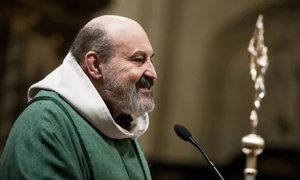 Halik: Catholic Church needs radical transformation
Halik: Catholic Church needs radical transformation
Extract from CathNews NZ, Katholisch, Vatican News, 30 March 2024
Renowned religious philosopher Msgr Tomas Halik has urged the Catholic Church to undergo a radical transformation. In an interview with Austrian newspaper “Kleine Zeitung” Halik emphasised the need for the Church to move away from a perceived attitude of arrogance and exclusivity. “The Church must shed the pride and arrogance of those who possess the whole truth” Halik stated. He advocated for a shift towards a more open and receptive approach. “We must be a listening church, not only a teaching church but above all a learning church” said Halik. Msgr Halik believes a move towards inclusivity should accompany what would be a radical transformation. He envisions the Church becoming “a house for all”, fostering dialogue within Christianity (ecumenism) and across religious and cultural boundaries. According to Halik, this vision necessitates a heightened awareness of the Church’s ecological responsibility for the planet. “It is necessary to find a way out of the structure of its closed confessional clerical system towards universality in the sense of a deeper and broader ecumenism” said the religious sociologist. Renewed hope. The philosopher acknowledged attempts at reform in the past, citing the Second Vatican Council (1962-1965) as a step in the right direction. However he believed these efforts yielded “only partial results”. Halik said he finds renewed hope in the ongoing synodal process initiated by Pope Francis, which aims to increase collaboration and dialogue within the Church. According to Halik, the future will bring many different forms of Christianity. However, this presupposes the development of a culture of respect and mutual recognition. Halik argued for liberation from “the zeal and fanaticism of revolutionaries and inquisitors” who seek to achieve an ideal state by their own means. He also urged freedom from the temptation to be satisfied with the current state of the Church and religious knowledge. “Theology must not become an ideology. In our theology there must always be room for mystery, for further seeking, questioning and silent adoration” concluded Halik…..(Source). Photo:Fr Thomas Halik
 Painful times for Church reformers
Painful times for Church reformers
Extract from John Warhurst, Eureka Street, 29 May 2024
Two recent events frame the many discussions within the church reform movement, while many of its constituent groups continue to engage with the international Synod on Synodality. Pope Francis suddenly announced in a major interview with an American television network that ordaining women deacons, a long-held aspiration of the movement for women’s equality in the church, would never happen. For many reformers this was the final straw, dashing any remaining hopes for concrete action on what was still supposed to be a ‘live issue’, though sidelined to a Synod study group. Remarkably though, some like the irrepressible campaigner Phyllis Zagano, are still optimistic that long-term reform, years beyond the current Synod, might still be possible. About the same time the official Australian Catholic Mass Attendance Report 2021 reflected once again the local church’s abysmal state. Its decline, one factor in generating calls for reform, has continued unabated. Frequently reported under the headline ‘the church is now online and multicultural’, this report showed that regular church attendance, admittedly in the COVID era, had plunged again since 2016, from a dismal 11.8 per cent to just 8.2 per cent of Catholics (itself now only 20 per cent of the Australian population). The attendance figure, a good measure of identification and belonging, for male Catholics is now below 8 per cent, while women are higher. In one diocese, Maitland-Newcastle, the overall figure is less than 4 per cent. The attendance figures also highlight the increasing diversity of the Catholic community, with 13 per cent of Catholics attending Mass in a language other than English. The attendance figures for Eastern Rite Catholics are sky-high and, in some cases, rising. My reflections follow involvement in a local meeting in late April and an international meeting of Catholic Church Reform International (CCRI) in early May, which discussed its draft submission to the Synod. In both cases the resilience of church reformers continues to amaze me. The Australasian Catholic Coalition for Church Reform maintains its long-running series of excellent Zoom speakers. But inevitably the level of trust and optimism is slowly fading away. Even the official report on the Australian submissions to the second assembly of the Synod in October was open about the consultation fatigue within the church. This is in marked contrast to the situation that existed in 2017. The Royal Commission into Institutional Responses to Child Sexual Abuse had just concluded its enquiries as had the church’s own Truth Justice and Healing Commission. Many Catholics, sensing the crisis, were keen to hold the church authorities to account. Later that year the Plenary Council began to take shape and extensive community consultations followed. There was widespread engagement through several hundred thousand participants and 17,500 submissions. A significant minority of Catholics possessed enthusiasm for reform and, more importantly, still trusted that their voices would be listened to by bishops. That is no longer the case seven years later. We Australian Catholic reformers are tired and, in some cases battered and bruised, from engagement with the church. We are also older. Most of us have lost hope that reform will occur in our lifetime……..(Source) Photo: Man sitting in church, Stefan Kunze_Unsplash, Eureka Street 20240529
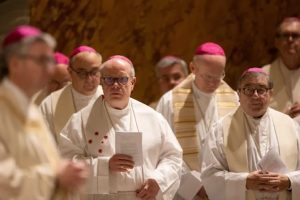 Reform vital if Church is to survive, says German synod response
Reform vital if Church is to survive, says German synod response
Limited Extract from Renardo Schlegelmilc, The Tablet, 29 May 2024
The German bishops’ conference’s summary of responses to the Synod on Synodality reported that “96 per cent of Catholics in Germany believe that the Church must change fundamentally if it is to have a future”. The document was published on 22 May, as part of the consultation ahead of the second session of the Synod in Rome in October. Although it repeated several of the calls for far-reaching reform made by the Synodal Path initiative – which have put the German Church at odds with the Vatican – the document advanced them in a less confrontational tone, with gender equality and lay participation central to its calls. German Catholics felt a “desire for the sacramental diaconate to be opened up to women” and for discussions of women’s ordination to the priesthood, it said. “Gender equality is long overdue and women should not be [excluded] any longer.” The responses also called for greater independence for local churches, arguing that not every decision need be made on a universal level. “Without crossing the ‘red line’…there has to be a corridor where the local churches may be active and develop themselves,” according to the Diocese of Eichstätt’s consultation. The bishops‘ summary did not draw further conclusions from the responses, although they echoed documents from the Synodal Path which led to the call from its assembly in March 2023 for a “Synodal Council”, a new national decision-making body where laypeople and bishops would have the same rights and voting privileges…..(Source). Photo: German bishops Vatican clash over some proposals from Synodal Path initiative, Daniel Ibanez, CNA
Pope apologizes after being quoted using vulgar term about gay men in talk about ban on gay priests
Pope Francis has apologized after he was quoted using a vulgar term about gay men to reaffirm the Catholic Church’s ban on gay priests
Extract from Nicole Winfield, The Washington Post, AP, 28 May 2024
VATICAN CITY — Pope Francis apologized Tuesday after he was quoted using a vulgar term about gay men to reaffirm the Catholic Church’s ban on gay priests. Vatican spokesman Matteo Bruni issued a statement acknowledging the media storm that erupted about Francis’ comments, which were delivered behind closed doors to Italian bishops on May 20. Italian media on Monday had quoted unnamed Italian bishops in reporting that Francis jokingly used the term “faggotness” while speaking in Italian during the encounter. He had used the term in reaffirming the Vatican’s ban on allowing gay men to enter seminaries and be ordained priests. Bruni said Francis was aware of the reports and recalled that the Argentine pope, who has made outreach to LGBTQ+ Catholics a hallmark of his papacy, has long insisted there was “room for everyone” in the Catholic Church. “The pope never intended to offend or express himself in homophobic terms, and he extends his apologies to those who were offended by the use of a term that was reported by others,” Bruni said. Francis was addressing an assembly of the Italian bishops conference, which recently approved a new document outlining training for Italian seminarians. The document, which hasn’t been published pending review by the Holy See, reportedly sought to open some wiggle room in the Vatican’s absolute ban on gay priests…..(Source)
 Time to learn lessons of Voice referendum failure:
Time to learn lessons of Voice referendum failure:
Extract from Fr Frank Brennan, CathNews 20240528
Extracts from Frank Brennan’s Lessons from our Failure to Build a Constitutional Bridge in the 2023 Referendum (Connor Court Publishing, 2024), published this week. The Voice to Parliament referendum result was a disaster for the country and a tragedy for First Australians. It’s time to confront what went wrong before we all start forgetting what really went on, writes Fr Frank Brennan SJ. Source: The Australian. A week after the 40:60 loss, the key Indigenous leaders who had dealt with the Albanese Government during the campaign broke their silence and issued a powerful statement saying: “Aboriginal and Torres Strait Islander peoples are in shock and are grieving the result. We feel acutely the repudiation of our peoples and the rejection of our efforts to pursue reconciliation in good faith. “That people who came to our country in only the last 235 years would reject the recognition of this continent’s First Peoples – on our sacred land which we have cared for and nurtured for more than 65,000 years – is so appalling and mean-spirited as to be utterly unbelievable a week following. “It will remain unbelievable and appalling for decades to come.” There has been little appetite for public discussion about lessons to be learnt from this abject failure. Some of the key proponents saw nothing wrong with the process and the wording of the proposed change. They think racism played a key part in the result. For example, the key Indigenous leaders claimed, “It is clear no reform of the Constitution that includes our peoples will ever succeed. This is the bitter lesson from 14 October.” If they’re right, there will be no point in attempting again constitutional recognition of First Australians. But they may be wrong – and I hope they are. There may be a prospect of future constitutional change but not with the process that was adopted and not with the wording that was proposed in 2023. It’s time to begin the conversation about past mistakes, before we all start forgetting what went on…..(MORE) Image: Yes_No_Referendum ABC News Danielle Monica
Archdiocese of Melbourne releases latest Synod Consultation Report and ACBC Australian Summary
Extract from Catholic Archdiocese of Melbourne, first published 20240521, 28 May 2025
The Archdiocese of Melbourne has released the Consultation Report that it submitted to the Australian Catholic Bishops Conference (ACBC) in preparation for the second stage of the 16th General Assembly of the Synod of Bishops, often referred to as the ‘Synod on Synodality’……..The Consultation Report and the subsequent ACBC Australian Summary can be accessed HERE
Wifedom and the casual patriarchy
Retrospective Extracts from Bill Uren 26 September 2023, Eureka Street, 26 May 2024
Anna Funder’s recent book, Wifedom, is a sustained indictment of patriarchy both in particular and in general. Firstly, and very specifically in particular, it is a searing indictment of George Orwell’s treatment of his wife, Eileen O’Shaughnessy, during the nine years of their marriage……….Patriarchy masquerades in many forms in the Catholic profile, and one of the items high on the agenda of the upcoming Synod on Synodality in Rome in October is the place of women in the Church. Hierarchical male governance, clericalism, celibacy, non-inclusive liturgical language, the reservation of priesthood exclusively to males, sexuality and reproduction matters generally, all consideration of these is impregnated with patriarchy. Even Pope Francis himself, who has been quite innovative in creating opportunities for women in the Church, speaks more often of the ‘complementarity’ of men and women than of their ‘equality’. It will require a massive re-thinking if these agenda items are to be honestly addressed in the Synod. Casual patriarchy is not confined to many male/female partnerships. Modern parables like Barbie serve as a reminder for its presence endemic in our society. Perhaps the participants in the Roman Synod could profit in the three-day retreat that precedes the Synod from a reading of Wifedom and a showing of Barbie……(More). Image:Wifedom and casual patriarchy, Uren, Eureka St 20230926
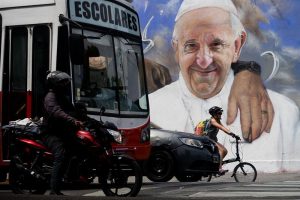 The myth of progressive Catholicism
The myth of progressive Catholicism
Extract from Finn McRedmond, New Statesman. 21 May 2025
When Pope Francis emerged on the balcony over St Peter’s Basilica for the first time in 2013,
it was a symbolic victory for the liberal wing of a beleaguered church. The newly elected Holy Father would tidy up the scandal-ridden mess left in Benedict XVI’s wake and drag the
papacy into the 21st century. In the decade since, Francis’s efforts have demarcated him from his far more staid predecessors: he has denounced laws that criminalise homosexuality; in 2015 he struck a revolutionary tone when he suggested forgiveness could be granted to women who had abortions; early in his tenure he declared that, yes, even atheists could go to heaven. The great Catholic reformer was in lockstep with the trajectory of the decade. In spite of the retreats made by the election of Donald Trump and the Brexit referendum (2016 was the annus horribilis for the liberal disposition) it seemed the progressive march forward was inevitable: gay marriage and abortion were legalised in Ireland by popular vote; the Women’s March and Me Too movement fought back against base misogyny; there was the great racial
reckoning of America’s Black Lives Matter summer. This was the ambient temperature of the 2010s and early 2020s. An era when even the Pope was woke……….Not even the will of God can keep the culture wars out of the Vatican. On one side, the traditionalists – with Cardinal Raymond Burke as their spiritual leader – fear Francis is eroding the doctrine; disrespecting the strictures of the faith; and relentlessly pursuing a political agenda moonlighting as a divine one. Francis, meanwhile, in a 60 Minutes interview on 19 May, said his conservative detractors have a “suicidal attitude”; that they are locking themselves in a “dogmatic box”. Perhaps the liberal reformation will not die with him. But as the Holy See is tugged between these two poles, it begins to look like a microcosm, mimicking trends general to the Anglosphere: a decade of supremacy for woke ideology accompanied by the inevitable conservative backlash….(more). Image:Catholicism Myth Finn McRedman, Getty, New Statesman, 20250521
Francis promotes women’s leadership in major CBS interview
Extract from Rocco Palmo, The Tablet, CBS News Adam Verdugo 16 May 2024 Norah O’Donnell speaks to Pope Francis in the Domus Sanctae Marthae. In the first-ever extended papal interview with an English-language broadcaster, Pope Francis reiterated his embrace of women’s leadership in the Church. He said that “the ones who never abandoned Jesus were the women” while “the men all fled”. Filmed last month at his residence in the Vatican guesthouse, the Pope’s hour-long conversation with Norah O’Donnell will air on CBS over Sunday and Monday evenings in prime-time slots. Brief excerpts from the programme were released ahead of its debut, including one where Francis branded climate sceptics “foolish” and saying that “they don’t believe” in the reality of climate change “because they don’t understand the situation or because of their [political] interest”. The interview has been framed to promote the Church’s first World Children’s Day, which the Pope will lead next weekend in Rome. It is understood that O’Donnell’s pitch for the papal interview, which generations of US network executives and presenters have sought, was accepted because she is the only woman to anchor one of the three national newscasts. She is a mother of three and a graduate of Georgetown University, the Jesuit university in Washington, DC. Speaking to The Tablet, O’Donnell hinted that the Pope addressed “gay rights” and the Holy See’s recent exhortation against surrogacy in the interview, among other topics. “I think people will be inspired and surprised by some of the things he told us,” she said. Francis’ appearance comes amid a slight drop in his approval rating among US Catholics. An April survey by Pew Research saw the pontiff’s favourable number on 75 per cent, down from 83 per cent in late 2021. However, the new figure remains above his all-time low of 72 per cent in late 2018, when a fresh storm of sex-abuse revelations shook the national church. By contrast, the Pope’s approval remains almost as large as the combined positive figures for both President Joe Biden and former president Donald Trump. Though Francis has defended the male-only priesthood, his pontificate has seen a significant number of women given major responsibilities in the Roman Curia, both in executive roles and in the critical dicastery memberships which determine policy across the Church…….(More)
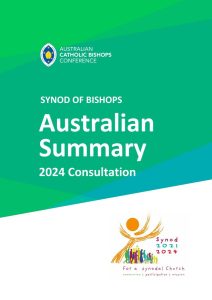 Catholics contribute ideas ahead of Rome assembly
Catholics contribute ideas ahead of Rome assembly
From Australian Catholic Bishops Conference Media Blog, 15 May 2023
Australia’s Catholics have provided a wealth of ideas on how to improve the way the Church listens to the faithful and promotes its message in the community. From February to April, hundreds of Catholics contributed their thoughts to the Australian Summary, an eight-page document which has been sent to the Vatican ahead of the October Assembly of the Synod of Bishops. The National Centre for Pastoral Research ran the consultation process which occurred at a local (diocese) and national level. Twenty-five dioceses and three Eastern Catholic Church eparchies submitted summaries of their consultation outcomes, while a further 13 organisations submitted summaries from the national consultation – culminating in the final report. National Centre for Pastoral Research director Dr Trudy Dantis said those who took part in the process had appreciated the opportunity to listen to differing opinions in a deep and respectful way, as well as contribute ideas about how to become a synodal Church in mission. “One thing that was acknowledged widely was the changing nature of the Catholic Church in Australia through migration and differing patterns of engagement,” Dr Dantis said. “There were many comments on finding ways to encourage the involvement of all cultural groups in the mission of the Church, improve the awareness and enactment of co-responsibility and overcome barriers by deeper listening.” Social media, liturgy and faith, reaching out to families and young people, Aboriginal and Torres Strait Islander ministry, the equal dignity of women and men, working with other churches and encouraging the use of peoples’ unique gifts were themes emerging from the consultations. “I greatly appreciate the way Australian Catholics have engaged in the process of discerning, in a synodal way, how they might best live the Gospel in their different communities and contexts,” said Australian Catholic Bishops Conference President, Archbishop Timothy Costelloe. “This material will now be considered as we develop the Instrumentum Laboris for the second assembly of the synod and prayerfully consider the pathways in which the Holy Spirit is inviting us to walk.” The document, and others like it provided by other nations, will provide the basis for talks in Rome in October. Fifteen Australian participants – including bishops, priests and lay people – will attend the second assembly from October 2-27, 2024. The full document can be found HERE………………(Source)
 A remaining question – concerning the falling number of priests
A remaining question – concerning the falling number of priests
Extract from CathNews NZ, 9 May 2024
An issue that refuses to hide its face is the continuing fall in the number of priests serving our parishes.
We should be considering this question as a matter of some urgency if we are to maintain our present diocesan structures at anywhere near their present level, let alone seek to become a Missionary Church. Factors behind the problem A number of factors might be considered that have given rise to our present predicament. The age profile of serving priests continues to rise. Parishes with more than one priest are rare so the return alone to an empty house is uninviting. Above all, the question of a compulsorily celibate clergy remains with us. How often do our bishops face the unenviable task of replacing a priest who through age or infirmity can no longer continue with his duties? Or a younger man who has fallen in love and is unable to sustain his vocation? Options A contributor to the working document for the Vatican’s Synod of Bishops on the Amazon region made his case for the priestly ordination of married men in the region. “I’m saying this with great sincerity – there is no other option,” Bishop Erwin Kräutler, the retired head of the Xingu prelature in Amazonian Brazil, said recently. The availability of the Eucharist is of far greater importance than the marital status of the priest. What is the bishop to do? Amalgamate parishes is one option but this often only serves to double the load of an already aged priest or leave the parishioners to fend for themselves with the occasional help from priests in surrounding parishes? Harriet Sherwood writing recently in the Guardian reported on the challenge by Archbishop Scicluna to the present discipline. “Archbishop Charles Scicluna, Malta said ‘If it were up to me, I would revise the requirement that priests have to be celibate. Experience has shown me that this is something we need to seriously think about.’ “The church had lost many great priests because they chose marriage.
“There was a place for celibacy but the church also had to take into consideration that priests sometimes fall in love, and were forced to choose between that and their vocation”, he said in an interview with the Times of Malta. One man, two vocations is perfectly possible if everyone concerned is aware of what is involved.
Movement for Married Clergy……….(More). Photo:married priests, CathNewsNZ
 Catholicism must reject ‘heresy of triumphalism,’ says noted Czech priest
Catholicism must reject ‘heresy of triumphalism,’ says noted Czech priest
Extract from Christopher White, Vatican Correspondent National Catholic Reporter, 8 May 2024
Catholicism must rid itself of the “heresy of triumphalism” if it is to become more synodal and better able to evangelize in a secular age, according to noted Czech theologian and philosopher Fr. Tomas Halik. “We see ourselves as a societes perfecta,” or a perfect society, that is too self-sufficient, said Halik, who was recently tapped by the Vatican’s synod office to help lead an April 29-May 2 gathering for some 200 parish priests from all over the world. The gathering was organized in response to concerns that Pope Francis’ synod on synodality included only a few parish priests among the more than 400 delegates that participated in the first session of the assembly in October 2023. During a May 2 interview with National Catholic Reporter, Halik praised Francis’ synodal efforts and his commitment to root out a culture of clericalism, where priests see themselves as more powerful than the laity. But, he said, he would also point to “ecclesial triumphalism,” which he said is a prideful, widespread attitude defined by a Catholicism that is closed off from the world around it. In an address to the parish priests in attendance at the synodal gathering, Halik lamented that “some Christians, alarmed by the rapid changes of the world, want to make the church an island of unchanging certainties.” “There are still places where the parish priest sees himself as the pope of his parish. But the church confers the gift of infallibility on only one of its members, and then only under strictly limited conditions,” he continued. “And if even a pope relies on several consultative councils to help him make his decisions, how much more should a parish priest listen to those he has been sent to serve?” ‘There are still places where the parish priest sees himself as the pope of his parish. But the church confers the gift of infallibility on only one of its members, and then only under strictly limited conditions.’ Halik told NCR that he was encouraged by the open and frank discussions that took place during the four-day gathering, but he said that it is evident that the journey to become a more synodal church is a “multispeed” endeavor. “Some countries are very well prepared for radical reforms and others are not,” he said. “It depends on the culture.” While he said that there were candid conversations about a range of issues, including LGBTQ inclusion, married priests and other ministries, Halik also acknowledged that there are “differences between continents, but also inside countries.” Part of the solution to resolving these tensions, he believes, is greater decentralization in the church and both spiritual and structural reforms. And reform, according to Halik, is nothing to be feared.……..(More). Photo:Fr Tomas Halik_Renewing the Church in a Secular Age conference_Pontifical Gregorian University2015, CNS Paul Haring. NCR
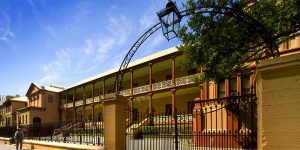 NSW Parliament to consider bill on stay applications in abuse cases
NSW Parliament to consider bill on stay applications in abuse cases
Extract from CathNews, 9 May 2024
New South Wales Parliament will consider a bill to further restrict churches and other institutions from using stay applications to prevent abuse survivors having their cases heard. Source: The Guardian. Stay applications have been used to permanently halt civil cases brought by survivors where perpetrators had died. The Catholic Church and other institutions effectively used the passage of time to block survivors from having their cases heard by arguing a fair trial was no longer possible. The High Court delivered a significant blow to the use of stays in November, finding they must only be allowed in rare and exceptional circumstances or risk bringing “the administration of justice into disrepute”. Legalise Cannabis Party MLC Jeremy Buckingham is preparing to introduce a bill to state parliament to enshrine the High Court findings into statute law and remove any uncertainty around the way stay applications can be used. It introduces changes that would limit the ability for a defendant to argue for a permanent stay simply because of the passage of time. The bill would also allow survivors who had a stay granted against them since 2016 the ability to have their cases reconsidered. The NSW Government has previously indicated support for amending the law to enshrine the High Court’s findings. A spokesperson for NSW Attorney-General Michael Daley said the Government had not yet seen Mr Buckingham’s bill and had not been able to consider its contents…..(Source). Photo: Jeremy Buckingham MP bill to NSW Parliament, Facebook, Parliament. NSW
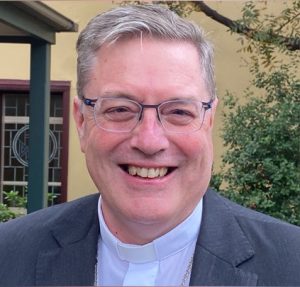 Australian Catholic Bishops Conference elects new vice president
Australian Catholic Bishops Conference elects new vice president
Extract from CathNews, ACBC Media Blog, 6 May 2024
The Australian Catholic Bishops Conference has a new vice president after elections in Sydney. Sale Bishop Greg Bennet will take on the role after Sydney Archbishop Anthony Fisher OP retired from the position at the end of the maximum three, two-year terms. The Conference acknowledged Archbishop Fisher’s service and leadership. Perth Archbishop Timothy Costelloe SDB was re-elected president of the ACBC. “I am pleased to have the opportunity to be vice president to Archbishop Costelloe whose leadership within conference and broadly across the Church has been so clearly reaffirmed by his re-election,” Bishop Bennet said. “I am humbled by my brother bishops who have elected me to this position of service to the Conference. “And, while I am surprised, I will commit myself to the support of the important work of administration and pastoral mission supported by the conference and our various partners across the dioceses and agencies of the Church throughout Australia.” Bishop Bennet was ordained bishop in December 2020 and appointed by Pope Francis to the Dicastery for the Clergy in March 2023. He has a Master of Science degree from Loyola College University in Baltimore (US), undertook licentiate studies in Rome and completed a theology degree at the Melbourne College of Divinity. Bishop Bennet chairs the national Bishops Commission for Professional Standards and Safeguarding. The election was held on the first day of the May plenary of all Catholic bishops of Australia on Friday…….(Source) Photo: Bishop Greg Bennet, ACBC
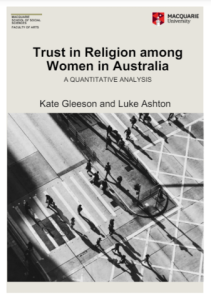 Trust in religion among women in Australia: a quantitative analysis
Trust in religion among women in Australia: a quantitative analysis
Extract from from Kate Gleeson,Luke Ashton, Macquary University, 6 May 2024
Multiple sources of international and national data indicate that organised religion is facing a crisis of trust. Child sexual abuse scandals and the treatment of LGBTIQ+ people within religious teachings have been identified as having strong impacts on people’s willingness to trust in religion internationally. Australia is a relative anomaly in that women are significantly more likely than men to express distrust in religion. This report presents the first dedicated study to identify the impacts of religious child abuse scandals in Australia and examine related demographic and attitudinal factors contributing to women’s low trust, and what this means for their perspectives on the role of religious organisations in Australia’s economy and society…..(Source)
Church could not go on without you, Pope tells parish priests
Extract from CathNews, Vatican Media CNA, 3 May 2024 Pope Francis published a letter yesterday addressed to all parish priests in the world with his advice for building a missionary Church in which all the baptised share in the mission of proclaiming the Gospel. “Parish communities increasingly need to become places from which the baptized set out as missionary disciples and to which they return, full of joy, in order to share the wonders worked by the Lord through their witness,” Pope Francis wrote in the letter. The Pope presented the letter to 300 priests participating in the Synod on Synodality’s “World Meeting of Parish Priests” during an audience at the Vatican, saying that their meeting is “an opportunity to remember in my prayers all of the parish priests in the world to whom I address these words with great affection”. “Before all else, I would like to express my gratitude and appreciation for the generous work that you do each day, sowing seeds of the Gospel in every kind of soil,” Pope Francis wrote. “It is so obvious as to sound almost banal, but that does not make it less true: the Church could not go on without your dedication and your pastoral service,” he added. In the letter, Pope Francis offered three suggestions to parish priests for building “a synodal and missionary Church.” The first is for priests to live out their “specific ministerial charism in ever greater service to the varied gifts that the Spirit sows in the people of God.” The second suggestion is to “learn to practice the art of communal discernment” by using the “conversation in the Spirit” practised during last October’s Synod on Synodality assembly. Lastly, Pope Francis encouraged priests to base everything they do “in a spirit of sharing and fraternity” both among themselves and with their bishops. The audience with the Pope concluded the four-day meeting, which began on at the Fraterna Domus retreat house in Sacrofano, Italy, just north of Rome…...(Source). Photo:Pope francis signing, Vatican Media
Pope Francis published a letter yesterday addressed to all parish priests in the world with his advice for building a missionary Church in which all the baptised share in the mission of proclaiming the Gospel. “Parish communities increasingly need to become places from which the baptized set out as missionary disciples and to which they return, full of joy, in order to share the wonders worked by the Lord through their witness,” Pope Francis wrote in the letter. The Pope presented the letter to 300 priests participating in the Synod on Synodality’s “World Meeting of Parish Priests” during an audience at the Vatican, saying that their meeting is “an opportunity to remember in my prayers all of the parish priests in the world to whom I address these words with great affection”. “Before all else, I would like to express my gratitude and appreciation for the generous work that you do each day, sowing seeds of the Gospel in every kind of soil,” Pope Francis wrote. “It is so obvious as to sound almost banal, but that does not make it less true: the Church could not go on without your dedication and your pastoral service,” he added. In the letter, Pope Francis offered three suggestions to parish priests for building “a synodal and missionary Church.” The first is for priests to live out their “specific ministerial charism in ever greater service to the varied gifts that the Spirit sows in the people of God.” The second suggestion is to “learn to practice the art of communal discernment” by using the “conversation in the Spirit” practised during last October’s Synod on Synodality assembly. Lastly, Pope Francis encouraged priests to base everything they do “in a spirit of sharing and fraternity” both among themselves and with their bishops. The audience with the Pope concluded the four-day meeting, which began on at the Fraterna Domus retreat house in Sacrofano, Italy, just north of Rome…...(Source). Photo:Pope francis signing, Vatican Media
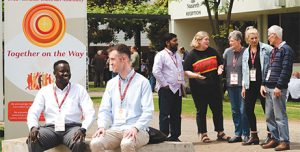 Adelaide assembly to focus on synodality and discernment
Adelaide assembly to focus on synodality and discernment
Extract from CathNews,The Southern Cross, 1 May 2024
Adelaide Archdiocese has announced its 2024 Diocesan Assembly will be held in June, with a focus on synodality and discernment. Source: The Southern Cross. The event will be held in Adelaide on June 14 and 15 at the Vietnamese Catholic Community in Pooraka. The assembly will bring together invited representatives from across the Archdiocese. The two days will be dedicated to attendees deepening their understanding and practice of synodality through shared discernment. They will be asked to discern the realities facing the local Church and its people and to develop strategies to achieve its mission. This year’s gathering will build on the work of the 2021 and 2022 Diocesan Assemblies, the recent Regional Assemblies, as well as the Plenary Council, the global Synod on Synodality and Conversations in the Spirit, a methodology for discernment in the form of a round-table listening and sharing experience. “This assembly will engage participants in discernment of strategies to address key issues facing the Archdiocese,” the archdiocese’s pastoral life and mission assisted director, Peter Bierer, said. “What we have learned through the consultations and experiences of assemblies and the Plenary Council and Synod is that we must continually listen to those whom the decisions affect. “Discernment, action and reflection are a continuous cycle inviting us into greater communion, participation and mission. The assembly helps all of us to listen deeply to the Holy Spirit through and with one another.”……..(Source). Photo: Synod – Participants in 2022 Adelaide-Diocesan-Assembly, Southern Cross, Nat Rogers
 Pope asks Catholics to prepare for Synod’s ‘prophetic’ stage
Pope asks Catholics to prepare for Synod’s ‘prophetic’ stage
Extract from CathNews, CNS, 29 April 2024
The most important outcome of the current Synod of Bishops on Synodality, Pope Francis says, is the synodal process itself and not the hot-button topics discussed. With the second Synod assembly scheduled for October, the Pope said the Synod process is approaching its “most challenging and important” stage – the point at which it must become “prophetic”. “Now it is a matter of translating the work of the previous stages into choices that will give impetus and new life to the mission of the Church in our time,” he told members of the Italian Catholic Action lay association in a packed St Peter’s Square on April 25. But he noted that “the most important thing of this Synod is synodality, the subjects and topics (discussed) are there to advance this expression of the Church that is synodality.” “For this, there is a need for people forged in the Spirit, for ‘pilgrims of hope,’ “ Francis said, “men and women capable of charting and walking new and challenging paths.” In March, Francis decided that some of the most controversial issues raised at the first Synod assembly “requiring in-depth study” will be examined by study groups; the groups are to issue preliminary reports to the Synod assembly in October and give their final reports to the Pope by June 2025. The 10 themes to be explored by the study groups include the guidelines for priestly formation, the role of women in the Church and their participation in community leadership, listening to the poor and the criteria for selecting bishops. While some questions require deeper study, Francis told the crowd to “be athletes and standard bearers of synodality in the dioceses and parishes of which you are part, for a full implementation of the (synodal) path taken so far.”…..(More).
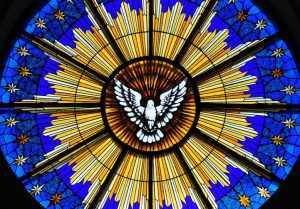 Cardinal Cupich: 3 ways the synod’s ‘conversations in the Spirit’ can revolutionize the church
Cardinal Cupich: 3 ways the synod’s ‘conversations in the Spirit’ can revolutionize the church
Extract from Blase j Cupich, America the Jesuit Review, 24 April 2024
Before the month-long meeting of the Synod on Synodality last October in Rome, delegates were invited to a pre-synod retreat led by Timothy Radcliffe, O.P. Part of the purpose of the retreat was to prepare us to participate in “a conversation in the Spirit,” to use Pope Francis’ definition of the synodal process. I consider this reframing of synodality to be nothing short of revolutionary. Father Radcliffe’s reflections convinced me that the pope’s reframing of the scope and meaning of synods will also have staying power because this reframing opens up a new “model for the church,” to use a term coined by the late Cardinal Avery Dulles, S.J., 50 years ago. What was so revolutionary? Prior to the present Synod on Synodality, there have been 15 General Synods in the history of the church, dealing with a range of topics, such as evangelization, priestly formation, the Eucharist and the sacrament of penance. These have been organized in accord with what we read in canon 342 of the 1983 Code of Canon Law:
“The synod of bishops is a group of bishops who have been chosen from different regions of the world and meet at fixed times to foster closer unity between the Roman Pontiff and bishops, to assist the Roman Pontiff with their counsel in the preservation and growth of faith and morals and in the observance and strengthening of ecclesiastical discipline, and to consider questions pertaining to the activity of the Church in the world.”
Bishops and, at some of the more recent synods, priests and laypeople who were present gathered in small discussion groups, the results of which were reported to the full body. Participants also were allowed three to four minutes to speak in the general sessions, but rarely did the interventions flow thematically from one to another. There was little open discussion or debate. In fact, I was told by a seasoned bishop who attended a number of the earlier synods that bishops were counseled to refrain from bringing up sensitive issues. A new way of proceeding All of that changed with Pope Francis, especially with the Synod on Synodality. A major shift involved expanding the voting membership beyond bishops. Lay women and men, religious, priests and deacons are now directly nominated by the pope to participate in synods. All have an equal say and an equal vote. But the most significant change was the redefinition of the synod as a “conversation in the Spirit.” As described in the synod’s preparatory texts, the delegates were asked to participate in the synod not by concentrating on what they or others would say but rather by asking the participants to give priority to the “capacity to listen as well as the quality of the words spoken.”…..(More). Image: Holy Spirit. America TJR 20240424
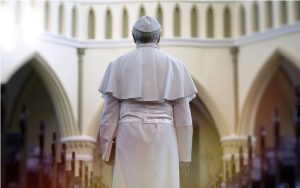
Pope fires warning shot to Church leaders who would defy Vatican II
Extract from David Timbs, Pearls and Irritations, John Menadue Website, 21 April 2024 The neo-traditionalists have been sent a clear message by Pope Francis that their dismissal of synodality, and their disruptive behaviour do violence to the very nature of the Church itself and thereby damage the Reign of God. For Pope Francis, synodality is ‘one of the most precious legacies of the Second Vatican Council’ and the most authentic way for the People of God to receive and implement what Vatican II envisioned. In October 2015, when Francis told the synodal assembly that ‘synodality, as a constitutive element of the Church, offers the most appropriate interpretive framework for the self-understanding of the Church itself, he called on all Catholics to embrace a synodal way of thinking and acting as the path ‘which God expects of the Church of the third millennium’. Since then, Francis has expanded the composition of the Synod of Bishops to include 70 ‘non-ordained’ members with full voting rights to ensure that the true nature of the Universal Church is properly represented: ‘not some of the bishops some of the time but all of the Church all of the time’. Synodality: looking to the future At the 2013/14 Synod on the Family Francis became aware that there was significant deep-seated resistance from some quarters of the Church to the direction he wanted to take it, especially from some bishops. Following that Synod he decided that some coaching in synodality was required and in October 2021 announced a special Synod on Synodality with two General Session to be held over two years, from 2023 to 2024. During the First Session in October 2023 Francis offered all the members – ordained and non-ordained – a Master Class in the learn-by-doing method. They were introduced to the discipline and asceticism of listening, discerning, and praying together, while communicating on a level playing field and beyond personal agendas. Francis used the 2-session and round-table format trialled at the 5th Australian Plenary Council just a year earlier. For Francis, the challenge of synodality is ‘to restore and deepen our roots as the People of God journeying together in a common mission as followers of the Way, Jesus Christ’. Episcopal resistance………..(Source)
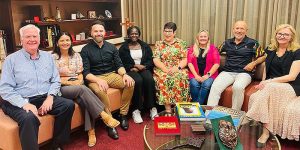
Synod24 launched as the Church moves ahead in mission together
Extract from Joe Higgins, The CatholicLeader, 5 April 2024
BRISBANE archdiocese is holding a synod to start putting into action the outcomes of the Plenary Council. Synod chair Brisbane auxiliary Bishop Tim Norton says the Plenary Council decrees are in Rome and awaiting assent from the Holy See, but there is still a lot of work we can do in the meantime. “It’s time to have some actions,” he said. He said the synod’s focus would be crafting action plans around the Plenary Council decrees so “we can really be moving forward on mission together”. Part of this process is coming together and listening, he said, particularly to the voices who “may not have been heard up until this point”. What is the Plenary Council? A plenary council is a national gathering of laity and religious and their bishops and clergy to discern what God is saying to their Church at that time. The most recent Plenary Council has been running since Pentecost 2018, which culminated in two councils in 2020 and 2021 where motions were raised and voted on. The Plenary Council decrees can be read here. What is the synod? The synod is a gathering to discern the “practical and Spirit-led actions” that the Church in Brisbane will need to undertake in the implementation phase of the Plenary Council. The 150 Synod Members will come from the community and reflect the diversity of the Church in Brisbane……..(MORE). Photo: synod-engagement-team-Brisbane
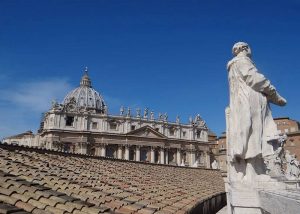 German bishops return to the Vatican amid open crisis
German bishops return to the Vatican amid open crisis
Several German bishops were due to meet with top Vatican officials today, while the two sides are openly at odds over the reform of Church governance
Limited extract from Loup Besmond de Senneville, subscription Journal La Croix International, 22 March 2024 Just hours before the start of Holy Week, several of the highest-ranking officials of the Roman Curia are facing a challenging meeting — the latest round of talks, which was due to take place Friday, with a delegation of Catholic bishops specially convened from Germany. On the agenda for the March 22 gathering was to be the dialogue, initiated several years ago, between the Holy See and the Church in Germany regarding the German “Synodal Path” and its implications. This initiative, with the Catholic bishops and lay leaders of Germany launched in 2019 in response to the clergy sex abuse crisis, has fueled numerous tensions between the Vatican and the German bishops. Closed-door meetings The latest episode in this remote struggle, sometimes played out through the media, was a letter the Vatican sent to the German Bishops’ Conference (DBK) on February 19, just days before the opening of the DBK plenary assembly. The Holy See expressed its strong opposition to the German proposal to establish a “synodal council”. The plan would allow priests, deacons, and lay people to share in decision-making within the Church in Germany. The Vatican sees this as a threat to the exclusive mission of the bishops, whose prerogatives precisely involve decision-making regarding the governance of their dioceses. Friday’s meetings in Rome, which were being held behind closed doors, were expected to include Cardinals Pietro Parolin (Secretary of State), Victor Manuel Fernandez (Doctrine of the Faith), Robert Prevost (Bishops), Kurt Koch (Ecumenism), Arthur Roche (Liturgy), and Archbishop Filippo Iannone (Legislative Texts). Such a gathering is extremely rare for this type of appointment. And according to our information, Pope Francis was not expected to attend…..(SOURCE). Photo: Vatican, Archive picture Xavier Le Normand, La Croix 20240322
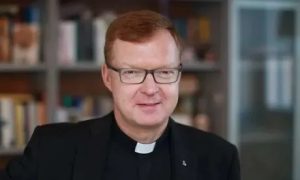 Strong Church anti-abuse protocols need improving
Strong Church anti-abuse protocols need improving
Extract from CathNewsNZ, La Croix Internatiuonal, 26 February 2024
The Church’s strong anti-abuse protocols are enshrined in law says Jesuit priest Hans Zollner, but they are not being universally applied. “More broadly, the norms adopted by Rome indicate the right direction, but we currently have no mechanism to monitor their implementation.” Zollner, director of the Institute of Anthropology at Rome’s Gregorian University, believes the summit Pope Francis called in 2019 to deal with abuse was a major step in the right direction. The problem is that the rules and procedures the Church adopted after the summit aren’t being applied sufficiently or evenly at the local level, he says. At the universal level, several norms have been established. They apply to the whole church Zollner says. One is the Vox estis lux mundi (you are the light of the world) motu proprio by Pope Francis. Promulgated in May 2019, it established new procedural norms that have since been consolidated to combat sexual abuse and ensure that bishops and religious superiors are held accountable for their actions. It also expects all clerics, and men and women religious, to report to their superiors any sexual and spiritual abuse they become aware of. Zollner notes the law is not perfect in any institution, and improvements to the current regulations could be made – to canon law, for instance. He says canonical processes must become more transparent, and procedures and systems must be applied appropriately everywhere. “If we want new legislation to have a lasting and profound effect, it must be accompanied by a change in attitude” he says. Transparency needed. Like Zollner, a woman who says she suffered spiritual and sexual abuse by a priest wants the new anti-abuse protocols to be properly implemented and monitored. Gloria Branciani is demanding transparency from the Vatican and a full accounting of the hierarchs who for 30 years covered for her much-exalted abuser…..(MORE). Photo:Hans Zollner
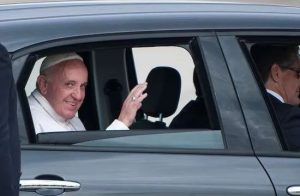 Despite more bumps in the road, Pope Francis keeps on going
Despite more bumps in the road, Pope Francis keeps on going
Though slowed by diminishing health and old age, a world at war and in profound crisis, as well as internal opposition, the pope refuses to halt the journey towards Church reform
Limited Extract from Robert Mickens, Letter From Rome, La Croix International, 24 February 2024
The flu bug has been going around Rome the last several days and guess who caught it? Pope Francis. The Holy See Press said the ailment was the reason why had to cancel a pre-scheduled appointment on Saturday with the transitional deacons of his Diocese of Rome. It’s not clear when the 87-year-old pope actually came down with influenza because he and the top officials in the Roman Curia have been out of sight the past week. They were, each individually, making a Lenten retreat. It seems Francis did his “spiritual exercises”, to use the classical term of his Jesuit order, at the Casa Santa Marta where he lives at the Vatican. The flu is just the latest in a string of illness and health issues that have recently been occurring more regularly for Francis. But as he likes to tell others: “Vai avanti!” Literally meaning “move on” or “keep going”, these are the words he uses to encourage people not to give up on their mission, especially when they face adversity and opposition. Obviously, it’s a phrase that he, too, tries to live by. Francis, who in a few weeks will mark the 11th anniversary of his March 13, 2013 election as Bishop of Rome, has put the Church on a resolute journey towards renewal and reform. And while this engine he’s been driving has hit not a few bumps along the way, it’s come up against even more lately, and even some potholes. How long will the Argentine pope be able to keep at it, given the various challenges he’s facing? No longer running on a full tank………(Source). Photo:Defense Visual Information Distribution Service, public dom, laCroix 20240224
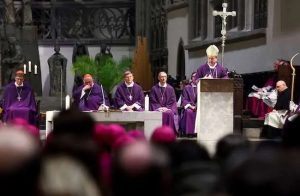 German Church would be abandoning its mission if it halted its synodal plans, says theologian
German Church would be abandoning its mission if it halted its synodal plans, says theologian
Exclusive interview with Arnaud Join-Lambert, professor of theology at the Catholic University of Louvain (Belgium)
Limited Extract from Guillaume Daudé, Subscription Journal, La Croix International, 22 February 2024
The Vatican’s insistence that Catholic bishops in Germany halt plans to create a Synodal Council is based on a “misunderstanding” of the country’s “synodal process”, according to a leading theologian. “Fundamentally, what the German Bishops’ Conference (DBK) aims to establish is not really different from what is initiated and encouraged by the Roman synod on synodality,” says Arnaud Join-Lambert, a married layman who teaches theology at the Catholic University of Louvain in Belgian, Three top cardinals in the Roman Curia issued a letter on February 17, urging the bishops to put the plan on hold this week during as they met for the DBK plenary assembly. Join-Lambert spoke with La Croix’s Guillaume Daudé about the consequences this might have on implementing synodality in the Church both in Germany and at the universal level. La Croix: As the Plenary Assembly of German bishops was set to ratify the statutes of its Synodal Committee, Rome forced them to backtrack, sending a letter to oppose it. What is the Vatican’s criticism of the German Church? Arnaud Join-Lambert: This opposition is a continuation of the Roman misunderstanding regarding the process in Germany. Rome’s main criticism is the establishment of a structure not foreseen by the Code of Canon Law, without seeking permission. However, fundamentally, what the German Bishops’ Conference aims to establish is not really different from what is initiated and encouraged by the Roman synod on synodality. Germany began its “Synodal Path” well before the latter, in a very rigorous and structured manner. Today, German bishops are experimenting something, even as the document from the Roman synod’s continental assembly for Europe emphasizes the necessity of “experimentation” three times. Their intention thus aligns with the synod’s dynamics, but their path is autonomous, which concerns Rome. It’s important not to read this as a general opposition between two blocks. Rome’s decision is not a matter of principle but of law, concerning the statutes of the Synodal Council: it’s not up to the German Church to approve them without referring to the Vatican……(More). Photo: Bishop Georg Baetzing General Assembly German Bishops Conference Feb 2024, ANNA SZILAGYI EPA MaxPPP
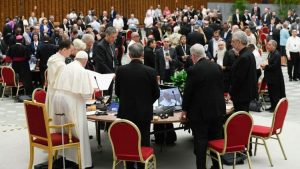 Belgian bishops reportedly back women deacons, end to priestly celibacy
Belgian bishops reportedly back women deacons, end to priestly celibacy
Extract from Elise Ann Allen, Crux, 21 February 2024 ROME – In the lead up to this year’s closing session of the Synod of Bishops on Synodality, the Belgian bishops have apparently opened a national discussion on allowing women deacons and ending the requirement of priestly celibacy. According to Belgian Catholic news site Kerknet, the Belgian bishops’ conference ahead of the October 2-27 synod have sent a letter to all dioceses proposing, among other things, an openness to the women’s diaconate and an end to mandatory priestly celibacy. In the draft text, apparently sent to various diocesan discussion groups and councils throughout Belgium, makes three basic points, the first of which is that “a synodal missionary Church requires open dialogue with the world around us.” The Church, it says, cannot limit itself “to a one-way street” when it comes to sharing the Gospel with the world. In a second point, the bishops ask that the Synod of Bishops “define our Church tradition(s) as dynamic and in constant development.” They also asked for encouragement in pursuing “concrete form to the decentralization” of certain topics of discussion in the Church, “allowing us to work together in unity with more legitimate diversity.” “We ask for a concretization of the ‘accountability’ of the bishops in a synodal Church,” they said. The bishops then apparently called for a deeper reflection on the role of women in the Church, proposing that the decision regarding women deacons be left up to individual dioceses or national or continental bishops’ conferences. Asking for “the green light to take certain steps per bishops’ conference or continental bishops’ meetings,” the bishops said that by doing this, “the giving of increasing pastoral responsibility to women and the ordination of women to the diaconate need not be universally obligatory or prohibited.” They also weighed in on the longstanding debate over priestly celibacy, saying, “There have long been strong questions about the obligation of celibacy for priests and deacons who become widowed.” In this regard, they said there is a need to “rediscover the symbolic-sacramental nature of the ordained ministry.”….(MORE). Photo: Synod Participants Oct 2023, Vat Media, Crux
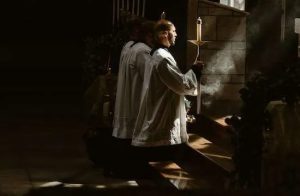 The pope’s problem with today’s seminarians and young priests
The pope’s problem with today’s seminarians and young priests
If surveys and anecdotal evidence are correct, the younger generation of Catholic clerics are not fond of Pope Francis, which could hinder implementation of his reforms going forward.
Limited Extract from subscriptional journal, La Croix International, 17 February 2024
He’s warned Catholic seminaries against the tendency to turn future priests into “little monsters”. He’s scolded the Church’s presbyters for wearing ornate liturgical vestments that stem from a bygone era, telling them to stop dressing up in “granny’s lace”. And he’s called it a “scandal” to see young priests and seminarians going into the ecclesiastical tailor shops of Rome and “trying on cassocks and hats, or lacey albs”. This is all part of Pope Francis venting his aversion to clericalism. He has denounced it over and over again in his eleven years as Bishop of Rome, identifying it as a “scourge” and “plague” that wounds the Church and its members. Railing against clericalism has been a mantra throughout his entire pontificate. “The holy, faithful People of God go forward patiently and humbly, enduring the scorn, mistreatment and marginalization of institutionalized clericalism,” he said last October during the Synod assembly on synodality. “How naturally we speak of the princes of the Church, or of episcopal promotions as getting ahead career-wise!” Indeed. Institutionalized clericalism The pope is right to point out that clericalism is ingrained in the very institution of the Church. It is a deeply-rooted mentality and ethos that is, without a doubt, most often identified in ecclesiastical ambition, certain forms of dress, and the language clerics and even many lay people tend to use. But these are only symptoms, perhaps, of a much deeper and more fundamental problem. It is this: the idea, drilled into the heads of seminarians and priests over the centuries, that they are special. They are chosen ones. They are men “set apart”……..(MORE) Photo:popes-problem-with-todays-seminarians-and-young-priests
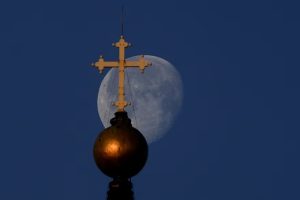
Swiss Catholic Church abuse report delivered to Vatican
Limited Extract from swissinfo.ch, 3 February 2024
The Vatican has received a report on an investigation into allegations that members of the Swiss Bishops’ Conference tried to cover up abuse in the Catholic Church. The Bishop of Chur, Joseph Bonnemain, has submitted the report covering accusations of harassment and covering up alleged abuse. The documentation collected as part of the preliminary canonical investigation, mandated in June 2023 by the Vatican, totals 1,800 pages, the bishopric of Chur said in a press release on Friday. A 24-page final report contains a series of conclusions and recommendations for Vatican officials. The bishopric of Chur has not provided information on the concrete results of the preliminary canonical investigation. Questioned by the Keystone-ATS agency, Nicole Büchel, communications manager, explained that she did not receive authorisation from Rome to reveal the content of the report. With the submission of the report, Bonnemain’s mission is complete, the diocese said. “The files will now be studied at the Vatican, which could take some time.” Those responsible for the Roman Curia will then draw their conclusions, make decisions and communicate them in an appropriate form. Bishop Bonnemain was commissioned by Rome to investigate the behaviour of four members of the Bishops’ Conference due to possible omissions of abuse reports. For a fifth member of the episcopal conference, it was a question of shedding light on alleged acts of sexual harassment. According to the press release, Nicolas Betticher, former vicar general of the diocese of Lausanne, Geneva and Friborg denounced the wrongful behaviour of certain Swiss bishops. For his preliminary investigation, Bonnemain was supported in his work by Pierre Cornu, cantonal judge of Neuchâtel, and by Brigitte Tag, professor of criminal law and criminal procedure at the University of Zurich…..(More). Photo: swissinfo.ch 3 February 2024
 National consultation for next Synod assembly begins
National consultation for next Synod assembly begins
Extract from CathNews, ACBC, 1 February 2024
Catholics around Australia are being asked to contribute to a global discussion on the future of the Church. At a diocesan level, consultation contributing to the next session of the General Assembly of the Synod of Bishops will start today. Groups of Catholics will gather and reflect on the question of “enhancing the differentiated co-responsibility in the mission of all members” and provide feedback. The discussion will focus on identifying the paths to follow and the tools that could be adopted in different contexts and circumstances to enhance the unique contribution of each baptised person. The dioceses will then report their findings. Dioceses are also encouraged to submit a two-page testimony of their experiences of synodality, including any best practices that they consider significant. Catholics will also be encouraged to promote new initiatives that will help them grow as a synodal Church on mission. “This work does not require restarting the synodal process again in dioceses, but rather it is built upon the outcomes of the synodal experiences from previous stages of consultation,” said Australian Catholic Bishops Conference president Archbishop Timothy Costelloe SDB. National Centre for Pastoral Research director Dr Trudy Dantis said: “In responding to the questions, dioceses and groups are invited to focus on the ‘how’ and to choose aspects that enable them to make contributions based on their own situation, character and experience.” ….(More). Image: Synod on synodality updated logo 2024
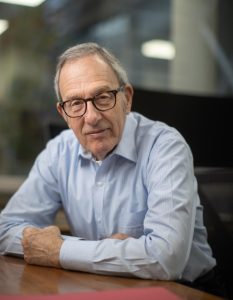
The Hon. Anthony North KC appointed Yoorrook Commissioner
Extract from Yoorook Justice Commission, 31 January 2024
Former Federal Court Judge the Hon. Anthony North KC has been appointed as a Commissioner of Victoria’s formal truth telling process, the Yoorrook Justice Commission. Commissioner North has had a long and distinguished legal career. Commissioner North served as a judge of the Federal Court of Australia from 1995 to 2018. For the past four-and-a-half years he has been Chair of the Victorian Law Reform Commission (VLRC). During his time as a judge, Commissioner North’s main areas of work were cases about native title, refugee law, industrial law, and criminal appeals in the Australian Capital Territory Court of Appeal. In his role as Chair of the VLRC Commissioner North has consulted extensively with First Nations organisations and community members on issues of social justice. Chair of Yoorrook, Professor Eleanor Bourke said: “I welcome the appointment of Commissioner North to the Yoorrook Justice Commission. “This is a crucial period in the truth telling process. Yoorrook is undertaking concurrent inquiries into land, health, housing, education and economic, social and political life. Yoorrook will hold public hearings in the coming months and will complete its historic work by June 2025. “As a former judge with a long and illustrious legal career, Commissioner North will bring invaluable experience and insight to Yoorrook as we work to fulfil the Commission’s extensive mandate. I welcome Commissioner North and look forward to working with him.” Commissioner North said: “I am honoured to contribute to the historic work of the Yoorrook Justice Commission. I hope that my skills and experience will help advance its work: to tell the truth of our history. That truth is the foundation for community understanding, which is necessary so that we can move towards a more just society.”….(Source).
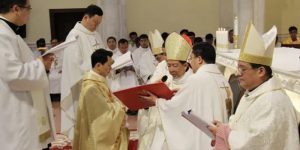 Pope extends policy of detente with China
Pope extends policy of detente with China
Extract from CathNews, Crux, 31 January 2024
Several significant developments for the Catholic Church in China have occurred this week, including a bishop’s appointment and the establishment of a new diocese on the mainland for the first time since Mao’s Communist revolution. On Monday, the Vatican announced the suppression of the apostolic prefecture of Yiduxian and the establishment of the Weifang Diocese in a bid to “promote the pastoral care of the Lord’s flock and to attend more effectively to its spiritual good”. A Vatican statement said the decision to replace the Yiduxian prefecture with the Weifang Diocese was made in April 2023, and that at the same time, Bishop Anthony Sun Wenjun, 53, had been appointed to lead the diocese. Bishop Wenjun’s episcopal ordination took place on Monday in the cathedral of Christ the King in Qingzhou, the former headquarters for the Apostolic Prefecture of Yiduxian, in a ceremony led by Bishop John Fang Xingyao of Linyi, honorary president of the Chinese Catholic Patriotic Association, the state-sanctioned entity that governs the “official” Catholic church in China. The establishment of Weifang Diocese marks the first formal creation of a new diocese by the Holy See in China since the Communist revolution in 1949…..(More). Photo: Vatican announced establishment of new diocese and bishop consecration, Chinese Catholic Patriotic Association.
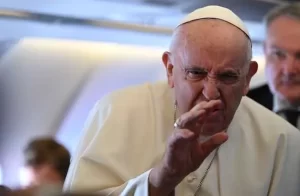 Pope takes the “heresy hunters” to task
Pope takes the “heresy hunters” to task
Pope Francis challenges all of us with a poignant reflection on the Parable of the Good Samaritan at the conclusion of the eight-day Week of Prayer for Christian Unity.
Extract from Robert Mickens, Letter from Rome, La Croix International, 27 January 2024
The mainline Churches in the northern hemisphere have just concluded the Week of Prayer for Christian Unity. And by many of the comments that appeared on social media during the January 18-25 commemoration, it would seem that at least some English speakers who describe themselves as “traditional” or “loyal” Catholics saw this annual ecumenical event as a propitious time to remind Christians who are not in communion with the Church of Rome that they are heretics. Some of these “staunch” Catholics were particularly steamed that Pope Francis allowed the Archbishop of Canterbury, Dr. Justin Welby, and his fellow Anglicans to celebrate the Eucharist at St. Bartholomew’s on the (Tiber) Island in Rome. This is the 10th century church that John Paul II designated during Jubilee 2000 to be a shrine to the “new” Christian martyrs of the 20th and 21st centuries. The Catholic loyalists were quick to point out, sometimes in vulgar and insulting terms, that “Mr. Welby” (as most of them called him) and the other Anglican bishops and priests were not validly ordained. “A reminder that, per Leo XIII’s Apostolicae curae of 1896, Anglican orders are ‘absolutely null and utterly void’,” said a post on X (formerly Twitter) that was replicated in many variations, most of which are just too nasty and uncharitable to repeat here. The words “heretic” and “heresy” were also hurled mercilessly at non-Catholics over and over again — and they were aimed at the current pope, as well, sometimes quite explicitly……(More). Photo: Pope Francis, Johannes Neudecker, AP, dpa, La Croix
Same-Sex Blessing Conflict
Extract from J.A.Dick, Another Voice, 25 January 2024,
Catholic Church leaders in Africa and Central Asia prohibit the blessing of same-sex couples, despite recent Vatican approval. In fact, Catholic bishops in several countries have objected to the Vatican’s, and Pope Francis’, recent approval of blessings for same-sex couples, underscoring the divisiveness of the issue in the global Catholic Church. The Catholic bishops of Africa and Madagascar issued a unified statement refusing to follow the Vatican declaration allowing priests to offer blessings to same-sex couples and asserting that such unions are “contrary to the will of God.” The U.S. Conference of Catholic Bishops issued a brief statement focusing mostly on its assertion that same-sex couples remain ineligible for liturgical blessings and reiterating the church’s position that marriage is a union of a man with a woman. Some bishops in Germany and Belgium, however, have long defied the earlier Catholic Church ban on blessing same-sex unions, even going so far as to produce a rite of blessing for same-sex couples….(More)
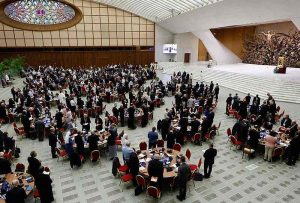 More signs of hope from the synod synthesis report
More signs of hope from the synod synthesis report
Extract from Thomas Groome, NCR Online, 21 December 2023
In a recent and typically fine essay, Tom Reese elaborated on “15 hidden gems in the synod on synodality report.” With this, Reese was inviting us to a second and more in-depth reading after the initial and mixed responses to “A Synodal Church in Mission,” the synthesis report issued promptly after the close of the XVI Ordinary General Assembly of the Synod of Bishops in Rome Oct 4-29. Note first that most see the move toward synodality as a renewed impetus for the vision of the Second Vatican Council (1962-65) as epitomized in Lumen Gentium, the Dogmatic Constitution on the Church. There, the council portrays the church as first a mystery and then “the people of God,” before reflecting on its “hierarchical structure” — in a sense, turning the church upside down from its hierarchical pyramid. Synodality now is the way forward that can engage the whole people of God as active agents of their faith, moving along together. Yet there was serious disappointment with the synod’s synthesis report on at least two crucial fronts: It did not endorse the ordination of women to the diaconate, and it made no explicit mention of full inclusion in the church for LGBTQ+ people. As a sign of hope, however, the report notes that while there was opposition, there was also a strong sentiment that admitting women to the diaconate would “restore the practice of the Early Church” and thus would be “faithful to the tradition.” This prompts the reasonable cry of “What are we waiting for?” Likewise, while it does not use the term LGBTQ+, the synthesis report repeatedly uses the word “welcome” as defining the imperative posture of the church toward all peoples. Pope Francis’ constant chant of “todos” is generally heard as highlighting a particular welcome for LGBTQ+ people. In his sermon on Sunday, Oct. 29, the day after this synod gathering closed, Francis called for — as he has so often — “a church with open doors that is a haven of mercy” for all…..(More). Photo: Assembly Synod of Bishops Pope Francis pray before working session Oct 16, CNS, Lola Gomez
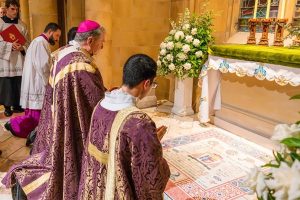 Archbishop Anthony Fisher OP: The courage of Cardinal Pell
Archbishop Anthony Fisher OP: The courage of Cardinal Pell
This is the edited text of the homily given by Archbishop Anthony Fisher OP at the Memorial Mass for George Cardinal Pell, St Mary’s Cathedral, Sydney, 10 January 2024.
Extract from Archbishop Anthony Fisher, Catholic weekly, 21 January 2024
Years ago, I was in a lift in Goold House, then the Archdiocese of Melbourne’s chancery building, when I overheard some officials discussing the translation of George Pell to Sydney. One remarked that his motto had been “Be not afraid” and wondered what his successor’s watchword would be. From the back of the lift I whispered, “Be very afraid!” The motto came, of course, from Christ, and was quoted by St John Paul the Great at his election. “Be not afraid,” Jesus tells His disciples repeatedly. “Let not your hearts be troubled: believe in God, believe also in me.” (Jn 14:1,27) With the Lord as my light and help, our Psalmist sang, whom shall I fear? (Ps 26:10) And as Paul said in our epistle, we should have the confidence of heirs, not the anxiety of slaves (Rom 8:14-23). George Pell was unafraid. In the inaugural Acton Lecture at the Centre for Independent Studies he argued that the Church’s task today is to teach and demonstrate that “true freedom requires truth and is the fruit of consistently striving for what is good.” Yet, as he knew very well, there are competing accounts of truth and goodness. There are many options open to us, some good, some less so, some plain evil. To know and care which is which and choose well between them requires an unwavering commitment to truth and consistent willing of the good. And these were marks of the man George Pell. In postmodernity it’s pick your own poison when it comes to the good. But the Cardinal was no relativist. Only a limited number of genuine goods constitute human flourishing and explain our rational choices: life and health, truth and beauty, friendship and family, work and leisure, integrity and religion. Each is self-evidently valuable, a divine perfection and a human need. We all seek them all, but most of us specialise in one or two for much of our lives. Doctors focus on life and health; teachers on knowledge; artists on beauty; and so on…….(More).. Photo: Archbishop Anthony Fisher, Cardinal George Pell tomb 10 January 2024, Patrick J Lee
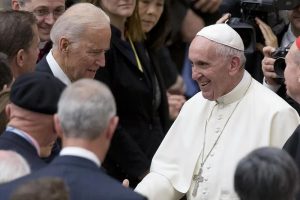 New poll finds Pope’s unfavorable rating among Americans at all-time high
New poll finds Pope’s unfavorable rating among Americans at all-time high
Extract from John Lavenburg, Mational Correspondent, Crux, 13 January 2024
NEW YORK – A new survey conducted this past December has found that while most American adults still have a favorable view of Pope Francis, the percentage that hold an unfavorable opinion of the pontiff has risen to a new ten-year high. The survey, conducted Dec. 1-20 by the Gallup organization, found that 58 percent of American adults overall have a favorable opinion of Francis, the same as when he became pope in 2013. However, over the same period, the percentage of American adults who have an unfavorable opinion of Francis has risen from 10 percent to a new high of 30 percent. The percentage of American adults who have not heard of, or hold no opinion of, the pontiff has also dropped from 31 percent in 2013 to 11 percent in the latest survey, the data shows. The survey data shows a similar trend among American Catholics as among American adults generally, in the sense of a rising level of unfavorable opinion. Perhaps unsurprisingly, given a polarized political environment in both Church and state, Francis’s favorability amongst self-described liberal American Catholics has increased since 2013, while his favorability among conservative American Catholics has declined…….(More). Photo: Pope Francis meeting then-Vice President Joe Biden, Andrew Medichini AP, Crux
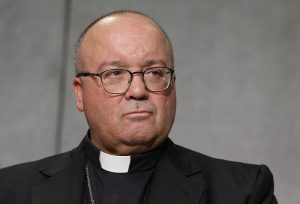
Vatican doctrine official says celibacy should be optional for Catholic priests
Extract from Justin McLellan, National Catholic Reporter, 8 January 2024
The Catholic Church should revise its celibacy requirement for Latin-rite priests, a senior official in the Vatican’s doctrinal office said. “If it were up to me, I would revise the requirement that priest(s) have to be celibate,” said Archbishop Charles Scicluna of Malta, adjunct secretary of the Dicastery for the Doctrine of the Faith, in an interview with the Times of Malta released Jan. 7. “Experience has shown me this is something we need to seriously think about.” The archbishop said that the phenomenon of Catholic priests engaging in hidden, long-term sentimental relationships — something he said “happens everywhere” — is a “symptom” of priests “having to cope with” their celibacy requirement. He acknowledged that some priests father children in Malta and elsewhere. “We’re talking about priests around the world, so I think it happens in Malta as well,” he said. A man who feels called to the priesthood, “may mature, enter in relationships, love a woman, love another person, and they have to make a choice,” he said. “Right now, they have to make a choice.” The interview was conducted in Maltese, but the Times of Malta provided an English translation of his remarks in its story and in subtitles on the video clip it released. Scicluna said the Latin-rite church “should learn from the Catholic churches of the Oriental rite,” which have a tradition of married priests. In many of the 23 Eastern Catholic churches, men are allowed to get married prior to being ordained but cannot become bishops. Celibacy, Scicluna said, “was optional for the first millennium of the church’s existence, and it should become optional again.”….(More). Photo:Archbishop Charles Scicluna Malta CNS photo Paul Haring.
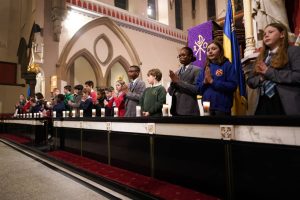
‘Catholicism in Numbers’: New data highlights the changing Catholic Church in Britain and Ireland
Extracts from Tim Kinnear, Catholic Herald, UK, 1 January 2024
A new set of pastoral statistics regarding the Catholic Church in England and Wales, Scotland and Ireland has been released by the Catholic Record Society (CRS). They are freely available from the CRS website under a new project titled “Catholicism in Numbers”. The project begins with data collated by myself, and which draws information from the Catholic Directory and other sources. The CRS are encouraging those with their own historical datasets to get in touch and contribute to this growing resource…………The statistics are illuminating when considered together. Ordinations have declined substantially (approximately 139 secular ordinations in England and Wales in 1960 and 32 in 2019) and there are fewer sisters in religious orders (around 11,428 in Ireland in 1991 and 4,887 in 2020). That said, the ministry of the permanent diaconate has grown with about 752 Permanent Deacons in England and Wales by 2010, up from 475 in 2000. Although fewer than the decline in Priests, the Permanent Deacons reflect a distinctive calling that will shape many Catholics’ experiences of ministry in their parish. With more Permanent Deacons and fewer parish sisters, this impacts the gender make-up of local ministry teams. And to whom do they minister? Statistics indicate more stability in the size of the Catholic population while Mass attendance has declined. So practice, if not identity, has changed, affecting the visibility and accessibility of Catholics to their local ministers. Meanwhile, the figures affirm the ongoing and distinctive contribution of Catholic schools as numerically very large sites of public witness (2,090 in England and 85 in Wales in 2022). Schools may connect those with no Catholic background to elements of the faith and social teaching, and form a substantial and visible role in the life of our nations. Does the Church’s public witness lead to baptism and reception into the faith? Well, see the figures……(Source). Photo:Changing Catholic Church, Britain, Ireland, Catholic Herald, Ian Forsyth, Getty Images 20240101
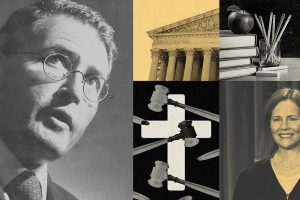 Public Christian schools? Leonard Leo’s allies advance a new cause
Public Christian schools? Leonard Leo’s allies advance a new cause
A tight-knit group of activists tied to Leo’s nonprofit network are rallying around an Oklahoma effort to create a public Catholic school.
Extract from Heidi Przybyla, Politico, 29 December 2023
Groups aligned with the conservative legal movement and its financial architect, Leonard Leo, are working to promote a publicly funded Christian school in Oklahoma, hoping to create a test case to change the Supreme Court’s interpretation of the First Amendment’s separation of church and state. At issue is the Roman Catholic Archdiocese of Oklahoma’s push to create the St. Isidore of Seville Catholic Virtual School, which would be the nation’s first religious school entirely funded by taxpayers. The school received preliminary approval from the state’s charter school board in June. If it survives legal challenges, it would open the door for state legislatures across the country to direct taxpayer funding to the creation of Christian or other sectarian schools. Brett Farley, executive director of the Catholic Conference of Oklahoma, acknowledges that public funding of St. Isidore is at odds with over 150 years of Supreme Court decisions. He said the justices have misunderstood Thomas Jefferson’s intent when he said there should be a wall separating church and state, but that the current conservative-dominated court seems prepared to change course. “Jefferson didn’t mean that the government shouldn’t be giving public benefits to religious communities toward a common goal,” he said. “The court rightly over the last decade or so has been saying, ‘No, look, we’ve got this wrong and we’re gonna right the ship here.’ ”…….(More). Photo: POLITICO illustration by Emily Scherer, Photos AP, Getty Images, iStock 20231229
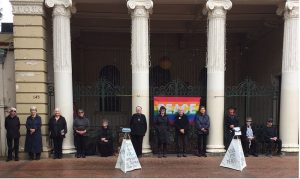
Hopeful pearls for peace
Extract from Frances Letters, Pearls and Irritations, 29 December 2023
Armidale, my hometown on the Northern Tablelands of NSW. Ever since then, on the last Saturday of each month, outside the old Courthouse in the centre of town a group of women have stood in silent WIB vigil. For peace. Gratefully we tune in to those Palestinian and Israeli women who are calmly refusing to sneer or snarl at one another. Or, of course, to even think of squinting down a gun barrel … It was involvement in Women in Black that first alerted me to my second pearl: Jewish Voice for Peace. Though not Jewish myself, years of supporting them have meant I’m privileged to be considered a member. JVP has always been passionate in demanding ‘solidarity with the Palestinian freedom struggle, guided by a vision of justice, equality, and dignity for all people’. “We fight for the liberation of all people. We believe that through organizing, we can and will dismantle the institutions and structures that sustain injustice and grow something new, joyful, beautiful, and life-sustaining in their place. We picture the return of Palestinian refugees, reuniting with their families and communities. We picture Palestinians — from the Jordan River to the Mediterranean Sea — living with their inalienable rights respected, building schools and hospitals and planting olive groves with the resources they need. We imagine Jewish Israelis joining Palestinians to build a just society, rooted in equality rather than supremacy, dignity rather than domination, democracy rather than dispossession — a society where every life is precious.” Who could honestly object to mild, gentle groups of WIB standing together in a vigil for peace? Or Jewish voices raised in a plea for harmony, brotherhood and sisterhood? Sadly, it’s obvious that neither longed-for goal has yet been achieved… So now for a far more unusual step towards the growth of a third pearl……(More). Photo:Peace, Pearls and Irritations, 20231229
The need for theological reform
Extracts from Michael Morwood, Pearls & Irritations, Dec 27, 2023
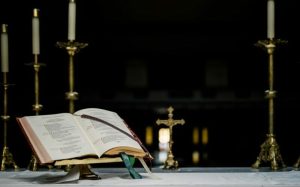
………In 1974, Karl Rahner, wrote “If we are honest, we must admit that we are to a terrifying extent a spiritually lifeless Church.” (The Shape of the Church to Come, p.82) Today we could add that the Church is not only spiritually lifeless but that it is also theologically lifeless. By continuing to insist as it does, that traditional doctrine is immutable, the Church will remain lifeless. The informal schism will continue. Voices that could bring church belief and practice alive again, as happened in the post-Vatican II era, are kept silent or remain underground. As long as bishops have the authority to silence sincere progressive thinkers on the grounds of infidelity to Church teaching as enshrined in The Catechism of the Catholic Church, the lethargy and lifelessness will persist. This present time offers an exhilarating opportunity for Christian theology. Encouraging theologians to dialogue and openly explore the theological implications of the “new story” of the universe would immediately breathe new and much-needed energy into theological conversation. What can be done?…..(More) Image: Scripture – Unsplash
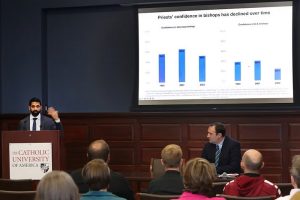
Research captures a fractured, distrustful priesthood in America
Extract from John Lavenburg, Crux, 22 December 2023
NEW YORK – When asked to sum up the state of the American priesthood, Catholic University of America sociologist Brandon Vaidyanathan describes it as “fractured,” in that individually priests are doing well, but their assessment of the institutional Church “is not very good.” What’s more, research conducted by Vaidyanathan and others has found that not only is there a striking deficit in the trust priests feel in their bishop, but there’s also a significant generational mistrust priests have in each other that relates to differing theological and political alignments. “There’s a mutual distrust of each other that is driven by political differences, and so young priests view older priests with suspicion and vice versa,” Vaidyanathan told Crux. “The younger priests are more conservative, and don’t see the older priests as sort of a part of the same program.” The insight became apparent to Vaidyanathan and other researchers in an analysis of data compiled for “The National Survey of Catholic Priests,” which was published in October 2022 by CUA’s Catholic Project. The survey, the largest of American Catholic priests in over 50 years, got responses from 3,516 priests across 191 dioceses/eparchies. The survey also included interviews with more than 100 priests selected from respondents, and a census survey of U.S. bishops receiving 131 responses…..(More). Photo: Brandon Vaidyanathan study of US Catholic priests, Bob Roller, CNS, Crux 20231222
Pope Francis to Vatican officials: Ideology, rigidity prevents church from moving forward
Extract from Cristopher White, National Catholic Reporter, Vatican News, 21 December 2023
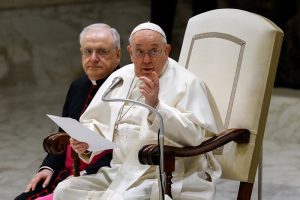
Pope Francis on Dec. 21 cautioned top Vatican officials against becoming rigid and obsessing over ideology, saying that such habits can prevent the Catholic Church from growing. “Fear, rigidity and monotony make for an immobility that has the apparent advantage of not creating problems…but lead us to wander aimlessly within our labyrinths, to the detriment of the service we are called to offer the church and the whole world,” said the pope. Francis offered the warning in his annual pre-Christmas address to the Roman Curia — the Vatican’s central bureaucracy — where he warned that rigid ideological positions, even if motivated by good intentions, can “separate us from reality and prevent us from moving forward.” His remarks come just three days after the Vatican’s doctrinal office released a landmark document, announcing there had been a “development” in the church’s understanding of blessings that now allows Catholic priests to bless couples in same-sex unions, and straight couples who have been divorced and remarried. The decision has been met with mixed reactions with some church leaders hailing it as progress, while others condemning it as inconsistent with the church’s long-standing teaching that marriage is a sacrament celebrated between one man and one woman. While the pope did not explicitly reference the Dec. 18 declaration from the Dicastery for the Doctrine of the Faith, Francis was adamant in his address that it was the duty of church officials to be attentive to the pastoral needs and realities of those whom they are tasked to serve……(More). Photo:Pope Francis Christmas Message 2023, CNS photo Lola Gomez
More signs of hope from the synod synthesis report
Extract from Opinion, Thomas Groome, National Catholic Reporter, 21 December 2023
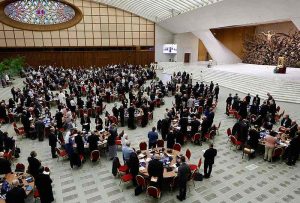
In a recent and typically fine essay, Tom Reese elaborated on “15 hidden gems in the synod on synodality report.” With this, Reese was inviting us to a second and more in-depth reading after the initial and mixed responses to “A Synodal Church in Mission,” the synthesis report issued promptly after the close of the XVI Ordinary General Assembly of the Synod of Bishops in Rome Oct 4-29. Note first that most see the move toward synodality as a renewed impetus for the vision of the Second Vatican Council (1962-65) as epitomized in Lumen Gentium, the Dogmatic Constitution on the Church. There, the council portrays the church as first a mystery and then “the people of God,” before reflecting on its “hierarchical structure” — in a sense, turning the church upside down from its hierarchical pyramid. Synodality now is the way forward that can engage the whole people of God as active agents of their faith, moving along together. Yet there was serious disappointment with the synod’s synthesis report on at least two crucial fronts: It did not endorse the ordination of women to the diaconate, and it made no explicit mention of full inclusion in the church for LGBTQ+ people. As a sign of hope, however, the report notes that while there was opposition, there was also a strong sentiment that admitting women to the diaconate would “restore the practice of the Early Church” and thus would be “faithful to the tradition.” This prompts the reasonable cry of “What are we waiting for?” Likewise, while it does not use the term LGBTQ+, the synthesis report repeatedly uses the word “welcome” as defining the imperative posture of the church toward all peoples……(More). Photo: Members Assembly Synod of Bishops CNS Lola Gomez

Incomprehension in Africa after the authorization to bless same-sex couples
While African episcopates remain discreet for the time being, local priests and laypeople do not hesitate to express their incomprehension after the authorization given to priests to bless “couples in irregular situations and same-sex couples”
Limited extract from Guy Aimé Eblotié, Subscription Journal, La Croix International, 19 December 2023 |
“It’s been a while since we’ve been trying in vain to understand where the pope wants to lead the Church.” This statement from an African priest with more than three decades of priesthood, who wishes to remain anonymous, conveys both “his shock” and “his concerns” after reading the document Fiducia supplicans. Published December 18 by the Dicastery for the Doctrine of the Faith, this statement authorizes the blessing of “couples in irregular situations and same-sex couples” provided that it does not “create confusion with the blessing proper to the sacrament of marriage”. Immediately relayed by the press, this decision quickly became the center of conversations among African laypeople and priests, who are overwhelmingly opposed to this possibility. While the solicited episcopates have not yet responded, the faithful do not hesitate to express themselves. “How can this blessing lead these people towards conversion if the Church considers them to be in sin?”, asks François, an Ivorian Catholic. For him, “to open a blessing, whatever the form of the rite, is at least to comfort [these people] in a situation from which they are nevertheless called to leave”. He even considers that such a blessing could “promote this way of life as a couple.” In its statement, the Vatican, however, emphasizes that it is not about offering “a form of moral legitimacy to a union that presumes to be a marriage or to an extra-marital sexual practice”, but rather to grant a blessing to the person who “shows himself to be in need of God’s saving presence in his life”……(More). Photo: incomprehension-in-africa-after-the-authorization-to-bless-same-sex-couples-La Croix Int 20211219
Vatican shift on gay blessings has ‘deep pastoral implications,’ say theologians
Limited extract from by Aleja Hertzler-McCain, National Catholic Reporter, 19 December 2023
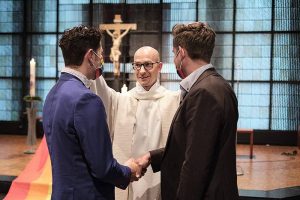
Theologians and LGBTQ+ advocates greeted with mixed emotions the unexpected Dec. 18 declaration from the Vatican’s doctrinal office that Catholic priests could bless same-sex couples, as well as divorced and remarried couples. “It’s a big, small step forward,” said Brian Flanagan, a gay Catholic theologian and senior fellow at New Ways Ministry, an LGBTQ+ Catholic advocacy organization. “Some of the headlines ran too far too fast because it’s a very specific and limited declaration,” Flanagan said. But he also said that the declaration has “deep pastoral implications for Catholics around the world, especially in places that currently don’t have civil same-gender marriage at all.” Brian Flanagan, a gay Catholic theologian and senior fellow at New Ways Ministry, said, “For those of us like me” who have the patience and privilege “to stick it out, I think we are helping the church to grow into what will seem normal in a few hundred years.” Flanagan emphasized “the number of people who might give their relationship to Christ and their relationship to the Church a second thought, a more open thought, who might feel welcome now in a church in a way they would not have otherwise.” He continued, “I think it’s a huge move.”…..(More). Photo: Fr Christian Olding blesses gay couple in Church of St. Martin in Geldern, Germany, OSV News KNA Rudolf Wichert.
New SA document aims to bring parishes and schools closer together
Extracts from CathNews, The Southern Cross, 13 December 2023
 A document that provides a framework to support positive relationships between Adelaide parishes and Catholic school communities has been officially launched. More than 200 Catholic school principals, assistant principals, parish priests, parish pastoral council chairs, Catholic Education SA and archdiocesan leaders, together with parishioners from around the state, gathered at the Vietnamese Catholic Community in Pooraka on November 17 for an information session on “Being Church Together”. There have been several iterations of the document since the first working draft was penned in 2018 following visitations to parishes and schools as part of the archdiocesan renewal program. The current offering was produced by the archdiocese’s pastoral services team following consultation with Catholic Education SA leaders and the Port Pirie Diocese. The 2023 version reflects the developments in the local, national and global Church – particularly synodality – and draws on real-life experiences of parishes and schools across South Australia. It includes a section on “activating principles for good practice” in which communities are encouraged to reflect on their current realities, imagine a vision for the future, and discern strategies for action. In launching the document (HERE), Adelaide Archbishop Patrick O’Regan spoke of his experience attending the Synod on Syndodality in Rome in October and the unique offering of Catholic education in Australia. He said it was important there was a strong relationship between parishes and school communities. “I’m delighted that we have such a wonderful document. This is an indication of where we are going, this is not only the roadmap but the vehicle by which we can travel – but we travel together on the way,” he said. …..(Source)
A document that provides a framework to support positive relationships between Adelaide parishes and Catholic school communities has been officially launched. More than 200 Catholic school principals, assistant principals, parish priests, parish pastoral council chairs, Catholic Education SA and archdiocesan leaders, together with parishioners from around the state, gathered at the Vietnamese Catholic Community in Pooraka on November 17 for an information session on “Being Church Together”. There have been several iterations of the document since the first working draft was penned in 2018 following visitations to parishes and schools as part of the archdiocesan renewal program. The current offering was produced by the archdiocese’s pastoral services team following consultation with Catholic Education SA leaders and the Port Pirie Diocese. The 2023 version reflects the developments in the local, national and global Church – particularly synodality – and draws on real-life experiences of parishes and schools across South Australia. It includes a section on “activating principles for good practice” in which communities are encouraged to reflect on their current realities, imagine a vision for the future, and discern strategies for action. In launching the document (HERE), Adelaide Archbishop Patrick O’Regan spoke of his experience attending the Synod on Syndodality in Rome in October and the unique offering of Catholic education in Australia. He said it was important there was a strong relationship between parishes and school communities. “I’m delighted that we have such a wonderful document. This is an indication of where we are going, this is not only the roadmap but the vehicle by which we can travel – but we travel together on the way,” he said. …..(Source)
Pope’s response to U.S. Catholic conservatism. Francis, Strickland & Burke
Limited Extracts from Massimo Faggioli, Commonweal, 12 December 2023
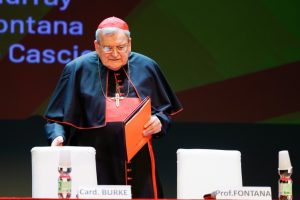 The year-long break between the first and second assemblies of the Synod on Synodality began with Pope Francis disciplining two of his most outspoken critics. First, he removed Bishop Joseph Strickland as head of the Tyler, Texas, diocese; days later, he reportedly ousted Cardinal Raymond Leo Burke from his Vatican-subsidized apartment and took away the salary Burke was receiving as a retired cardinal. As a procedural matter, the Strickland decision was a straightforward instance of following the measures the Church provides—in this case, an apostolic visitation—concerning the right of the people of God to be governed by the pastor of the diocese, and for ensuring the respect for all those, including clergy, under a diocesan bishop’s jurisdiction. Burke’s case is different, and it says something more about this phase of Francis’s pontificate. No matter one’s opinion about Burke’s theology or the company he keeps, the way his punishment was handled and communicated via non-institutional channels speaks clearly to how Francis thinks about the college of cardinals and the dignity of the title of “cardinal” itself. Francis tried to eliminate the papal court by moving out of the papal apartment to live in Santa Marta, but at the same time he weakened intermediate bodies, especially the college of cardinals and the secretariat of state. A case in point is the story of Cardinal Giovanni Angelo Becciu, who was the second-ranking official in the Vatican’s Secretariat of State when dismissed by Francis in September 2020 while at the center of a landmark financial crimes trial; the following April, Francis eliminated the right of all cardinals to be judged by the pope. Since the start of Becciu’s trial, Francis has also published the reform constitution of the Roman Curia (March 2022) and the new Constitution for the Vatican City State (May 2023), which have augmented papal powers at the expense of other ecclesiastical bodies. Even if the pope has power that is “supreme, full, immediate and universal,” it’s not absolute; that is, the pope is subject to the supremacy of divine natural and positive law. And certain uses of papal power can backfire. Burke, the former prefect of the Segnatura and archbishop emeritus of St. Louis, receives generous financial support from allies in the United States; a possible unintended consequence of Francis’s punishment may be to empower Burke in the way the “crown cardinals” of the early modern era were. And Burke remains a cardinal, retaining the right to participate in a conclave until he reaches the age of eighty, on June 30, 2028……….The 1960s have long been seen as a decisive decade in terms of Christianity’s encounter with secular and pluralistic modernity. In terms of secular modernity’s impact on relations among different Christian traditions, the 1990s—with the explosion of the culture wars—were crucial. Now, just over a decade into Francis’s papacy, we have transitioned into a global Christianity that is more reflective of the Southern hemisphere, and in the United States, a Catholicism and Protestantism that is, to be blunt, less “white” and less “male.” It’s hard not to see Strickland and what he represents as a reaction to this new demographic reality…..(Source). Photo: Cardinal Burke Rome October 2023, CNS photo Lola Gomez.
The year-long break between the first and second assemblies of the Synod on Synodality began with Pope Francis disciplining two of his most outspoken critics. First, he removed Bishop Joseph Strickland as head of the Tyler, Texas, diocese; days later, he reportedly ousted Cardinal Raymond Leo Burke from his Vatican-subsidized apartment and took away the salary Burke was receiving as a retired cardinal. As a procedural matter, the Strickland decision was a straightforward instance of following the measures the Church provides—in this case, an apostolic visitation—concerning the right of the people of God to be governed by the pastor of the diocese, and for ensuring the respect for all those, including clergy, under a diocesan bishop’s jurisdiction. Burke’s case is different, and it says something more about this phase of Francis’s pontificate. No matter one’s opinion about Burke’s theology or the company he keeps, the way his punishment was handled and communicated via non-institutional channels speaks clearly to how Francis thinks about the college of cardinals and the dignity of the title of “cardinal” itself. Francis tried to eliminate the papal court by moving out of the papal apartment to live in Santa Marta, but at the same time he weakened intermediate bodies, especially the college of cardinals and the secretariat of state. A case in point is the story of Cardinal Giovanni Angelo Becciu, who was the second-ranking official in the Vatican’s Secretariat of State when dismissed by Francis in September 2020 while at the center of a landmark financial crimes trial; the following April, Francis eliminated the right of all cardinals to be judged by the pope. Since the start of Becciu’s trial, Francis has also published the reform constitution of the Roman Curia (March 2022) and the new Constitution for the Vatican City State (May 2023), which have augmented papal powers at the expense of other ecclesiastical bodies. Even if the pope has power that is “supreme, full, immediate and universal,” it’s not absolute; that is, the pope is subject to the supremacy of divine natural and positive law. And certain uses of papal power can backfire. Burke, the former prefect of the Segnatura and archbishop emeritus of St. Louis, receives generous financial support from allies in the United States; a possible unintended consequence of Francis’s punishment may be to empower Burke in the way the “crown cardinals” of the early modern era were. And Burke remains a cardinal, retaining the right to participate in a conclave until he reaches the age of eighty, on June 30, 2028……….The 1960s have long been seen as a decisive decade in terms of Christianity’s encounter with secular and pluralistic modernity. In terms of secular modernity’s impact on relations among different Christian traditions, the 1990s—with the explosion of the culture wars—were crucial. Now, just over a decade into Francis’s papacy, we have transitioned into a global Christianity that is more reflective of the Southern hemisphere, and in the United States, a Catholicism and Protestantism that is, to be blunt, less “white” and less “male.” It’s hard not to see Strickland and what he represents as a reaction to this new demographic reality…..(Source). Photo: Cardinal Burke Rome October 2023, CNS photo Lola Gomez.
Preparing for Synod 2024: Towards a synodal and missionary Church
Extract from Vatican News, 12 December 2023
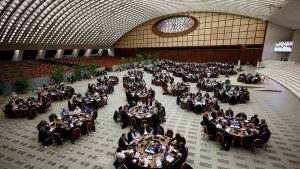 Cardinals Grech and Hollerich write to bishops across the world explaining the next stages of the synodal process in view of next year’s second and final session of the Synod of Bishops on synodality. The work of the Synod on synodality continues in view of the final session set for October 2024, and Churches are now called to reflect on the Synthesis Report published in October 2023, to promote further consultation and to prepare contributions for next year’s assembly. Bishops from across world have just received a document with instructions from the Secretariat of the Synod accompanied by a letter from Cardinals Mario Grech (the General Secretary) and Jean-Claude Hollerich (the Relator General). The four-page text first of all underscores the importance of the experience lived by those who took part in the first session of the Synod in October this year, recalling that “their account constitutes an inalienable part of the gift we have received, conveying the richness of an experience that no text can condense.” The synodal process will, therefore, continue along some lines of work, keeping in mind what Pope Francis said when he approved them that “the Synod is about synodality, and not about this or that theme”, and that the “important thing is how the reflection is done, that is, in a synodal way.” Topics to be discussed. Regarding the specific themes that have emerged so far, the document explains that some need to be considered at the level of the Universal Church and in collaboration with the Dicasteries of the Roman Curia. These matters include, for example, the preliminary study in view of the updating of the Code of Canon Law for the Latin Rite (CIC) and the Code of Canon Law for the Eastern Rites of the Church (CCEO); of the Ratio Fundamentalis on the formation of ordained ministers, of the document “Mutuae Relationes” on the mutual relations between bishops and religious in the Church; or the deepening of theological and pastoral research on the diaconate and specifically, on women’s admission to the diaconate. A list of these topics will be submitted to the Pope as the fruit of the Assembly of the Synod. Groups of experts from all the continents , along with the relevant Dicasteries of the Roman Curia, coordinated by the General Secretariat of the Synod will be asked to work ” in a synodal way” on the topics indicated by the Pope. A report on the progress of this work will be presented at the Synod. Focus on how to be a synodal Church in mission. Discussions in the next month will focus on the fundamental question of how to be a synodal Church in mission, with the aim to identify the paths to follow and the tools to adopt to “enhance the unique contribution of each baptised person and of each Church in the one mission of proclaiming the Risen Lord and his Gospel to the world today.” As the document clarifies, the process must, therefore, not be limited “to a plan of technical or procedural improvements to make the Church’s structures more efficient,” but rather be “a reflection on the concrete forms of the missionary commitment to which we are called, that express the dynamism between unity and diversity proper to a synodal Church.”….(More). Photo: Participants 2023 Synod of Bishops on synodality, Vat News 20231212
Cardinals Grech and Hollerich write to bishops across the world explaining the next stages of the synodal process in view of next year’s second and final session of the Synod of Bishops on synodality. The work of the Synod on synodality continues in view of the final session set for October 2024, and Churches are now called to reflect on the Synthesis Report published in October 2023, to promote further consultation and to prepare contributions for next year’s assembly. Bishops from across world have just received a document with instructions from the Secretariat of the Synod accompanied by a letter from Cardinals Mario Grech (the General Secretary) and Jean-Claude Hollerich (the Relator General). The four-page text first of all underscores the importance of the experience lived by those who took part in the first session of the Synod in October this year, recalling that “their account constitutes an inalienable part of the gift we have received, conveying the richness of an experience that no text can condense.” The synodal process will, therefore, continue along some lines of work, keeping in mind what Pope Francis said when he approved them that “the Synod is about synodality, and not about this or that theme”, and that the “important thing is how the reflection is done, that is, in a synodal way.” Topics to be discussed. Regarding the specific themes that have emerged so far, the document explains that some need to be considered at the level of the Universal Church and in collaboration with the Dicasteries of the Roman Curia. These matters include, for example, the preliminary study in view of the updating of the Code of Canon Law for the Latin Rite (CIC) and the Code of Canon Law for the Eastern Rites of the Church (CCEO); of the Ratio Fundamentalis on the formation of ordained ministers, of the document “Mutuae Relationes” on the mutual relations between bishops and religious in the Church; or the deepening of theological and pastoral research on the diaconate and specifically, on women’s admission to the diaconate. A list of these topics will be submitted to the Pope as the fruit of the Assembly of the Synod. Groups of experts from all the continents , along with the relevant Dicasteries of the Roman Curia, coordinated by the General Secretariat of the Synod will be asked to work ” in a synodal way” on the topics indicated by the Pope. A report on the progress of this work will be presented at the Synod. Focus on how to be a synodal Church in mission. Discussions in the next month will focus on the fundamental question of how to be a synodal Church in mission, with the aim to identify the paths to follow and the tools to adopt to “enhance the unique contribution of each baptised person and of each Church in the one mission of proclaiming the Risen Lord and his Gospel to the world today.” As the document clarifies, the process must, therefore, not be limited “to a plan of technical or procedural improvements to make the Church’s structures more efficient,” but rather be “a reflection on the concrete forms of the missionary commitment to which we are called, that express the dynamism between unity and diversity proper to a synodal Church.”….(More). Photo: Participants 2023 Synod of Bishops on synodality, Vat News 20231212
Voice question should have been split: Wyatt
Extract from 12 December 2023, CathNews, The Age, 12 December 2023
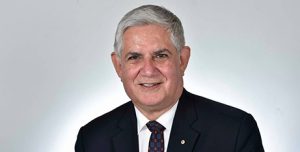 Former Indigenous affairs minister Ken Wyatt says the Voice referendum was too complicated and should have split out the question of recognition, as he called on National Cabinet to urgently focus on closing the gap. One of the key conservative supporters of the October referendum – which was rejected by 60 per cent of Australians and rapidly faded as a point of political debate – said many Indigenous Australians and their leaders were still grieving but he hoped deep frustration and rejection would lead to fresh ideas. National Cabinet and a new federal task force focused on failures to close the gap on Indigenous disadvantage should “bite the bullet and deal with the targets in a very concerted, pragmatic way,” Mr Wyatt said. Chief Voice proponents, including Noel Pearson, have not spoken publicly since the October 14 poll. Labor has not released new policies to reverse dire health, education and criminal justice statistics despite Indigenous Australians Minister Linda Burney hinting at new announcements on referendum night. Regional and local voices should have been legislated before a referendum to prove their value and operation, Mr Wyatt argued. He said it would be viewed as a historic shame that two separate questions were not asked: one on symbolic recognition in the Constitution of the unique status of First Australians and the other on the Indigenous advisory body to Parliament. While devastating Indigenous Australians, Mr Wyatt said the referendum had the positive effect of heightening awareness of Indigenous disadvantage and spawning the next generation of Indigenous leaders he said could enter Parliament…..(More) Photo: Ken Wyatt, Facebook Ken Wyatt
Former Indigenous affairs minister Ken Wyatt says the Voice referendum was too complicated and should have split out the question of recognition, as he called on National Cabinet to urgently focus on closing the gap. One of the key conservative supporters of the October referendum – which was rejected by 60 per cent of Australians and rapidly faded as a point of political debate – said many Indigenous Australians and their leaders were still grieving but he hoped deep frustration and rejection would lead to fresh ideas. National Cabinet and a new federal task force focused on failures to close the gap on Indigenous disadvantage should “bite the bullet and deal with the targets in a very concerted, pragmatic way,” Mr Wyatt said. Chief Voice proponents, including Noel Pearson, have not spoken publicly since the October 14 poll. Labor has not released new policies to reverse dire health, education and criminal justice statistics despite Indigenous Australians Minister Linda Burney hinting at new announcements on referendum night. Regional and local voices should have been legislated before a referendum to prove their value and operation, Mr Wyatt argued. He said it would be viewed as a historic shame that two separate questions were not asked: one on symbolic recognition in the Constitution of the unique status of First Australians and the other on the Indigenous advisory body to Parliament. While devastating Indigenous Australians, Mr Wyatt said the referendum had the positive effect of heightening awareness of Indigenous disadvantage and spawning the next generation of Indigenous leaders he said could enter Parliament…..(More) Photo: Ken Wyatt, Facebook Ken Wyatt
Australia ‘punched well above its weight’ at Synod of Bishops
Extract from CathNews, Christopher White. Source: NCR Online, 8 December 2023
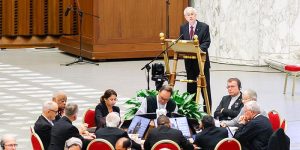
“Australia punched well above its weight,” Bishop Vincent Long OFM Conv told me last month during a visit to the country for a series of lectures sponsored by the Parramatta Diocese, Australian Catholic University, and Newman College, Melbourne. In July 2022, some 277 delegates from throughout the country gathered in Sydney for the second assembly of Australia’s Plenary Council. Both the style and the substance of that weeklong meeting would prove consequential for the global Church. Unlike past synods, the first session of Francis’ Synod on Synodality took place at roundtables, rather than utilising the stadium-style seating of the Vatican’s Synod hall. Cardinals and bishops sat shoulder to shoulder with lay people from around the world, who for the first time were also granted the right to vote in the Synod. No longer did Synod delegates spend hours listening to prepared remarks, where they could sit back and doze off or check emails. Instead, the month-long Synod opted for a new methodology known as “spiritual conversations” over three rounds. Prayer and meditation broke up each round, and the results of the roundtable discussions served as the basis for shaping the Synod’s final document. The origins and inspiration for all this? Australia’s Plenary Council, which utilised the same methodology and practices. In the end, Australia clocked in with a total of 13 synod participants in Rome, making it the third largest delegation just behind Italy and the US…..(More). Photo: Ormond Rush speaks at Synod of Bishops October 2023, CNS, Lola Gomez,
A mini-mirror image of the Global Synod
Extracts from Margaret Beirne RSC, Catholic Outlook, 8 December 2023
 In promulgating the first Diocesan of Parramatta Synod, Bishop Vincent LongOFM Conv, Bishop of Parramatta, proposed this ‘anchor question’: “In light of the call to become a more synodal Church, where is the Holy Spirit calling us to in the Diocese of Parramatta?”( Synod Directory 2023-2025, p.8). The call to listen deeply to what the Holy Spirit is saying to the Church has been faithfully woven through each stage of the Synodal process, culminating in the grace-filled Assembly from 13-15 October this year. This emphasis on listening to the Holy Spirit is echoed throughout the Scriptures. In the Gospel of John, Jesus assures his disciples on the evening before his crucifixion, that he will send “the Spirit of Truth who will teach them all things” (Jn 14:17). The Book of Revelation expands on this several times: “Let them hear what the Holy Spirit is saying to the churches” (Rev 2:7; 2:29; 3:22). To experience first-hand how thoroughly this core biblical teaching has been implemented in the Diocese of Parramatta has been, for me, a great grace; indeed, it was a privilege to be invited to participate. In a very real sense, the October assembly, although far removed physically from Rome, can truly be described as a mini-mirror image of what was taking place simultaneously at the global Synod on Synodality………..So how did this extraordinary event hold together and produce such a rich and rewarding experience for those present, and by extension for the thousands of people who had contributed so readily during the preparatory phase? Like the Assembly members, they were familiar with the process from the many sessions that had been part of the preparation since the convocation in March up to the actual Assembly in October…….(More). Photo: Diocesan Synod Delegates, CommBank Stadium, Parramatta, Parramatta Diocese 20231208
In promulgating the first Diocesan of Parramatta Synod, Bishop Vincent LongOFM Conv, Bishop of Parramatta, proposed this ‘anchor question’: “In light of the call to become a more synodal Church, where is the Holy Spirit calling us to in the Diocese of Parramatta?”( Synod Directory 2023-2025, p.8). The call to listen deeply to what the Holy Spirit is saying to the Church has been faithfully woven through each stage of the Synodal process, culminating in the grace-filled Assembly from 13-15 October this year. This emphasis on listening to the Holy Spirit is echoed throughout the Scriptures. In the Gospel of John, Jesus assures his disciples on the evening before his crucifixion, that he will send “the Spirit of Truth who will teach them all things” (Jn 14:17). The Book of Revelation expands on this several times: “Let them hear what the Holy Spirit is saying to the churches” (Rev 2:7; 2:29; 3:22). To experience first-hand how thoroughly this core biblical teaching has been implemented in the Diocese of Parramatta has been, for me, a great grace; indeed, it was a privilege to be invited to participate. In a very real sense, the October assembly, although far removed physically from Rome, can truly be described as a mini-mirror image of what was taking place simultaneously at the global Synod on Synodality………..So how did this extraordinary event hold together and produce such a rich and rewarding experience for those present, and by extension for the thousands of people who had contributed so readily during the preparatory phase? Like the Assembly members, they were familiar with the process from the many sessions that had been part of the preparation since the convocation in March up to the actual Assembly in October…….(More). Photo: Diocesan Synod Delegates, CommBank Stadium, Parramatta, Parramatta Diocese 20231208
Pope Francis says he wants a “less masculine” Church
Limited Extract from Loup Besmond de Senneville Vatican City, Subscription Journal La Croix International, 1 December 2023
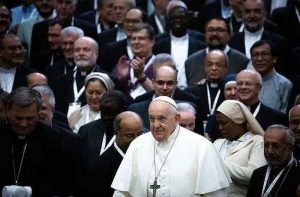 In a meeting with some of the world’s leading theologians, the Jesuit pope extolled the “feminine” character of the Church . Pope Francis has told members of the International Theological Commission (ITC) they need to do more to “help make the Church less masculine”. The pope, who is battling a nasty bout of bronchitis and is short of breath, began his meeting with the 28 members currently on the commission by handing them his prepared address. “There is a good address here dealing with theological matters,” he said. “But because of my health, it is better not to read it. ” That did not stop him from speaking, however. And in a frank manner, no less. “Theology, theological reflection, is very important,” he told the ITC members. “But there is something about you that I do not like,pardon my sincerity,” he added, as he looked over the group assembled before him. “One, two, three, four women: poor women! They are alone! Ah, excuse me, there are five,” he said. Francis, who is the one who actually chooses the theologians who are on the ITC, then spoke off-the-cuff for several minutes, expanding on remarks he’s made before regarding the “feminine” nature of the Church. The “Petrine” and “Marian” principles As he has already done on several occasions, Francis highlighted the “two principles” he distinguishes in the Church: the “Petrine” principle, in reference to the first of the Apostles, and the “Marian” principle, in reference to the mother of Jesus. The Jesuit pope said the first is a ministerial principle, and is therefore linked to the Church’s ministries. He said that it is because of the Petrine principle that only men can be priests. But he insisted that the Marian principle is more important. “The Marian is more important than the Petrine, because there is the bride Church, the woman Church, without being masculine,” said. The pope said this means we need more women theologians and a more feminized theology. “We must advance in this,” he said. “Women have a capacity for theological reflection that is different to that of us men.”……….(More). Photo: Pope Francis Feminine nature of Church, Tiziana Fabi AFP 2023
In a meeting with some of the world’s leading theologians, the Jesuit pope extolled the “feminine” character of the Church . Pope Francis has told members of the International Theological Commission (ITC) they need to do more to “help make the Church less masculine”. The pope, who is battling a nasty bout of bronchitis and is short of breath, began his meeting with the 28 members currently on the commission by handing them his prepared address. “There is a good address here dealing with theological matters,” he said. “But because of my health, it is better not to read it. ” That did not stop him from speaking, however. And in a frank manner, no less. “Theology, theological reflection, is very important,” he told the ITC members. “But there is something about you that I do not like,pardon my sincerity,” he added, as he looked over the group assembled before him. “One, two, three, four women: poor women! They are alone! Ah, excuse me, there are five,” he said. Francis, who is the one who actually chooses the theologians who are on the ITC, then spoke off-the-cuff for several minutes, expanding on remarks he’s made before regarding the “feminine” nature of the Church. The “Petrine” and “Marian” principles As he has already done on several occasions, Francis highlighted the “two principles” he distinguishes in the Church: the “Petrine” principle, in reference to the first of the Apostles, and the “Marian” principle, in reference to the mother of Jesus. The Jesuit pope said the first is a ministerial principle, and is therefore linked to the Church’s ministries. He said that it is because of the Petrine principle that only men can be priests. But he insisted that the Marian principle is more important. “The Marian is more important than the Petrine, because there is the bride Church, the woman Church, without being masculine,” said. The pope said this means we need more women theologians and a more feminized theology. “We must advance in this,” he said. “Women have a capacity for theological reflection that is different to that of us men.”……….(More). Photo: Pope Francis Feminine nature of Church, Tiziana Fabi AFP 2023
Canberra-Goulburn Roundtables a forum for discernment and discussion
Extract from CathNews, Catholic Voice, 30 November 2023
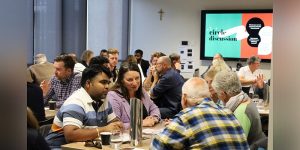 A series of roundtable sessions will provide an opportunity for Catholics in the Canberra-Goulburn Archdiocese to prayerfully discern where the Holy Spirit may be calling the community, according to evangelisation animator Huw Warmenhoven. “Each roundtable centres on a theme, identified as particularly important to the life and mission of the archdiocese,” Mr Warmenhoven said. “Each roundtable will include a time of gathering around some food, prayer, hearing and celebrating some leaders involved in that particular space before moving into a time of discussion and reflection in small groups.” Grounded in core themes from the Plenary Council and broader topics of synodal discernment, the roundtables hope to identify existing initiatives and opportunities for collaboration among parishes, communities, movements and ministries. These will also develop a foundation and inform both content and processes for the Archdiocesan Assembly in 2024. “Our first two roundtables are focused on ‘raising up a new generation through youth and young adult ministry’ and ‘celebrating the gift of our families’,” Mr Warmenhoven said. “These are designed to listen to the reality of youth, young adults and families in the life of the Church that will be important to highlight in our Archdiocesan Assembly in 2024. They will also help to guide our pastoral efforts at both an archdiocesan and parish level into next year and beyond.”………(More) Photo:Roundtable life and mission of Archdiocese, CathNews 20231130
A series of roundtable sessions will provide an opportunity for Catholics in the Canberra-Goulburn Archdiocese to prayerfully discern where the Holy Spirit may be calling the community, according to evangelisation animator Huw Warmenhoven. “Each roundtable centres on a theme, identified as particularly important to the life and mission of the archdiocese,” Mr Warmenhoven said. “Each roundtable will include a time of gathering around some food, prayer, hearing and celebrating some leaders involved in that particular space before moving into a time of discussion and reflection in small groups.” Grounded in core themes from the Plenary Council and broader topics of synodal discernment, the roundtables hope to identify existing initiatives and opportunities for collaboration among parishes, communities, movements and ministries. These will also develop a foundation and inform both content and processes for the Archdiocesan Assembly in 2024. “Our first two roundtables are focused on ‘raising up a new generation through youth and young adult ministry’ and ‘celebrating the gift of our families’,” Mr Warmenhoven said. “These are designed to listen to the reality of youth, young adults and families in the life of the Church that will be important to highlight in our Archdiocesan Assembly in 2024. They will also help to guide our pastoral efforts at both an archdiocesan and parish level into next year and beyond.”………(More) Photo:Roundtable life and mission of Archdiocese, CathNews 20231130
Association of U.S. Catholic Priests highlights similarities between Francis’ remarks and its position on Priestly Formation and Clericalism
Extract from Catholic Outlook, 29 November 2023
The largest group of U.S. Catholic priests has said that Pope Francis’ latest statements on priestly formation and clericalism resonates with its recommendation for a pastoral model of priestly formation.
Holy Cross Father Stephen P. Newton, executive director of the Association of U.S. Catholic Priests, has appreciated the pope’s synodal intervention when he referred to clericalism as a “scourge,” and its own 2018 recommendations for changes in priestly formation. The AUSCP which has around 1,200 priests among its ranks is the largest association of priests in the United States. It was founded in 2011 as a support group for priests who are inspired by the teaching of Second Vatican Council (1962-65) and its continued implementation and has become a “pastoral and collegial voice of member priests,” following the call of Pope Francis to synodality, open to the participation of all the members of the People of God. “Clericalism is a whip, it is a scourge”…….(More).
Franciscan bishop implements Jesuit pope’s synodal vision in Australia
More than 200 delegates participating in the first-ever synod for the Australian Diocese of Parramatta filed out of their opening Mass, they were discreetly given flyers by those questioning both the meeting and the bishop who had called it.
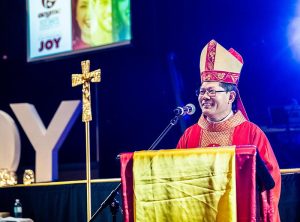 Extract from National Catholic Reporter, 28 November 2023
Extract from National Catholic Reporter, 28 November 2023
Since his installation as the head of the diocese in the western suburbs of Sydney in 2016, Bishop Vincent Long has ruffled more than a few feathers for his support of LGBTQ Catholics, his advocacy in support of the country’s recent referendum on Indigenous representation, and his own personal testimony of being a victim of clergy sexual abuse. For taking those stances, Long is unapologetic. “I try to follow Pope Francis’ lead by focusing on pastoral priorities such as a church that is more inclusive, participatory, open to the gifts of all members, especially women,” he told NCR on Nov. 8. “More aligned with the poor, the dispossessed and the marginalized, more in partnership with others, more engaged with the world not flight from or hostility against it.” To be clear, Long says he does not want to compare himself with the pope, but that he is simply trying to draw from what Francis is teaching and apply it in his own backyard. “The pope has had many critics both within and outside the church. I have my share. But I would not compare myself with him. … This comes with the territory,” he said. Long’s remarks came during an interview with NCR on the sidelines of the plenary meeting of the Australian Catholic Bishops’ Conference at Mary MacKillop Place in Sydney, and while this reporter was in the country for a series of lectures sponsored by the Parramatta Diocese, the La Salle Academy at Australian Catholic University, and Newman College, Melbourne. Like Francis, Long is somewhat of an outsider……(More). Photo: Bishop Vincent Long, Parramatta Diocese
The overwhelming case to restore women to ordained ministry alongside men as their equals. Extract from Miriam Duignan, The Tablet, 27 November 2023
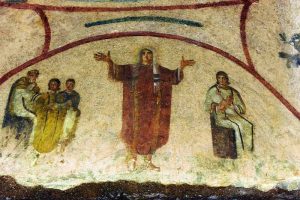 “We are still hopeful, but not particularly optimistic.” This was the response of the campaign group, Catholic Women’s Ordination, to the first synodal meeting in Rome. During the synodal process, Church leadership heard Catholics everywhere express a strong desire to see women recognised for their vocations to ministry and for the priestly work they do in parishes everywhere. In so many of our churches, it is women preparing families for baptisms, marriages and funerals and, in the absence of a male priest, they conduct Communion services on a Sunday. Women are chaplains in hospitals where they care for the sick and the dying, but must call for a male priest to administer the last rites or hear confession. This glaring and illogical injustice can no longer be ignored. And yet, the topic of women priests was banned at the Synod. Instead, after one month of discussions and constant edits, the summary document’s paragraph on the female diaconate (a question that was allowed) was a watered down, vague statement about the need for further study. If yet another study were to be taken up, this would be the third go-around in seven years to examine the case to restore the women’s diaconate. We have to ask, how much longer can this possibly take?……….(More). Photo:Fresco, woman priest, Priscilla Catacombs, Abaca Press Almy Live News,Tablet 20231127
“We are still hopeful, but not particularly optimistic.” This was the response of the campaign group, Catholic Women’s Ordination, to the first synodal meeting in Rome. During the synodal process, Church leadership heard Catholics everywhere express a strong desire to see women recognised for their vocations to ministry and for the priestly work they do in parishes everywhere. In so many of our churches, it is women preparing families for baptisms, marriages and funerals and, in the absence of a male priest, they conduct Communion services on a Sunday. Women are chaplains in hospitals where they care for the sick and the dying, but must call for a male priest to administer the last rites or hear confession. This glaring and illogical injustice can no longer be ignored. And yet, the topic of women priests was banned at the Synod. Instead, after one month of discussions and constant edits, the summary document’s paragraph on the female diaconate (a question that was allowed) was a watered down, vague statement about the need for further study. If yet another study were to be taken up, this would be the third go-around in seven years to examine the case to restore the women’s diaconate. We have to ask, how much longer can this possibly take?……….(More). Photo:Fresco, woman priest, Priscilla Catacombs, Abaca Press Almy Live News,Tablet 20231127
Comments on Synod on Synodality ‘Conversation’ at Sense of Faith Newman College Oratory 23 November 2023 Extracts from Fr Frank Brennan Homily (Solemnity of Christ The King), Catholic Outlook, 26 November 2023

One “particular grace” of the Fifth Plenary Council of Australia has been its encouragement of many initiatives in the Church across the country, according to a letter to the People of God prepared for the Solemnity of Christ the King. As the Church marks the end of the liturgical year this weekend, the letter provides an update on work carrying forward the Plenary Council’s outcomes while awaiting the Holy See’s formal recognition of the Council’s decrees………….During the week, the Sense of the Faithful group sponsored a discussion evening on the recent synod process.[2] Bishop Shane McKinlay and Ms Susan Pascoe, synod participants, were invited speakers who shared their reflections on the experience, as did Brother Mark O’Connor FMS who was an observer in Rome.[3] All three were upbeat about the process, reporting that a month of deep listening to hundreds of people with diverse views was an exhausting but rewarding experience. Bishop McKinlay had a box seat at the synod as he was one of the people selected to work on the 40-page Synthesis Report. They worked around the clock producing three editions of a document which included a thousand amendments…..(More). Photo:Jesus-sheep_Catholic Outlook 20231126
Church in Australia carrying forward its pursuit of synodality
Extract from CathNews, ACBC Media Blog, 24 November 2023
One “particular grace” of the Fifth Plenary Council of Australia has been its encouragement of many initiatives in the Church across the country, according to a letter to the People of God prepared for the Solemnity of Christ the King. As the Church marks the end of the liturgical year this weekend, the letter provides an update on work carrying forward the Plenary Council’s outcomes while awaiting the Holy See’s formal recognitio of the Council’s decrees. More than a dozen people – clergy, religious and laity – gathered in Sydney recently to provide a report on work undertaken since the Council’s conclusion in July 2022. Such a report had been called for in the Council’s decrees. The group’s members had been nominated by the Australian Catholic Bishops Conference, Catholic Religious Australia and the Association of Ministerial PJPs. They decided to offer the report in the format of a letter to the People of God. The report is linked HERE
Pope Francis’ inclusive stance resonates with transgender community
Extract from CathNews NZ, 23 November 2023.
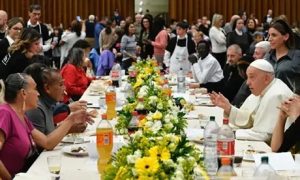
In a significant gesture towards inclusivity, Pope Francis extended a lunch invitation to a group of transgender individuals. The group, mostly Latin American migrants and often engaged in sex work, has received unprecedented support from the Vatican. Under the guidance of the local parish priest, Rev Andrea Conocchia, these women now attend Francis’ weekly audiences as VIP guests. Recently, the group joined over 1200 other underprivileged individuals as guests for a special lunch at the Vatican, commemorating the Catholic Church’s World Day of the Poor. For these marginalised women, these gestures signify a newfound sense of inclusion within a church that historically kept them at arm’s length. Transgenders feel more human. “Before, the church was closed to us. They didn’t see us as normal people. They saw us as the devil” said Andrea Paola Torres Lopez, a Colombian transgender woman. “Then Pope Francis arrived, and the doors of the church opened for us.” Claudia Victoria Salas, 55 and Carla Segovia, 46, both sew workers from Argentina, attended the lunch. To her surprise, Salas found herself seated at the main table opposite the pope – who of course is also Argentinian. “We transgenders here in Italy feel a bit more human because the fact that Pope Francis brings us closer to the Church is a beautiful thing” said Carla Segovia……(More). Photo: Pope-Francis-Transgender-
Pope intervenes in German Synodal Path plan
Extract from CathNews NZ, 23 November 2023
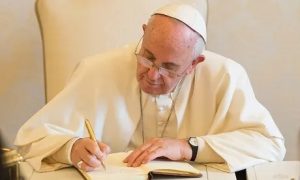
Pope Francis has written a letter about several proposals regarding the German Synodal Path and “the numerous concrete steps that are taking place”. On Tuesday this week German news outlet Die Welt published a copy of the letter which was addressed to four recipients. Those four are German women who resigned from the Synodal Path in February 2022. Theologians Professor Katharina Westerhorstmann and Professor Marianne Schlosser, philosopher Hanna-Barbara Gerl-Falkovitz and journalist Dorothea Schmidt said they objected to some of the Synodal Path’s conclusions and methods. The letter begins: “I extend my gratitude for your kind letter dated November 6. Your concerns regarding the current developments within the Church in Germany have reached me, and I share your concerns. There are indeed numerous steps being taken by significant segments of this local Church that threaten to steer it increasingly away from the universal Church’s common path. “This doubtlessly includes the establishment of the synodal committee you referenced” Francis wrote. The Synodal Path proposals. The noncanonical Synodal Path process concluded its initial stage in March……(More) Photo: Pope Francis writing letter CathNews NZ RNS 20231123
Theology, culture, and context
Pope Francis and the opening up of new sources for theological reflection
Limited Extract from J.P. Grayland, Germany, Subscription Journal La Croix International, 20 November 2023
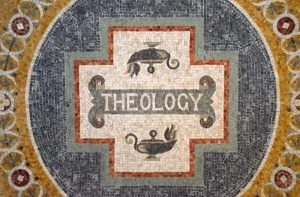
An “open”, “synodal” and “missionary” theology, free of “self-referent” structures of thinking can be dynamic and engaging. This is the basis of a transdisciplinary theological approach that is not afraid of contemporary physical, human and social sciences. It does not hide concepts of nature, humanity, society, justice and power that are more at home in the Middle Ages or the 19th century modernist controversies. Central to Francis’ theological shift is Romano Guardini, a prominent figure in the German Reform theological and liturgical movement of the late 19th and 20th centuries. Guardini’s emphasis on the importance of experience and context in theological reflection resonates with the pope’s vision of a Church deeply connected to the contemporary world and Francis’ writings reflect and reference Guardini’s thinking……(More). Image:Theology, Ted, Flickr.
‘Excuse me, Your Eminence, she has not finished speaking’
Extract from CathNews NZ, Phyllis Zagano, Religion News Service, 20 November 2023 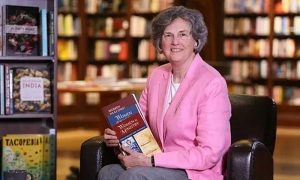
Without doubt, the best line to emanate from the Synod on Synoldality is “Excuse me, Your Eminence, she has not finished speaking.” That sums up the synod and the state of the Catholic Church’s attitude toward change. In October, hundreds of bishops, joined by lay men and women, priests, deacons, religious sisters and brothers met for nearly a month in Rome for the Synod on Synodality. At its end, the synod released a synthesis report brimming with the hope and the promise that the church would be a more listening church. Some 54 women voted at the synod. Back home, women are still ignored. Why? It is not because women quote the Second Vatican Council at parish council meetings. It is because too many bishops and pastors ignore parish councils. It is not because women of the world do not write to their pastors and bishops. It is because without large checks, their letters are ignored. The Synod on Synodality was groundbreaking in part because it was more about learning to listen. It was more about the process than about results. Its aim was to get the whole church on board with a new way of relating, of having “conversations in the Spirit,” where listening and prayer feed discernment and decision-making. Even now, the project faces roadblocks. At their November meeting this week in Baltimore, U.S. bishops heard presentations by Brownsville, Texas, Bishop Daniel Flores, who has led the two-year national synod process so far. His brother bishops did not look interested. To be fair, some bishops in some dioceses, in the U.S. and other parts of the world, are on board with Pope Francis’ attempt to encourage the church to accept the reforms of Vatican II, to listen to the people of God. But too many bishops are having none of it…….(More). Photo: Dr Phyllis Zaganao, Religion News Service
US bishops’ meeting a “big snooze”
Edited Opinion Piece from Michael Sean Winters, National Catholic Reporter, 17 November 2023
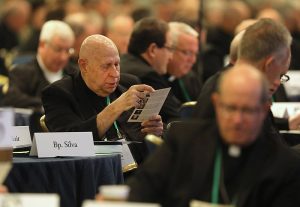
This year’s meeting of the United States Conference of Catholic Bishops was like no other. There was very little in the body’s deliberations that was newsworthy. Taken as a whole, the meeting demonstrated the sclerotic condition the U.S. hierarchy has created for itself. How bad is it? It’s not every day that a former general meddles in the internal politics of the Catholic Church. But if you needed any further confirmation that there is a group within the church that is completely unhinged, all the evidence needed came in a tweet this week from Michael Flynn, Donald Trump’s short-lived national security adviser and long-term conspiracy theorist, telling disgraced former nuncio Archbishop Carlo Maria Viganò and deposed Bishop Joseph Strickland to “Stand Your Ground!” MAGA world wasn’t content to storm the U.S. Capitol. It has broken into the realm of the sacred and defiled the temple. Those of us who subscribe to James Joyce’s “Here comes everybody” ecclesiology understand that the Catholic Church will include a range of cultural dispositions, social classes, intellectual and moral attitudes. But it is appalling that the brutish and unhinged quality of the MAGA-sphere has become pronounced in a church that calls itself “one, holy, catholic and apostolic.” Whatever the MAGA-sphere is, it is not one or holy or catholic or apostolic……(More). Photo: US Bishops pray during November session US Conference of Catholic Bishops, OSV News, Bob Roller.
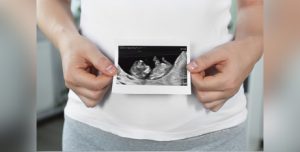
Abortion to be ‘preeminent priority’ in voting guide for US Catholic
Extract from CathNews, CNA, 17 November 2023
The United States bishops will continue to highlight the threat of abortion as a “preeminent priority” in the introduction to a guide they’ll disseminate to Catholic voters ahead of the 2024 election. That designation, the source of debate among some bishops in recent years, was retained when the bishops voted overwhelmingly (225-11, with seven abstentions) to approve a revised introduction to the guide, “Forming Consciences for Faithful Citizenship”, at their annual November assembly in Baltimore this week. The bishops also voted to approve several brief excerpts from the guide to be inserted in parish bulletins during the upcoming election cycle. “The threat of abortion remains our preeminent priority because it directly attacks our most vulnerable and voiceless brothers and sisters and destroys more than a million lives per year in our country alone,” the new introduction to the guide says. The new introduction also lists euthanasia, gun violence, terrorism, the death penalty, and human trafficking as “other grave threats to life and dignity of the human person.” The revised introduction also now states that the “redefinition of marriage and gender … threaten[s] the dignity of the human person.” In a press conference after the vote, Archbishop William Lori of Baltimore, vice president of the United States Conference of Catholic Bishops, said that while many issues are important, “not all issues are equal”. “We are called to stand in radical solidarity with women in difficult pregnancies and their unborn children and to provide them with the kind of support and services and public policies that they need,” he said. “So, it’s not simply a public policy issue. It is a deeply, deeply pastoral issue of loving the moms in need, walking with them, helping them bring their babies to term, and then providing them with what they need to move forward,” he said…..(More) Image:US bishops, Catholics called to stand in radical solidarity with women in difficult pregnancies and unborn children, Bigstock, CNA
Vatican ambassador urges US bishops to embrace synodality
Extracts from CathNews NZ, Vatican Correspondent, 16 November 2023 Cardinal Christophe Pierre has been apostolic nuncio to the United States since 2016 and, at Pope Francis’ request, he will continue in this role for the foreseeable future, he told America’s Vatican correspondent in an exclusive interview in Rome in early October……….When I asked how he read the apparent disconnect between many U.S. bishops and Pope Francis, the cardinal remarked, “This is something we have to dig a little deeper [to understand].” But, he said, “I would not concentrate on Francis so much because Francis is now seen as the big sinner by some. “There are some priests and religious and bishops who are terribly against Francis as if he was the scapegoat [for] all the failures of the church or of society.” “We are in the church at a change of epoch,” Cardinal Pierre said. “People don’t understand it. And this may be the reason why most of the young priests today dream about wearing the cassock and celebrating Mass in the traditional [pre-Vatican II] way.” “In some ways, they are lost in a society which has no security, and all of us when we feel lost look for some security,” he said. “But which kind of security?” The cardinal recalled that Pope Francis declared, “my security is Jesus.” He added, “It’s not the church that will protect me. It’s not the habit.”….(Source)
Francis calls Catholic theologians to a “cultural revolution”
Will the Church and its universities help promote the pope’s theological vision?
Limited Extract from Massimo Faggioli, Subscription Journal La Croix International, 16 November 2023.
The first session of the Synod of Bishops’ assembly on the future of the Church has brought to the surface the gap that exists between Pope Francis’ idea of synodality and how some Catholic theologians understand it – even those theologians that have enthusiastically welcomed his pontificate as a much-awaited turn in the orientation of Church teaching for a more dialogical relationship with the world and the “existential peripheries”. The Jesuit pope’s anti-elitism keeps a him at a safe distance from academic theologians. But, at times, he has issued important statements about theology’s role in the Church. Some notable examples include his letter in 2015 to the Grand Chancellor of the Catholic University of Argentina; his publication in 2017 of Veritatis Gaudium, the apostolic constitution on ecclesiastical universities and faculties; and his address in 2019 to the Pontifical Theological Faculty of Southern Italy. Three days after the conclusion of the Synod assembly’s first session, Francis also issued Ad theologiam promovendam, a “motu proprio” to approve the new statutes of the Pontifical Academy of Theology….(More)

The Hon. Anthony North KC appointed Yoorrook Commissioner
Extract from Yoorook Justice Commission, 31 January 2024
Former Federal Court Judge the Hon. Anthony North KC has been appointed as a Commissioner of Victoria’s formal truth telling process, the Yoorrook Justice Commission. Commissioner North has had a long and distinguished legal career. Commissioner North served as a judge of the Federal Court of Australia from 1995 to 2018. For the past four-and-a-half years he has been Chair of the Victorian Law Reform Commission (VLRC). During his time as a judge, Commissioner North’s main areas of work were cases about native title, refugee law, industrial law, and criminal appeals in the Australian Capital Territory Court of Appeal. In his role as Chair of the VLRC Commissioner North has consulted extensively with First Nations organisations and community members on issues of social justice. Chair of Yoorrook, Professor Eleanor Bourke said: “I welcome the appointment of Commissioner North to the Yoorrook Justice Commission. “This is a crucial period in the truth telling process. Yoorrook is undertaking concurrent inquiries into land, health, housing, education and economic, social and political life. Yoorrook will hold public hearings in the coming months and will complete its historic work by June 2025. “As a former judge with a long and illustrious legal career, Commissioner North will bring invaluable experience and insight to Yoorrook as we work to fulfil the Commission’s extensive mandate. I welcome Commissioner North and look forward to working with him.” Commissioner North said: “I am honoured to contribute to the historic work of the Yoorrook Justice Commission. I hope that my skills and experience will help advance its work: to tell the truth of our history. That truth is the foundation for community understanding, which is necessary so that we can move towards a more just society.”….(Source).
 Pope extends policy of detente with China
Pope extends policy of detente with China
Extract from CathNews, Crux, 31 January 2024
Several significant developments for the Catholic Church in China have occurred this week, including a bishop’s appointment and the establishment of a new diocese on the mainland for the first time since Mao’s Communist revolution. On Monday, the Vatican announced the suppression of the apostolic prefecture of Yiduxian and the establishment of the Weifang Diocese in a bid to “promote the pastoral care of the Lord’s flock and to attend more effectively to its spiritual good”. A Vatican statement said the decision to replace the Yiduxian prefecture with the Weifang Diocese was made in April 2023, and that at the same time, Bishop Anthony Sun Wenjun, 53, had been appointed to lead the diocese. Bishop Wenjun’s episcopal ordination took place on Monday in the cathedral of Christ the King in Qingzhou, the former headquarters for the Apostolic Prefecture of Yiduxian, in a ceremony led by Bishop John Fang Xingyao of Linyi, honorary president of the Chinese Catholic Patriotic Association, the state-sanctioned entity that governs the “official” Catholic church in China. The establishment of Weifang Diocese marks the first formal creation of a new diocese by the Holy See in China since the Communist revolution in 1949…..(More). Photo: Vatican announced establishment of new diocese and bishop consecration, Chinese Catholic Patriotic Association.
 Pope takes the “heresy hunters” to task
Pope takes the “heresy hunters” to task
Pope Francis challenges all of us with a poignant reflection on the Parable of the Good Samaritan at the conclusion of the eight-day Week of Prayer for Christian Unity.
Extract from Robert Mickens, Letter from Rome, La Croix International, 27 January 2024
The mainline Churches in the northern hemisphere have just concluded the Week of Prayer for Christian Unity. And by many of the comments that appeared on social media during the January 18-25 commemoration, it would seem that at least some English speakers who describe themselves as “traditional” or “loyal” Catholics saw this annual ecumenical event as a propitious time to remind Christians who are not in communion with the Church of Rome that they are heretics. Some of these “staunch” Catholics were particularly steamed that Pope Francis allowed the Archbishop of Canterbury, Dr. Justin Welby, and his fellow Anglicans to celebrate the Eucharist at St. Bartholomew’s on the (Tiber) Island in Rome. This is the 10th century church that John Paul II designated during Jubilee 2000 to be a shrine to the “new” Christian martyrs of the 20th and 21st centuries. The Catholic loyalists were quick to point out, sometimes in vulgar and insulting terms, that “Mr. Welby” (as most of them called him) and the other Anglican bishops and priests were not validly ordained. “A reminder that, per Leo XIII’s Apostolicae curae of 1896, Anglican orders are ‘absolutely null and utterly void’,” said a post on X (formerly Twitter) that was replicated in many variations, most of which are just too nasty and uncharitable to repeat here. The words “heretic” and “heresy” were also hurled mercilessly at non-Catholics over and over again — and they were aimed at the current pope, as well, sometimes quite explicitly……(More). Photo: Pope Francis, Johannes Neudecker, AP, dpa, La Croix
Same-Sex Blessing Conflict
Extract from J.A.Dick, Another Voice, 25 January 2024,
Catholic Church leaders in Africa and Central Asia prohibit the blessing of same-sex couples, despite recent Vatican approval. In fact, Catholic bishops in several countries have objected to the Vatican’s, and Pope Francis’, recent approval of blessings for same-sex couples, underscoring the divisiveness of the issue in the global Catholic Church. The Catholic bishops of Africa and Madagascar issued a unified statement refusing to follow the Vatican declaration allowing priests to offer blessings to same-sex couples and asserting that such unions are “contrary to the will of God.” The U.S. Conference of Catholic Bishops issued a brief statement focusing mostly on its assertion that same-sex couples remain ineligible for liturgical blessings and reiterating the church’s position that marriage is a union of a man with a woman. Some bishops in Germany and Belgium, however, have long defied the earlier Catholic Church ban on blessing same-sex unions, even going so far as to produce a rite of blessing for same-sex couples….(More)
 More signs of hope from the synod synthesis report
More signs of hope from the synod synthesis report
Extract from Thomas Groome, NCR Online, 21 December 2023
In a recent and typically fine essay, Tom Reese elaborated on “15 hidden gems in the synod on synodality report.” With this, Reese was inviting us to a second and more in-depth reading after the initial and mixed responses to “A Synodal Church in Mission,” the synthesis report issued promptly after the close of the XVI Ordinary General Assembly of the Synod of Bishops in Rome Oct 4-29. Note first that most see the move toward synodality as a renewed impetus for the vision of the Second Vatican Council (1962-65) as epitomized in Lumen Gentium, the Dogmatic Constitution on the Church. There, the council portrays the church as first a mystery and then “the people of God,” before reflecting on its “hierarchical structure” — in a sense, turning the church upside down from its hierarchical pyramid. Synodality now is the way forward that can engage the whole people of God as active agents of their faith, moving along together. Yet there was serious disappointment with the synod’s synthesis report on at least two crucial fronts: It did not endorse the ordination of women to the diaconate, and it made no explicit mention of full inclusion in the church for LGBTQ+ people. As a sign of hope, however, the report notes that while there was opposition, there was also a strong sentiment that admitting women to the diaconate would “restore the practice of the Early Church” and thus would be “faithful to the tradition.” This prompts the reasonable cry of “What are we waiting for?” Likewise, while it does not use the term LGBTQ+, the synthesis report repeatedly uses the word “welcome” as defining the imperative posture of the church toward all peoples. Pope Francis’ constant chant of “todos” is generally heard as highlighting a particular welcome for LGBTQ+ people. In his sermon on Sunday, Oct. 29, the day after this synod gathering closed, Francis called for — as he has so often — “a church with open doors that is a haven of mercy” for all…..(More). Photo: Assembly Synod of Bishops Pope Francis pray before working session Oct 16, CNS, Lola Gomez
 Archbishop Anthony Fisher OP: The courage of Cardinal Pell
Archbishop Anthony Fisher OP: The courage of Cardinal Pell
This is the edited text of the homily given by Archbishop Anthony Fisher OP at the Memorial Mass for George Cardinal Pell, St Mary’s Cathedral, Sydney, 10 January 2024.
Extract from Archbishop Anthony Fisher, Catholic weekly, 21 January 2024
Years ago, I was in a lift in Goold House, then the Archdiocese of Melbourne’s chancery building, when I overheard some officials discussing the translation of George Pell to Sydney. One remarked that his motto had been “Be not afraid” and wondered what his successor’s watchword would be. From the back of the lift I whispered, “Be very afraid!” The motto came, of course, from Christ, and was quoted by St John Paul the Great at his election. “Be not afraid,” Jesus tells His disciples repeatedly. “Let not your hearts be troubled: believe in God, believe also in me.” (Jn 14:1,27) With the Lord as my light and help, our Psalmist sang, whom shall I fear? (Ps 26:10) And as Paul said in our epistle, we should have the confidence of heirs, not the anxiety of slaves (Rom 8:14-23). George Pell was unafraid. In the inaugural Acton Lecture at the Centre for Independent Studies he argued that the Church’s task today is to teach and demonstrate that “true freedom requires truth and is the fruit of consistently striving for what is good.” Yet, as he knew very well, there are competing accounts of truth and goodness. There are many options open to us, some good, some less so, some plain evil. To know and care which is which and choose well between them requires an unwavering commitment to truth and consistent willing of the good. And these were marks of the man George Pell. In postmodernity it’s pick your own poison when it comes to the good. But the Cardinal was no relativist. Only a limited number of genuine goods constitute human flourishing and explain our rational choices: life and health, truth and beauty, friendship and family, work and leisure, integrity and religion. Each is self-evidently valuable, a divine perfection and a human need. We all seek them all, but most of us specialise in one or two for much of our lives. Doctors focus on life and health; teachers on knowledge; artists on beauty; and so on…….(More).. Photo: Archbishop Anthony Fisher, Cardinal George Pell tomb 10 January 2024, Patrick J Lee
 New poll finds Pope’s unfavorable rating among Americans at all-time high
New poll finds Pope’s unfavorable rating among Americans at all-time high
Extract from John Lavenburg, Mational Correspondent, Crux, 13 January 2024
NEW YORK – A new survey conducted this past December has found that while most American adults still have a favorable view of Pope Francis, the percentage that hold an unfavorable opinion of the pontiff has risen to a new ten-year high. The survey, conducted Dec. 1-20 by the Gallup organization, found that 58 percent of American adults overall have a favorable opinion of Francis, the same as when he became pope in 2013. However, over the same period, the percentage of American adults who have an unfavorable opinion of Francis has risen from 10 percent to a new high of 30 percent. The percentage of American adults who have not heard of, or hold no opinion of, the pontiff has also dropped from 31 percent in 2013 to 11 percent in the latest survey, the data shows. The survey data shows a similar trend among American Catholics as among American adults generally, in the sense of a rising level of unfavorable opinion. Perhaps unsurprisingly, given a polarized political environment in both Church and state, Francis’s favorability amongst self-described liberal American Catholics has increased since 2013, while his favorability among conservative American Catholics has declined…….(More). Photo: Pope Francis meeting then-Vice President Joe Biden, Andrew Medichini AP, Crux

Vatican doctrine official says celibacy should be optional for Catholic priests
Extract from Justin McLellan, National Catholic Reporter, 8 January 2024
The Catholic Church should revise its celibacy requirement for Latin-rite priests, a senior official in the Vatican’s doctrinal office said. “If it were up to me, I would revise the requirement that priest(s) have to be celibate,” said Archbishop Charles Scicluna of Malta, adjunct secretary of the Dicastery for the Doctrine of the Faith, in an interview with the Times of Malta released Jan. 7. “Experience has shown me this is something we need to seriously think about.” The archbishop said that the phenomenon of Catholic priests engaging in hidden, long-term sentimental relationships — something he said “happens everywhere” — is a “symptom” of priests “having to cope with” their celibacy requirement. He acknowledged that some priests father children in Malta and elsewhere. “We’re talking about priests around the world, so I think it happens in Malta as well,” he said. A man who feels called to the priesthood, “may mature, enter in relationships, love a woman, love another person, and they have to make a choice,” he said. “Right now, they have to make a choice.” The interview was conducted in Maltese, but the Times of Malta provided an English translation of his remarks in its story and in subtitles on the video clip it released. Scicluna said the Latin-rite church “should learn from the Catholic churches of the Oriental rite,” which have a tradition of married priests. In many of the 23 Eastern Catholic churches, men are allowed to get married prior to being ordained but cannot become bishops. Celibacy, Scicluna said, “was optional for the first millennium of the church’s existence, and it should become optional again.”….(More). Photo:Archbishop Charles Scicluna Malta CNS photo Paul Haring.

‘Catholicism in Numbers’: New data highlights the changing Catholic Church in Britain and Ireland
Extracts from Tim Kinnear, Catholic Herald, UK, 1 January 2024
A new set of pastoral statistics regarding the Catholic Church in England and Wales, Scotland and Ireland has been released by the Catholic Record Society (CRS). They are freely available from the CRS website under a new project titled “Catholicism in Numbers”. The project begins with data collated by myself, and which draws information from the Catholic Directory and other sources. The CRS are encouraging those with their own historical datasets to get in touch and contribute to this growing resource…………The statistics are illuminating when considered together. Ordinations have declined substantially (approximately 139 secular ordinations in England and Wales in 1960 and 32 in 2019) and there are fewer sisters in religious orders (around 11,428 in Ireland in 1991 and 4,887 in 2020). That said, the ministry of the permanent diaconate has grown with about 752 Permanent Deacons in England and Wales by 2010, up from 475 in 2000. Although fewer than the decline in Priests, the Permanent Deacons reflect a distinctive calling that will shape many Catholics’ experiences of ministry in their parish. With more Permanent Deacons and fewer parish sisters, this impacts the gender make-up of local ministry teams. And to whom do they minister? Statistics indicate more stability in the size of the Catholic population while Mass attendance has declined. So practice, if not identity, has changed, affecting the visibility and accessibility of Catholics to their local ministers. Meanwhile, the figures affirm the ongoing and distinctive contribution of Catholic schools as numerically very large sites of public witness (2,090 in England and 85 in Wales in 2022). Schools may connect those with no Catholic background to elements of the faith and social teaching, and form a substantial and visible role in the life of our nations. Does the Church’s public witness lead to baptism and reception into the faith? Well, see the figures……(Source). Photo:Changing Catholic Church, Britain, Ireland, Catholic Herald, Ian Forsyth, Getty Images 20240101
 Public Christian schools? Leonard Leo’s allies advance a new cause
Public Christian schools? Leonard Leo’s allies advance a new cause
A tight-knit group of activists tied to Leo’s nonprofit network are rallying around an Oklahoma effort to create a public Catholic school.
Extract from Heidi Przybyla, Politico, 29 December 2023
Groups aligned with the conservative legal movement and its financial architect, Leonard Leo, are working to promote a publicly funded Christian school in Oklahoma, hoping to create a test case to change the Supreme Court’s interpretation of the First Amendment’s separation of church and state. At issue is the Roman Catholic Archdiocese of Oklahoma’s push to create the St. Isidore of Seville Catholic Virtual School, which would be the nation’s first religious school entirely funded by taxpayers. The school received preliminary approval from the state’s charter school board in June. If it survives legal challenges, it would open the door for state legislatures across the country to direct taxpayer funding to the creation of Christian or other sectarian schools. Brett Farley, executive director of the Catholic Conference of Oklahoma, acknowledges that public funding of St. Isidore is at odds with over 150 years of Supreme Court decisions. He said the justices have misunderstood Thomas Jefferson’s intent when he said there should be a wall separating church and state, but that the current conservative-dominated court seems prepared to change course. “Jefferson didn’t mean that the government shouldn’t be giving public benefits to religious communities toward a common goal,” he said. “The court rightly over the last decade or so has been saying, ‘No, look, we’ve got this wrong and we’re gonna right the ship here.’ ”…….(More). Photo: POLITICO illustration by Emily Scherer, Photos AP, Getty Images, iStock 20231229

Hopeful pearls for peace
Extract from Frances Letters, Pearls and Irritations, 29 December 2023
Armidale, my hometown on the Northern Tablelands of NSW. Ever since then, on the last Saturday of each month, outside the old Courthouse in the centre of town a group of women have stood in silent WIB vigil. For peace. Gratefully we tune in to those Palestinian and Israeli women who are calmly refusing to sneer or snarl at one another. Or, of course, to even think of squinting down a gun barrel … It was involvement in Women in Black that first alerted me to my second pearl: Jewish Voice for Peace. Though not Jewish myself, years of supporting them have meant I’m privileged to be considered a member. JVP has always been passionate in demanding ‘solidarity with the Palestinian freedom struggle, guided by a vision of justice, equality, and dignity for all people’. “We fight for the liberation of all people. We believe that through organizing, we can and will dismantle the institutions and structures that sustain injustice and grow something new, joyful, beautiful, and life-sustaining in their place. We picture the return of Palestinian refugees, reuniting with their families and communities. We picture Palestinians — from the Jordan River to the Mediterranean Sea — living with their inalienable rights respected, building schools and hospitals and planting olive groves with the resources they need. We imagine Jewish Israelis joining Palestinians to build a just society, rooted in equality rather than supremacy, dignity rather than domination, democracy rather than dispossession — a society where every life is precious.” Who could honestly object to mild, gentle groups of WIB standing together in a vigil for peace? Or Jewish voices raised in a plea for harmony, brotherhood and sisterhood? Sadly, it’s obvious that neither longed-for goal has yet been achieved… So now for a far more unusual step towards the growth of a third pearl……(More). Photo:Peace, Pearls and Irritations, 20231229
The need for theological reform
Extracts from Michael Morwood, Pearls & Irritations, Dec 27, 2023

………In 1974, Karl Rahner, wrote “If we are honest, we must admit that we are to a terrifying extent a spiritually lifeless Church.” (The Shape of the Church to Come, p.82) Today we could add that the Church is not only spiritually lifeless but that it is also theologically lifeless. By continuing to insist as it does, that traditional doctrine is immutable, the Church will remain lifeless. The informal schism will continue. Voices that could bring church belief and practice alive again, as happened in the post-Vatican II era, are kept silent or remain underground. As long as bishops have the authority to silence sincere progressive thinkers on the grounds of infidelity to Church teaching as enshrined in The Catechism of the Catholic Church, the lethargy and lifelessness will persist. This present time offers an exhilarating opportunity for Christian theology. Encouraging theologians to dialogue and openly explore the theological implications of the “new story” of the universe would immediately breathe new and much-needed energy into theological conversation. What can be done?…..(More) Image: Scripture – Unsplash

Research captures a fractured, distrustful priesthood in America
Extract from John Lavenburg, Crux, 22 December 2023
NEW YORK – When asked to sum up the state of the American priesthood, Catholic University of America sociologist Brandon Vaidyanathan describes it as “fractured,” in that individually priests are doing well, but their assessment of the institutional Church “is not very good.” What’s more, research conducted by Vaidyanathan and others has found that not only is there a striking deficit in the trust priests feel in their bishop, but there’s also a significant generational mistrust priests have in each other that relates to differing theological and political alignments. “There’s a mutual distrust of each other that is driven by political differences, and so young priests view older priests with suspicion and vice versa,” Vaidyanathan told Crux. “The younger priests are more conservative, and don’t see the older priests as sort of a part of the same program.” The insight became apparent to Vaidyanathan and other researchers in an analysis of data compiled for “The National Survey of Catholic Priests,” which was published in October 2022 by CUA’s Catholic Project. The survey, the largest of American Catholic priests in over 50 years, got responses from 3,516 priests across 191 dioceses/eparchies. The survey also included interviews with more than 100 priests selected from respondents, and a census survey of U.S. bishops receiving 131 responses…..(More). Photo: Brandon Vaidyanathan study of US Catholic priests, Bob Roller, CNS, Crux 20231222
Pope Francis to Vatican officials: Ideology, rigidity prevents church from moving forward
Extract from Cristopher White, National Catholic Reporter, Vatican News, 21 December 2023

Pope Francis on Dec. 21 cautioned top Vatican officials against becoming rigid and obsessing over ideology, saying that such habits can prevent the Catholic Church from growing. “Fear, rigidity and monotony make for an immobility that has the apparent advantage of not creating problems…but lead us to wander aimlessly within our labyrinths, to the detriment of the service we are called to offer the church and the whole world,” said the pope. Francis offered the warning in his annual pre-Christmas address to the Roman Curia — the Vatican’s central bureaucracy — where he warned that rigid ideological positions, even if motivated by good intentions, can “separate us from reality and prevent us from moving forward.” His remarks come just three days after the Vatican’s doctrinal office released a landmark document, announcing there had been a “development” in the church’s understanding of blessings that now allows Catholic priests to bless couples in same-sex unions, and straight couples who have been divorced and remarried. The decision has been met with mixed reactions with some church leaders hailing it as progress, while others condemning it as inconsistent with the church’s long-standing teaching that marriage is a sacrament celebrated between one man and one woman. While the pope did not explicitly reference the Dec. 18 declaration from the Dicastery for the Doctrine of the Faith, Francis was adamant in his address that it was the duty of church officials to be attentive to the pastoral needs and realities of those whom they are tasked to serve……(More). Photo:Pope Francis Christmas Message 2023, CNS photo Lola Gomez
More signs of hope from the synod synthesis report
Extract from Opinion, Thomas Groome, National Catholic Reporter, 21 December 2023

In a recent and typically fine essay, Tom Reese elaborated on “15 hidden gems in the synod on synodality report.” With this, Reese was inviting us to a second and more in-depth reading after the initial and mixed responses to “A Synodal Church in Mission,” the synthesis report issued promptly after the close of the XVI Ordinary General Assembly of the Synod of Bishops in Rome Oct 4-29. Note first that most see the move toward synodality as a renewed impetus for the vision of the Second Vatican Council (1962-65) as epitomized in Lumen Gentium, the Dogmatic Constitution on the Church. There, the council portrays the church as first a mystery and then “the people of God,” before reflecting on its “hierarchical structure” — in a sense, turning the church upside down from its hierarchical pyramid. Synodality now is the way forward that can engage the whole people of God as active agents of their faith, moving along together. Yet there was serious disappointment with the synod’s synthesis report on at least two crucial fronts: It did not endorse the ordination of women to the diaconate, and it made no explicit mention of full inclusion in the church for LGBTQ+ people. As a sign of hope, however, the report notes that while there was opposition, there was also a strong sentiment that admitting women to the diaconate would “restore the practice of the Early Church” and thus would be “faithful to the tradition.” This prompts the reasonable cry of “What are we waiting for?” Likewise, while it does not use the term LGBTQ+, the synthesis report repeatedly uses the word “welcome” as defining the imperative posture of the church toward all peoples……(More). Photo: Members Assembly Synod of Bishops CNS Lola Gomez

Incomprehension in Africa after the authorization to bless same-sex couples
While African episcopates remain discreet for the time being, local priests and laypeople do not hesitate to express their incomprehension after the authorization given to priests to bless “couples in irregular situations and same-sex couples”
Limited extract from Guy Aimé Eblotié, Subscription Journal, La Croix International, 19 December 2023 |
“It’s been a while since we’ve been trying in vain to understand where the pope wants to lead the Church.” This statement from an African priest with more than three decades of priesthood, who wishes to remain anonymous, conveys both “his shock” and “his concerns” after reading the document Fiducia supplicans. Published December 18 by the Dicastery for the Doctrine of the Faith, this statement authorizes the blessing of “couples in irregular situations and same-sex couples” provided that it does not “create confusion with the blessing proper to the sacrament of marriage”. Immediately relayed by the press, this decision quickly became the center of conversations among African laypeople and priests, who are overwhelmingly opposed to this possibility. While the solicited episcopates have not yet responded, the faithful do not hesitate to express themselves. “How can this blessing lead these people towards conversion if the Church considers them to be in sin?”, asks François, an Ivorian Catholic. For him, “to open a blessing, whatever the form of the rite, is at least to comfort [these people] in a situation from which they are nevertheless called to leave”. He even considers that such a blessing could “promote this way of life as a couple.” In its statement, the Vatican, however, emphasizes that it is not about offering “a form of moral legitimacy to a union that presumes to be a marriage or to an extra-marital sexual practice”, but rather to grant a blessing to the person who “shows himself to be in need of God’s saving presence in his life”……(More). Photo: incomprehension-in-africa-after-the-authorization-to-bless-same-sex-couples-La Croix Int 20211219
Vatican shift on gay blessings has ‘deep pastoral implications,’ say theologians
Limited extract from by Aleja Hertzler-McCain, National Catholic Reporter, 19 December 2023

Theologians and LGBTQ+ advocates greeted with mixed emotions the unexpected Dec. 18 declaration from the Vatican’s doctrinal office that Catholic priests could bless same-sex couples, as well as divorced and remarried couples. “It’s a big, small step forward,” said Brian Flanagan, a gay Catholic theologian and senior fellow at New Ways Ministry, an LGBTQ+ Catholic advocacy organization. “Some of the headlines ran too far too fast because it’s a very specific and limited declaration,” Flanagan said. But he also said that the declaration has “deep pastoral implications for Catholics around the world, especially in places that currently don’t have civil same-gender marriage at all.” Brian Flanagan, a gay Catholic theologian and senior fellow at New Ways Ministry, said, “For those of us like me” who have the patience and privilege “to stick it out, I think we are helping the church to grow into what will seem normal in a few hundred years.” Flanagan emphasized “the number of people who might give their relationship to Christ and their relationship to the Church a second thought, a more open thought, who might feel welcome now in a church in a way they would not have otherwise.” He continued, “I think it’s a huge move.”…..(More). Photo: Fr Christian Olding blesses gay couple in Church of St. Martin in Geldern, Germany, OSV News KNA Rudolf Wichert.
New SA document aims to bring parishes and schools closer together
Extracts from CathNews, The Southern Cross, 13 December 2023
 A document that provides a framework to support positive relationships between Adelaide parishes and Catholic school communities has been officially launched. More than 200 Catholic school principals, assistant principals, parish priests, parish pastoral council chairs, Catholic Education SA and archdiocesan leaders, together with parishioners from around the state, gathered at the Vietnamese Catholic Community in Pooraka on November 17 for an information session on “Being Church Together”. There have been several iterations of the document since the first working draft was penned in 2018 following visitations to parishes and schools as part of the archdiocesan renewal program. The current offering was produced by the archdiocese’s pastoral services team following consultation with Catholic Education SA leaders and the Port Pirie Diocese. The 2023 version reflects the developments in the local, national and global Church – particularly synodality – and draws on real-life experiences of parishes and schools across South Australia. It includes a section on “activating principles for good practice” in which communities are encouraged to reflect on their current realities, imagine a vision for the future, and discern strategies for action. In launching the document (HERE), Adelaide Archbishop Patrick O’Regan spoke of his experience attending the Synod on Syndodality in Rome in October and the unique offering of Catholic education in Australia. He said it was important there was a strong relationship between parishes and school communities. “I’m delighted that we have such a wonderful document. This is an indication of where we are going, this is not only the roadmap but the vehicle by which we can travel – but we travel together on the way,” he said. …..(Source)
A document that provides a framework to support positive relationships between Adelaide parishes and Catholic school communities has been officially launched. More than 200 Catholic school principals, assistant principals, parish priests, parish pastoral council chairs, Catholic Education SA and archdiocesan leaders, together with parishioners from around the state, gathered at the Vietnamese Catholic Community in Pooraka on November 17 for an information session on “Being Church Together”. There have been several iterations of the document since the first working draft was penned in 2018 following visitations to parishes and schools as part of the archdiocesan renewal program. The current offering was produced by the archdiocese’s pastoral services team following consultation with Catholic Education SA leaders and the Port Pirie Diocese. The 2023 version reflects the developments in the local, national and global Church – particularly synodality – and draws on real-life experiences of parishes and schools across South Australia. It includes a section on “activating principles for good practice” in which communities are encouraged to reflect on their current realities, imagine a vision for the future, and discern strategies for action. In launching the document (HERE), Adelaide Archbishop Patrick O’Regan spoke of his experience attending the Synod on Syndodality in Rome in October and the unique offering of Catholic education in Australia. He said it was important there was a strong relationship between parishes and school communities. “I’m delighted that we have such a wonderful document. This is an indication of where we are going, this is not only the roadmap but the vehicle by which we can travel – but we travel together on the way,” he said. …..(Source)
Pope’s response to U.S. Catholic conservatism. Francis, Strickland & Burke
Limited Extracts from Massimo Faggioli, Commonweal, 12 December 2023
 The year-long break between the first and second assemblies of the Synod on Synodality began with Pope Francis disciplining two of his most outspoken critics. First, he removed Bishop Joseph Strickland as head of the Tyler, Texas, diocese; days later, he reportedly ousted Cardinal Raymond Leo Burke from his Vatican-subsidized apartment and took away the salary Burke was receiving as a retired cardinal. As a procedural matter, the Strickland decision was a straightforward instance of following the measures the Church provides—in this case, an apostolic visitation—concerning the right of the people of God to be governed by the pastor of the diocese, and for ensuring the respect for all those, including clergy, under a diocesan bishop’s jurisdiction. Burke’s case is different, and it says something more about this phase of Francis’s pontificate. No matter one’s opinion about Burke’s theology or the company he keeps, the way his punishment was handled and communicated via non-institutional channels speaks clearly to how Francis thinks about the college of cardinals and the dignity of the title of “cardinal” itself. Francis tried to eliminate the papal court by moving out of the papal apartment to live in Santa Marta, but at the same time he weakened intermediate bodies, especially the college of cardinals and the secretariat of state. A case in point is the story of Cardinal Giovanni Angelo Becciu, who was the second-ranking official in the Vatican’s Secretariat of State when dismissed by Francis in September 2020 while at the center of a landmark financial crimes trial; the following April, Francis eliminated the right of all cardinals to be judged by the pope. Since the start of Becciu’s trial, Francis has also published the reform constitution of the Roman Curia (March 2022) and the new Constitution for the Vatican City State (May 2023), which have augmented papal powers at the expense of other ecclesiastical bodies. Even if the pope has power that is “supreme, full, immediate and universal,” it’s not absolute; that is, the pope is subject to the supremacy of divine natural and positive law. And certain uses of papal power can backfire. Burke, the former prefect of the Segnatura and archbishop emeritus of St. Louis, receives generous financial support from allies in the United States; a possible unintended consequence of Francis’s punishment may be to empower Burke in the way the “crown cardinals” of the early modern era were. And Burke remains a cardinal, retaining the right to participate in a conclave until he reaches the age of eighty, on June 30, 2028……….The 1960s have long been seen as a decisive decade in terms of Christianity’s encounter with secular and pluralistic modernity. In terms of secular modernity’s impact on relations among different Christian traditions, the 1990s—with the explosion of the culture wars—were crucial. Now, just over a decade into Francis’s papacy, we have transitioned into a global Christianity that is more reflective of the Southern hemisphere, and in the United States, a Catholicism and Protestantism that is, to be blunt, less “white” and less “male.” It’s hard not to see Strickland and what he represents as a reaction to this new demographic reality…..(Source). Photo: Cardinal Burke Rome October 2023, CNS photo Lola Gomez.
The year-long break between the first and second assemblies of the Synod on Synodality began with Pope Francis disciplining two of his most outspoken critics. First, he removed Bishop Joseph Strickland as head of the Tyler, Texas, diocese; days later, he reportedly ousted Cardinal Raymond Leo Burke from his Vatican-subsidized apartment and took away the salary Burke was receiving as a retired cardinal. As a procedural matter, the Strickland decision was a straightforward instance of following the measures the Church provides—in this case, an apostolic visitation—concerning the right of the people of God to be governed by the pastor of the diocese, and for ensuring the respect for all those, including clergy, under a diocesan bishop’s jurisdiction. Burke’s case is different, and it says something more about this phase of Francis’s pontificate. No matter one’s opinion about Burke’s theology or the company he keeps, the way his punishment was handled and communicated via non-institutional channels speaks clearly to how Francis thinks about the college of cardinals and the dignity of the title of “cardinal” itself. Francis tried to eliminate the papal court by moving out of the papal apartment to live in Santa Marta, but at the same time he weakened intermediate bodies, especially the college of cardinals and the secretariat of state. A case in point is the story of Cardinal Giovanni Angelo Becciu, who was the second-ranking official in the Vatican’s Secretariat of State when dismissed by Francis in September 2020 while at the center of a landmark financial crimes trial; the following April, Francis eliminated the right of all cardinals to be judged by the pope. Since the start of Becciu’s trial, Francis has also published the reform constitution of the Roman Curia (March 2022) and the new Constitution for the Vatican City State (May 2023), which have augmented papal powers at the expense of other ecclesiastical bodies. Even if the pope has power that is “supreme, full, immediate and universal,” it’s not absolute; that is, the pope is subject to the supremacy of divine natural and positive law. And certain uses of papal power can backfire. Burke, the former prefect of the Segnatura and archbishop emeritus of St. Louis, receives generous financial support from allies in the United States; a possible unintended consequence of Francis’s punishment may be to empower Burke in the way the “crown cardinals” of the early modern era were. And Burke remains a cardinal, retaining the right to participate in a conclave until he reaches the age of eighty, on June 30, 2028……….The 1960s have long been seen as a decisive decade in terms of Christianity’s encounter with secular and pluralistic modernity. In terms of secular modernity’s impact on relations among different Christian traditions, the 1990s—with the explosion of the culture wars—were crucial. Now, just over a decade into Francis’s papacy, we have transitioned into a global Christianity that is more reflective of the Southern hemisphere, and in the United States, a Catholicism and Protestantism that is, to be blunt, less “white” and less “male.” It’s hard not to see Strickland and what he represents as a reaction to this new demographic reality…..(Source). Photo: Cardinal Burke Rome October 2023, CNS photo Lola Gomez.
Preparing for Synod 2024: Towards a synodal and missionary Church
Extract from Vatican News, 12 December 2023
 Cardinals Grech and Hollerich write to bishops across the world explaining the next stages of the synodal process in view of next year’s second and final session of the Synod of Bishops on synodality. The work of the Synod on synodality continues in view of the final session set for October 2024, and Churches are now called to reflect on the Synthesis Report published in October 2023, to promote further consultation and to prepare contributions for next year’s assembly. Bishops from across world have just received a document with instructions from the Secretariat of the Synod accompanied by a letter from Cardinals Mario Grech (the General Secretary) and Jean-Claude Hollerich (the Relator General). The four-page text first of all underscores the importance of the experience lived by those who took part in the first session of the Synod in October this year, recalling that “their account constitutes an inalienable part of the gift we have received, conveying the richness of an experience that no text can condense.” The synodal process will, therefore, continue along some lines of work, keeping in mind what Pope Francis said when he approved them that “the Synod is about synodality, and not about this or that theme”, and that the “important thing is how the reflection is done, that is, in a synodal way.” Topics to be discussed. Regarding the specific themes that have emerged so far, the document explains that some need to be considered at the level of the Universal Church and in collaboration with the Dicasteries of the Roman Curia. These matters include, for example, the preliminary study in view of the updating of the Code of Canon Law for the Latin Rite (CIC) and the Code of Canon Law for the Eastern Rites of the Church (CCEO); of the Ratio Fundamentalis on the formation of ordained ministers, of the document “Mutuae Relationes” on the mutual relations between bishops and religious in the Church; or the deepening of theological and pastoral research on the diaconate and specifically, on women’s admission to the diaconate. A list of these topics will be submitted to the Pope as the fruit of the Assembly of the Synod. Groups of experts from all the continents , along with the relevant Dicasteries of the Roman Curia, coordinated by the General Secretariat of the Synod will be asked to work ” in a synodal way” on the topics indicated by the Pope. A report on the progress of this work will be presented at the Synod. Focus on how to be a synodal Church in mission. Discussions in the next month will focus on the fundamental question of how to be a synodal Church in mission, with the aim to identify the paths to follow and the tools to adopt to “enhance the unique contribution of each baptised person and of each Church in the one mission of proclaiming the Risen Lord and his Gospel to the world today.” As the document clarifies, the process must, therefore, not be limited “to a plan of technical or procedural improvements to make the Church’s structures more efficient,” but rather be “a reflection on the concrete forms of the missionary commitment to which we are called, that express the dynamism between unity and diversity proper to a synodal Church.”….(More). Photo: Participants 2023 Synod of Bishops on synodality, Vat News 20231212
Cardinals Grech and Hollerich write to bishops across the world explaining the next stages of the synodal process in view of next year’s second and final session of the Synod of Bishops on synodality. The work of the Synod on synodality continues in view of the final session set for October 2024, and Churches are now called to reflect on the Synthesis Report published in October 2023, to promote further consultation and to prepare contributions for next year’s assembly. Bishops from across world have just received a document with instructions from the Secretariat of the Synod accompanied by a letter from Cardinals Mario Grech (the General Secretary) and Jean-Claude Hollerich (the Relator General). The four-page text first of all underscores the importance of the experience lived by those who took part in the first session of the Synod in October this year, recalling that “their account constitutes an inalienable part of the gift we have received, conveying the richness of an experience that no text can condense.” The synodal process will, therefore, continue along some lines of work, keeping in mind what Pope Francis said when he approved them that “the Synod is about synodality, and not about this or that theme”, and that the “important thing is how the reflection is done, that is, in a synodal way.” Topics to be discussed. Regarding the specific themes that have emerged so far, the document explains that some need to be considered at the level of the Universal Church and in collaboration with the Dicasteries of the Roman Curia. These matters include, for example, the preliminary study in view of the updating of the Code of Canon Law for the Latin Rite (CIC) and the Code of Canon Law for the Eastern Rites of the Church (CCEO); of the Ratio Fundamentalis on the formation of ordained ministers, of the document “Mutuae Relationes” on the mutual relations between bishops and religious in the Church; or the deepening of theological and pastoral research on the diaconate and specifically, on women’s admission to the diaconate. A list of these topics will be submitted to the Pope as the fruit of the Assembly of the Synod. Groups of experts from all the continents , along with the relevant Dicasteries of the Roman Curia, coordinated by the General Secretariat of the Synod will be asked to work ” in a synodal way” on the topics indicated by the Pope. A report on the progress of this work will be presented at the Synod. Focus on how to be a synodal Church in mission. Discussions in the next month will focus on the fundamental question of how to be a synodal Church in mission, with the aim to identify the paths to follow and the tools to adopt to “enhance the unique contribution of each baptised person and of each Church in the one mission of proclaiming the Risen Lord and his Gospel to the world today.” As the document clarifies, the process must, therefore, not be limited “to a plan of technical or procedural improvements to make the Church’s structures more efficient,” but rather be “a reflection on the concrete forms of the missionary commitment to which we are called, that express the dynamism between unity and diversity proper to a synodal Church.”….(More). Photo: Participants 2023 Synod of Bishops on synodality, Vat News 20231212
Voice question should have been split: Wyatt
Extract from 12 December 2023, CathNews, The Age, 12 December 2023
 Former Indigenous affairs minister Ken Wyatt says the Voice referendum was too complicated and should have split out the question of recognition, as he called on National Cabinet to urgently focus on closing the gap. One of the key conservative supporters of the October referendum – which was rejected by 60 per cent of Australians and rapidly faded as a point of political debate – said many Indigenous Australians and their leaders were still grieving but he hoped deep frustration and rejection would lead to fresh ideas. National Cabinet and a new federal task force focused on failures to close the gap on Indigenous disadvantage should “bite the bullet and deal with the targets in a very concerted, pragmatic way,” Mr Wyatt said. Chief Voice proponents, including Noel Pearson, have not spoken publicly since the October 14 poll. Labor has not released new policies to reverse dire health, education and criminal justice statistics despite Indigenous Australians Minister Linda Burney hinting at new announcements on referendum night. Regional and local voices should have been legislated before a referendum to prove their value and operation, Mr Wyatt argued. He said it would be viewed as a historic shame that two separate questions were not asked: one on symbolic recognition in the Constitution of the unique status of First Australians and the other on the Indigenous advisory body to Parliament. While devastating Indigenous Australians, Mr Wyatt said the referendum had the positive effect of heightening awareness of Indigenous disadvantage and spawning the next generation of Indigenous leaders he said could enter Parliament…..(More) Photo: Ken Wyatt, Facebook Ken Wyatt
Former Indigenous affairs minister Ken Wyatt says the Voice referendum was too complicated and should have split out the question of recognition, as he called on National Cabinet to urgently focus on closing the gap. One of the key conservative supporters of the October referendum – which was rejected by 60 per cent of Australians and rapidly faded as a point of political debate – said many Indigenous Australians and their leaders were still grieving but he hoped deep frustration and rejection would lead to fresh ideas. National Cabinet and a new federal task force focused on failures to close the gap on Indigenous disadvantage should “bite the bullet and deal with the targets in a very concerted, pragmatic way,” Mr Wyatt said. Chief Voice proponents, including Noel Pearson, have not spoken publicly since the October 14 poll. Labor has not released new policies to reverse dire health, education and criminal justice statistics despite Indigenous Australians Minister Linda Burney hinting at new announcements on referendum night. Regional and local voices should have been legislated before a referendum to prove their value and operation, Mr Wyatt argued. He said it would be viewed as a historic shame that two separate questions were not asked: one on symbolic recognition in the Constitution of the unique status of First Australians and the other on the Indigenous advisory body to Parliament. While devastating Indigenous Australians, Mr Wyatt said the referendum had the positive effect of heightening awareness of Indigenous disadvantage and spawning the next generation of Indigenous leaders he said could enter Parliament…..(More) Photo: Ken Wyatt, Facebook Ken Wyatt
Australia ‘punched well above its weight’ at Synod of Bishops
Extract from CathNews, Christopher White. Source: NCR Online, 8 December 2023

“Australia punched well above its weight,” Bishop Vincent Long OFM Conv told me last month during a visit to the country for a series of lectures sponsored by the Parramatta Diocese, Australian Catholic University, and Newman College, Melbourne. In July 2022, some 277 delegates from throughout the country gathered in Sydney for the second assembly of Australia’s Plenary Council. Both the style and the substance of that weeklong meeting would prove consequential for the global Church. Unlike past synods, the first session of Francis’ Synod on Synodality took place at roundtables, rather than utilising the stadium-style seating of the Vatican’s Synod hall. Cardinals and bishops sat shoulder to shoulder with lay people from around the world, who for the first time were also granted the right to vote in the Synod. No longer did Synod delegates spend hours listening to prepared remarks, where they could sit back and doze off or check emails. Instead, the month-long Synod opted for a new methodology known as “spiritual conversations” over three rounds. Prayer and meditation broke up each round, and the results of the roundtable discussions served as the basis for shaping the Synod’s final document. The origins and inspiration for all this? Australia’s Plenary Council, which utilised the same methodology and practices. In the end, Australia clocked in with a total of 13 synod participants in Rome, making it the third largest delegation just behind Italy and the US…..(More). Photo: Ormond Rush speaks at Synod of Bishops October 2023, CNS, Lola Gomez,
A mini-mirror image of the Global Synod
Extracts from Margaret Beirne RSC, Catholic Outlook, 8 December 2023
 In promulgating the first Diocesan of Parramatta Synod, Bishop Vincent LongOFM Conv, Bishop of Parramatta, proposed this ‘anchor question’: “In light of the call to become a more synodal Church, where is the Holy Spirit calling us to in the Diocese of Parramatta?”( Synod Directory 2023-2025, p.8). The call to listen deeply to what the Holy Spirit is saying to the Church has been faithfully woven through each stage of the Synodal process, culminating in the grace-filled Assembly from 13-15 October this year. This emphasis on listening to the Holy Spirit is echoed throughout the Scriptures. In the Gospel of John, Jesus assures his disciples on the evening before his crucifixion, that he will send “the Spirit of Truth who will teach them all things” (Jn 14:17). The Book of Revelation expands on this several times: “Let them hear what the Holy Spirit is saying to the churches” (Rev 2:7; 2:29; 3:22). To experience first-hand how thoroughly this core biblical teaching has been implemented in the Diocese of Parramatta has been, for me, a great grace; indeed, it was a privilege to be invited to participate. In a very real sense, the October assembly, although far removed physically from Rome, can truly be described as a mini-mirror image of what was taking place simultaneously at the global Synod on Synodality………..So how did this extraordinary event hold together and produce such a rich and rewarding experience for those present, and by extension for the thousands of people who had contributed so readily during the preparatory phase? Like the Assembly members, they were familiar with the process from the many sessions that had been part of the preparation since the convocation in March up to the actual Assembly in October…….(More). Photo: Diocesan Synod Delegates, CommBank Stadium, Parramatta, Parramatta Diocese 20231208
In promulgating the first Diocesan of Parramatta Synod, Bishop Vincent LongOFM Conv, Bishop of Parramatta, proposed this ‘anchor question’: “In light of the call to become a more synodal Church, where is the Holy Spirit calling us to in the Diocese of Parramatta?”( Synod Directory 2023-2025, p.8). The call to listen deeply to what the Holy Spirit is saying to the Church has been faithfully woven through each stage of the Synodal process, culminating in the grace-filled Assembly from 13-15 October this year. This emphasis on listening to the Holy Spirit is echoed throughout the Scriptures. In the Gospel of John, Jesus assures his disciples on the evening before his crucifixion, that he will send “the Spirit of Truth who will teach them all things” (Jn 14:17). The Book of Revelation expands on this several times: “Let them hear what the Holy Spirit is saying to the churches” (Rev 2:7; 2:29; 3:22). To experience first-hand how thoroughly this core biblical teaching has been implemented in the Diocese of Parramatta has been, for me, a great grace; indeed, it was a privilege to be invited to participate. In a very real sense, the October assembly, although far removed physically from Rome, can truly be described as a mini-mirror image of what was taking place simultaneously at the global Synod on Synodality………..So how did this extraordinary event hold together and produce such a rich and rewarding experience for those present, and by extension for the thousands of people who had contributed so readily during the preparatory phase? Like the Assembly members, they were familiar with the process from the many sessions that had been part of the preparation since the convocation in March up to the actual Assembly in October…….(More). Photo: Diocesan Synod Delegates, CommBank Stadium, Parramatta, Parramatta Diocese 20231208
Pope Francis says he wants a “less masculine” Church
Limited Extract from Loup Besmond de Senneville Vatican City, Subscription Journal La Croix International, 1 December 2023
 In a meeting with some of the world’s leading theologians, the Jesuit pope extolled the “feminine” character of the Church . Pope Francis has told members of the International Theological Commission (ITC) they need to do more to “help make the Church less masculine”. The pope, who is battling a nasty bout of bronchitis and is short of breath, began his meeting with the 28 members currently on the commission by handing them his prepared address. “There is a good address here dealing with theological matters,” he said. “But because of my health, it is better not to read it. ” That did not stop him from speaking, however. And in a frank manner, no less. “Theology, theological reflection, is very important,” he told the ITC members. “But there is something about you that I do not like,pardon my sincerity,” he added, as he looked over the group assembled before him. “One, two, three, four women: poor women! They are alone! Ah, excuse me, there are five,” he said. Francis, who is the one who actually chooses the theologians who are on the ITC, then spoke off-the-cuff for several minutes, expanding on remarks he’s made before regarding the “feminine” nature of the Church. The “Petrine” and “Marian” principles As he has already done on several occasions, Francis highlighted the “two principles” he distinguishes in the Church: the “Petrine” principle, in reference to the first of the Apostles, and the “Marian” principle, in reference to the mother of Jesus. The Jesuit pope said the first is a ministerial principle, and is therefore linked to the Church’s ministries. He said that it is because of the Petrine principle that only men can be priests. But he insisted that the Marian principle is more important. “The Marian is more important than the Petrine, because there is the bride Church, the woman Church, without being masculine,” said. The pope said this means we need more women theologians and a more feminized theology. “We must advance in this,” he said. “Women have a capacity for theological reflection that is different to that of us men.”……….(More). Photo: Pope Francis Feminine nature of Church, Tiziana Fabi AFP 2023
In a meeting with some of the world’s leading theologians, the Jesuit pope extolled the “feminine” character of the Church . Pope Francis has told members of the International Theological Commission (ITC) they need to do more to “help make the Church less masculine”. The pope, who is battling a nasty bout of bronchitis and is short of breath, began his meeting with the 28 members currently on the commission by handing them his prepared address. “There is a good address here dealing with theological matters,” he said. “But because of my health, it is better not to read it. ” That did not stop him from speaking, however. And in a frank manner, no less. “Theology, theological reflection, is very important,” he told the ITC members. “But there is something about you that I do not like,pardon my sincerity,” he added, as he looked over the group assembled before him. “One, two, three, four women: poor women! They are alone! Ah, excuse me, there are five,” he said. Francis, who is the one who actually chooses the theologians who are on the ITC, then spoke off-the-cuff for several minutes, expanding on remarks he’s made before regarding the “feminine” nature of the Church. The “Petrine” and “Marian” principles As he has already done on several occasions, Francis highlighted the “two principles” he distinguishes in the Church: the “Petrine” principle, in reference to the first of the Apostles, and the “Marian” principle, in reference to the mother of Jesus. The Jesuit pope said the first is a ministerial principle, and is therefore linked to the Church’s ministries. He said that it is because of the Petrine principle that only men can be priests. But he insisted that the Marian principle is more important. “The Marian is more important than the Petrine, because there is the bride Church, the woman Church, without being masculine,” said. The pope said this means we need more women theologians and a more feminized theology. “We must advance in this,” he said. “Women have a capacity for theological reflection that is different to that of us men.”……….(More). Photo: Pope Francis Feminine nature of Church, Tiziana Fabi AFP 2023
Canberra-Goulburn Roundtables a forum for discernment and discussion
Extract from CathNews, Catholic Voice, 30 November 2023
 A series of roundtable sessions will provide an opportunity for Catholics in the Canberra-Goulburn Archdiocese to prayerfully discern where the Holy Spirit may be calling the community, according to evangelisation animator Huw Warmenhoven. “Each roundtable centres on a theme, identified as particularly important to the life and mission of the archdiocese,” Mr Warmenhoven said. “Each roundtable will include a time of gathering around some food, prayer, hearing and celebrating some leaders involved in that particular space before moving into a time of discussion and reflection in small groups.” Grounded in core themes from the Plenary Council and broader topics of synodal discernment, the roundtables hope to identify existing initiatives and opportunities for collaboration among parishes, communities, movements and ministries. These will also develop a foundation and inform both content and processes for the Archdiocesan Assembly in 2024. “Our first two roundtables are focused on ‘raising up a new generation through youth and young adult ministry’ and ‘celebrating the gift of our families’,” Mr Warmenhoven said. “These are designed to listen to the reality of youth, young adults and families in the life of the Church that will be important to highlight in our Archdiocesan Assembly in 2024. They will also help to guide our pastoral efforts at both an archdiocesan and parish level into next year and beyond.”………(More) Photo:Roundtable life and mission of Archdiocese, CathNews 20231130
A series of roundtable sessions will provide an opportunity for Catholics in the Canberra-Goulburn Archdiocese to prayerfully discern where the Holy Spirit may be calling the community, according to evangelisation animator Huw Warmenhoven. “Each roundtable centres on a theme, identified as particularly important to the life and mission of the archdiocese,” Mr Warmenhoven said. “Each roundtable will include a time of gathering around some food, prayer, hearing and celebrating some leaders involved in that particular space before moving into a time of discussion and reflection in small groups.” Grounded in core themes from the Plenary Council and broader topics of synodal discernment, the roundtables hope to identify existing initiatives and opportunities for collaboration among parishes, communities, movements and ministries. These will also develop a foundation and inform both content and processes for the Archdiocesan Assembly in 2024. “Our first two roundtables are focused on ‘raising up a new generation through youth and young adult ministry’ and ‘celebrating the gift of our families’,” Mr Warmenhoven said. “These are designed to listen to the reality of youth, young adults and families in the life of the Church that will be important to highlight in our Archdiocesan Assembly in 2024. They will also help to guide our pastoral efforts at both an archdiocesan and parish level into next year and beyond.”………(More) Photo:Roundtable life and mission of Archdiocese, CathNews 20231130
Association of U.S. Catholic Priests highlights similarities between Francis’ remarks and its position on Priestly Formation and Clericalism
Extract from Catholic Outlook, 29 November 2023
The largest group of U.S. Catholic priests has said that Pope Francis’ latest statements on priestly formation and clericalism resonates with its recommendation for a pastoral model of priestly formation.
Holy Cross Father Stephen P. Newton, executive director of the Association of U.S. Catholic Priests, has appreciated the pope’s synodal intervention when he referred to clericalism as a “scourge,” and its own 2018 recommendations for changes in priestly formation. The AUSCP which has around 1,200 priests among its ranks is the largest association of priests in the United States. It was founded in 2011 as a support group for priests who are inspired by the teaching of Second Vatican Council (1962-65) and its continued implementation and has become a “pastoral and collegial voice of member priests,” following the call of Pope Francis to synodality, open to the participation of all the members of the People of God. “Clericalism is a whip, it is a scourge”…….(More).
Franciscan bishop implements Jesuit pope’s synodal vision in Australia
More than 200 delegates participating in the first-ever synod for the Australian Diocese of Parramatta filed out of their opening Mass, they were discreetly given flyers by those questioning both the meeting and the bishop who had called it.
 Extract from National Catholic Reporter, 28 November 2023
Extract from National Catholic Reporter, 28 November 2023
Since his installation as the head of the diocese in the western suburbs of Sydney in 2016, Bishop Vincent Long has ruffled more than a few feathers for his support of LGBTQ Catholics, his advocacy in support of the country’s recent referendum on Indigenous representation, and his own personal testimony of being a victim of clergy sexual abuse. For taking those stances, Long is unapologetic. “I try to follow Pope Francis’ lead by focusing on pastoral priorities such as a church that is more inclusive, participatory, open to the gifts of all members, especially women,” he told NCR on Nov. 8. “More aligned with the poor, the dispossessed and the marginalized, more in partnership with others, more engaged with the world not flight from or hostility against it.” To be clear, Long says he does not want to compare himself with the pope, but that he is simply trying to draw from what Francis is teaching and apply it in his own backyard. “The pope has had many critics both within and outside the church. I have my share. But I would not compare myself with him. … This comes with the territory,” he said. Long’s remarks came during an interview with NCR on the sidelines of the plenary meeting of the Australian Catholic Bishops’ Conference at Mary MacKillop Place in Sydney, and while this reporter was in the country for a series of lectures sponsored by the Parramatta Diocese, the La Salle Academy at Australian Catholic University, and Newman College, Melbourne. Like Francis, Long is somewhat of an outsider……(More). Photo: Bishop Vincent Long, Parramatta Diocese
The overwhelming case to restore women to ordained ministry alongside men as their equals. Extract from Miriam Duignan, The Tablet, 27 November 2023
 “We are still hopeful, but not particularly optimistic.” This was the response of the campaign group, Catholic Women’s Ordination, to the first synodal meeting in Rome. During the synodal process, Church leadership heard Catholics everywhere express a strong desire to see women recognised for their vocations to ministry and for the priestly work they do in parishes everywhere. In so many of our churches, it is women preparing families for baptisms, marriages and funerals and, in the absence of a male priest, they conduct Communion services on a Sunday. Women are chaplains in hospitals where they care for the sick and the dying, but must call for a male priest to administer the last rites or hear confession. This glaring and illogical injustice can no longer be ignored. And yet, the topic of women priests was banned at the Synod. Instead, after one month of discussions and constant edits, the summary document’s paragraph on the female diaconate (a question that was allowed) was a watered down, vague statement about the need for further study. If yet another study were to be taken up, this would be the third go-around in seven years to examine the case to restore the women’s diaconate. We have to ask, how much longer can this possibly take?……….(More). Photo:Fresco, woman priest, Priscilla Catacombs, Abaca Press Almy Live News,Tablet 20231127
“We are still hopeful, but not particularly optimistic.” This was the response of the campaign group, Catholic Women’s Ordination, to the first synodal meeting in Rome. During the synodal process, Church leadership heard Catholics everywhere express a strong desire to see women recognised for their vocations to ministry and for the priestly work they do in parishes everywhere. In so many of our churches, it is women preparing families for baptisms, marriages and funerals and, in the absence of a male priest, they conduct Communion services on a Sunday. Women are chaplains in hospitals where they care for the sick and the dying, but must call for a male priest to administer the last rites or hear confession. This glaring and illogical injustice can no longer be ignored. And yet, the topic of women priests was banned at the Synod. Instead, after one month of discussions and constant edits, the summary document’s paragraph on the female diaconate (a question that was allowed) was a watered down, vague statement about the need for further study. If yet another study were to be taken up, this would be the third go-around in seven years to examine the case to restore the women’s diaconate. We have to ask, how much longer can this possibly take?……….(More). Photo:Fresco, woman priest, Priscilla Catacombs, Abaca Press Almy Live News,Tablet 20231127
Comments on Synod on Synodality ‘Conversation’ at Sense of Faith Newman College Oratory 23 November 2023 Extracts from Fr Frank Brennan Homily (Solemnity of Christ The King), Catholic Outlook, 26 November 2023

One “particular grace” of the Fifth Plenary Council of Australia has been its encouragement of many initiatives in the Church across the country, according to a letter to the People of God prepared for the Solemnity of Christ the King. As the Church marks the end of the liturgical year this weekend, the letter provides an update on work carrying forward the Plenary Council’s outcomes while awaiting the Holy See’s formal recognition of the Council’s decrees………….During the week, the Sense of the Faithful group sponsored a discussion evening on the recent synod process.[2] Bishop Shane McKinlay and Ms Susan Pascoe, synod participants, were invited speakers who shared their reflections on the experience, as did Brother Mark O’Connor FMS who was an observer in Rome.[3] All three were upbeat about the process, reporting that a month of deep listening to hundreds of people with diverse views was an exhausting but rewarding experience. Bishop McKinlay had a box seat at the synod as he was one of the people selected to work on the 40-page Synthesis Report. They worked around the clock producing three editions of a document which included a thousand amendments…..(More). Photo:Jesus-sheep_Catholic Outlook 20231126
Church in Australia carrying forward its pursuit of synodality
Extract from CathNews, ACBC Media Blog, 24 November 2023
One “particular grace” of the Fifth Plenary Council of Australia has been its encouragement of many initiatives in the Church across the country, according to a letter to the People of God prepared for the Solemnity of Christ the King. As the Church marks the end of the liturgical year this weekend, the letter provides an update on work carrying forward the Plenary Council’s outcomes while awaiting the Holy See’s formal recognitio of the Council’s decrees. More than a dozen people – clergy, religious and laity – gathered in Sydney recently to provide a report on work undertaken since the Council’s conclusion in July 2022. Such a report had been called for in the Council’s decrees. The group’s members had been nominated by the Australian Catholic Bishops Conference, Catholic Religious Australia and the Association of Ministerial PJPs. They decided to offer the report in the format of a letter to the People of God. The report is linked HERE
Pope Francis’ inclusive stance resonates with transgender community
Extract from CathNews NZ, 23 November 2023.

In a significant gesture towards inclusivity, Pope Francis extended a lunch invitation to a group of transgender individuals. The group, mostly Latin American migrants and often engaged in sex work, has received unprecedented support from the Vatican. Under the guidance of the local parish priest, Rev Andrea Conocchia, these women now attend Francis’ weekly audiences as VIP guests. Recently, the group joined over 1200 other underprivileged individuals as guests for a special lunch at the Vatican, commemorating the Catholic Church’s World Day of the Poor. For these marginalised women, these gestures signify a newfound sense of inclusion within a church that historically kept them at arm’s length. Transgenders feel more human. “Before, the church was closed to us. They didn’t see us as normal people. They saw us as the devil” said Andrea Paola Torres Lopez, a Colombian transgender woman. “Then Pope Francis arrived, and the doors of the church opened for us.” Claudia Victoria Salas, 55 and Carla Segovia, 46, both sew workers from Argentina, attended the lunch. To her surprise, Salas found herself seated at the main table opposite the pope – who of course is also Argentinian. “We transgenders here in Italy feel a bit more human because the fact that Pope Francis brings us closer to the Church is a beautiful thing” said Carla Segovia……(More). Photo: Pope-Francis-Transgender-
Pope intervenes in German Synodal Path plan
Extract from CathNews NZ, 23 November 2023

Pope Francis has written a letter about several proposals regarding the German Synodal Path and “the numerous concrete steps that are taking place”. On Tuesday this week German news outlet Die Welt published a copy of the letter which was addressed to four recipients. Those four are German women who resigned from the Synodal Path in February 2022. Theologians Professor Katharina Westerhorstmann and Professor Marianne Schlosser, philosopher Hanna-Barbara Gerl-Falkovitz and journalist Dorothea Schmidt said they objected to some of the Synodal Path’s conclusions and methods. The letter begins: “I extend my gratitude for your kind letter dated November 6. Your concerns regarding the current developments within the Church in Germany have reached me, and I share your concerns. There are indeed numerous steps being taken by significant segments of this local Church that threaten to steer it increasingly away from the universal Church’s common path. “This doubtlessly includes the establishment of the synodal committee you referenced” Francis wrote. The Synodal Path proposals. The noncanonical Synodal Path process concluded its initial stage in March……(More) Photo: Pope Francis writing letter CathNews NZ RNS 20231123
Theology, culture, and context
Pope Francis and the opening up of new sources for theological reflection
Limited Extract from J.P. Grayland, Germany, Subscription Journal La Croix International, 20 November 2023

An “open”, “synodal” and “missionary” theology, free of “self-referent” structures of thinking can be dynamic and engaging. This is the basis of a transdisciplinary theological approach that is not afraid of contemporary physical, human and social sciences. It does not hide concepts of nature, humanity, society, justice and power that are more at home in the Middle Ages or the 19th century modernist controversies. Central to Francis’ theological shift is Romano Guardini, a prominent figure in the German Reform theological and liturgical movement of the late 19th and 20th centuries. Guardini’s emphasis on the importance of experience and context in theological reflection resonates with the pope’s vision of a Church deeply connected to the contemporary world and Francis’ writings reflect and reference Guardini’s thinking……(More). Image:Theology, Ted, Flickr.
‘Excuse me, Your Eminence, she has not finished speaking’
Extract from CathNews NZ, Phyllis Zagano, Religion News Service, 20 November 2023 
Without doubt, the best line to emanate from the Synod on Synoldality is “Excuse me, Your Eminence, she has not finished speaking.” That sums up the synod and the state of the Catholic Church’s attitude toward change. In October, hundreds of bishops, joined by lay men and women, priests, deacons, religious sisters and brothers met for nearly a month in Rome for the Synod on Synodality. At its end, the synod released a synthesis report brimming with the hope and the promise that the church would be a more listening church. Some 54 women voted at the synod. Back home, women are still ignored. Why? It is not because women quote the Second Vatican Council at parish council meetings. It is because too many bishops and pastors ignore parish councils. It is not because women of the world do not write to their pastors and bishops. It is because without large checks, their letters are ignored. The Synod on Synodality was groundbreaking in part because it was more about learning to listen. It was more about the process than about results. Its aim was to get the whole church on board with a new way of relating, of having “conversations in the Spirit,” where listening and prayer feed discernment and decision-making. Even now, the project faces roadblocks. At their November meeting this week in Baltimore, U.S. bishops heard presentations by Brownsville, Texas, Bishop Daniel Flores, who has led the two-year national synod process so far. His brother bishops did not look interested. To be fair, some bishops in some dioceses, in the U.S. and other parts of the world, are on board with Pope Francis’ attempt to encourage the church to accept the reforms of Vatican II, to listen to the people of God. But too many bishops are having none of it…….(More). Photo: Dr Phyllis Zaganao, Religion News Service
US bishops’ meeting a “big snooze”
Edited Opinion Piece from Michael Sean Winters, National Catholic Reporter, 17 November 2023

This year’s meeting of the United States Conference of Catholic Bishops was like no other. There was very little in the body’s deliberations that was newsworthy. Taken as a whole, the meeting demonstrated the sclerotic condition the U.S. hierarchy has created for itself. How bad is it? It’s not every day that a former general meddles in the internal politics of the Catholic Church. But if you needed any further confirmation that there is a group within the church that is completely unhinged, all the evidence needed came in a tweet this week from Michael Flynn, Donald Trump’s short-lived national security adviser and long-term conspiracy theorist, telling disgraced former nuncio Archbishop Carlo Maria Viganò and deposed Bishop Joseph Strickland to “Stand Your Ground!” MAGA world wasn’t content to storm the U.S. Capitol. It has broken into the realm of the sacred and defiled the temple. Those of us who subscribe to James Joyce’s “Here comes everybody” ecclesiology understand that the Catholic Church will include a range of cultural dispositions, social classes, intellectual and moral attitudes. But it is appalling that the brutish and unhinged quality of the MAGA-sphere has become pronounced in a church that calls itself “one, holy, catholic and apostolic.” Whatever the MAGA-sphere is, it is not one or holy or catholic or apostolic……(More). Photo: US Bishops pray during November session US Conference of Catholic Bishops, OSV News, Bob Roller.

Abortion to be ‘preeminent priority’ in voting guide for US Catholic
Extract from CathNews, CNA, 17 November 2023
The United States bishops will continue to highlight the threat of abortion as a “preeminent priority” in the introduction to a guide they’ll disseminate to Catholic voters ahead of the 2024 election. That designation, the source of debate among some bishops in recent years, was retained when the bishops voted overwhelmingly (225-11, with seven abstentions) to approve a revised introduction to the guide, “Forming Consciences for Faithful Citizenship”, at their annual November assembly in Baltimore this week. The bishops also voted to approve several brief excerpts from the guide to be inserted in parish bulletins during the upcoming election cycle. “The threat of abortion remains our preeminent priority because it directly attacks our most vulnerable and voiceless brothers and sisters and destroys more than a million lives per year in our country alone,” the new introduction to the guide says. The new introduction also lists euthanasia, gun violence, terrorism, the death penalty, and human trafficking as “other grave threats to life and dignity of the human person.” The revised introduction also now states that the “redefinition of marriage and gender … threaten[s] the dignity of the human person.” In a press conference after the vote, Archbishop William Lori of Baltimore, vice president of the United States Conference of Catholic Bishops, said that while many issues are important, “not all issues are equal”. “We are called to stand in radical solidarity with women in difficult pregnancies and their unborn children and to provide them with the kind of support and services and public policies that they need,” he said. “So, it’s not simply a public policy issue. It is a deeply, deeply pastoral issue of loving the moms in need, walking with them, helping them bring their babies to term, and then providing them with what they need to move forward,” he said…..(More) Image:US bishops, Catholics called to stand in radical solidarity with women in difficult pregnancies and unborn children, Bigstock, CNA
Vatican ambassador urges US bishops to embrace synodality
Extracts from CathNews NZ, Vatican Correspondent, 16 November 2023 Cardinal Christophe Pierre has been apostolic nuncio to the United States since 2016 and, at Pope Francis’ request, he will continue in this role for the foreseeable future, he told America’s Vatican correspondent in an exclusive interview in Rome in early October……….When I asked how he read the apparent disconnect between many U.S. bishops and Pope Francis, the cardinal remarked, “This is something we have to dig a little deeper [to understand].” But, he said, “I would not concentrate on Francis so much because Francis is now seen as the big sinner by some. “There are some priests and religious and bishops who are terribly against Francis as if he was the scapegoat [for] all the failures of the church or of society.” “We are in the church at a change of epoch,” Cardinal Pierre said. “People don’t understand it. And this may be the reason why most of the young priests today dream about wearing the cassock and celebrating Mass in the traditional [pre-Vatican II] way.” “In some ways, they are lost in a society which has no security, and all of us when we feel lost look for some security,” he said. “But which kind of security?” The cardinal recalled that Pope Francis declared, “my security is Jesus.” He added, “It’s not the church that will protect me. It’s not the habit.”….(Source)
Francis calls Catholic theologians to a “cultural revolution”
Will the Church and its universities help promote the pope’s theological vision?
Limited Extract from Massimo Faggioli, Subscription Journal La Croix International, 16 November 2023.
The first session of the Synod of Bishops’ assembly on the future of the Church has brought to the surface the gap that exists between Pope Francis’ idea of synodality and how some Catholic theologians understand it – even those theologians that have enthusiastically welcomed his pontificate as a much-awaited turn in the orientation of Church teaching for a more dialogical relationship with the world and the “existential peripheries”. The Jesuit pope’s anti-elitism keeps a him at a safe distance from academic theologians. But, at times, he has issued important statements about theology’s role in the Church. Some notable examples include his letter in 2015 to the Grand Chancellor of the Catholic University of Argentina; his publication in 2017 of Veritatis Gaudium, the apostolic constitution on ecclesiastical universities and faculties; and his address in 2019 to the Pontifical Theological Faculty of Southern Italy. Three days after the conclusion of the Synod assembly’s first session, Francis also issued Ad theologiam promovendam, a “motu proprio” to approve the new statutes of the Pontifical Academy of Theology….(More)

Swiss Catholic Church abuse report delivered to Vatican
Limited Extract from swissinfo.ch, 3 February 2024
The Vatican has received a report on an investigation into allegations that members of the Swiss Bishops’ Conference tried to cover up abuse in the Catholic Church. The Bishop of Chur, Joseph Bonnemain, has submitted the report covering accusations of harassment and covering up alleged abuse. The documentation collected as part of the preliminary canonical investigation, mandated in June 2023 by the Vatican, totals 1,800 pages, the bishopric of Chur said in a press release on Friday. A 24-page final report contains a series of conclusions and recommendations for Vatican officials. The bishopric of Chur has not provided information on the concrete results of the preliminary canonical investigation. Questioned by the Keystone-ATS agency, Nicole Büchel, communications manager, explained that she did not receive authorisation from Rome to reveal the content of the report. With the submission of the report, Bonnemain’s mission is complete, the diocese said. “The files will now be studied at the Vatican, which could take some time.” Those responsible for the Roman Curia will then draw their conclusions, make decisions and communicate them in an appropriate form. Bishop Bonnemain was commissioned by Rome to investigate the behaviour of four members of the Bishops’ Conference due to possible omissions of abuse reports. For a fifth member of the episcopal conference, it was a question of shedding light on alleged acts of sexual harassment. According to the press release, Nicolas Betticher, former vicar general of the diocese of Lausanne, Geneva and Friborg denounced the wrongful behaviour of certain Swiss bishops. For his preliminary investigation, Bonnemain was supported in his work by Pierre Cornu, cantonal judge of Neuchâtel, and by Brigitte Tag, professor of criminal law and criminal procedure at the University of Zurich…..(More). Photo: swissinfo.ch 3 February 2024
 National consultation for next Synod assembly begins
National consultation for next Synod assembly begins
Extract from CathNews, ACBC, 1 February 2024
Catholics around Australia are being asked to contribute to a global discussion on the future of the Church. At a diocesan level, consultation contributing to the next session of the General Assembly of the Synod of Bishops will start today. Groups of Catholics will gather and reflect on the question of “enhancing the differentiated co-responsibility in the mission of all members” and provide feedback. The discussion will focus on identifying the paths to follow and the tools that could be adopted in different contexts and circumstances to enhance the unique contribution of each baptised person. The dioceses will then report their findings. Dioceses are also encouraged to submit a two-page testimony of their experiences of synodality, including any best practices that they consider significant. Catholics will also be encouraged to promote new initiatives that will help them grow as a synodal Church on mission. “This work does not require restarting the synodal process again in dioceses, but rather it is built upon the outcomes of the synodal experiences from previous stages of consultation,” said Australian Catholic Bishops Conference president Archbishop Timothy Costelloe SDB. National Centre for Pastoral Research director Dr Trudy Dantis said: “In responding to the questions, dioceses and groups are invited to focus on the ‘how’ and to choose aspects that enable them to make contributions based on their own situation, character and experience.” ….(More). Image: Synod on synodality updated logo 2024

The Hon. Anthony North KC appointed Yoorrook Commissioner
Extract from Yoorook Justice Commission, 31 January 2024
Former Federal Court Judge the Hon. Anthony North KC has been appointed as a Commissioner of Victoria’s formal truth telling process, the Yoorrook Justice Commission. Commissioner North has had a long and distinguished legal career. Commissioner North served as a judge of the Federal Court of Australia from 1995 to 2018. For the past four-and-a-half years he has been Chair of the Victorian Law Reform Commission (VLRC). During his time as a judge, Commissioner North’s main areas of work were cases about native title, refugee law, industrial law, and criminal appeals in the Australian Capital Territory Court of Appeal. In his role as Chair of the VLRC Commissioner North has consulted extensively with First Nations organisations and community members on issues of social justice. Chair of Yoorrook, Professor Eleanor Bourke said: “I welcome the appointment of Commissioner North to the Yoorrook Justice Commission. “This is a crucial period in the truth telling process. Yoorrook is undertaking concurrent inquiries into land, health, housing, education and economic, social and political life. Yoorrook will hold public hearings in the coming months and will complete its historic work by June 2025. “As a former judge with a long and illustrious legal career, Commissioner North will bring invaluable experience and insight to Yoorrook as we work to fulfil the Commission’s extensive mandate. I welcome Commissioner North and look forward to working with him.” Commissioner North said: “I am honoured to contribute to the historic work of the Yoorrook Justice Commission. I hope that my skills and experience will help advance its work: to tell the truth of our history. That truth is the foundation for community understanding, which is necessary so that we can move towards a more just society.”….(Source).
 Pope extends policy of detente with China
Pope extends policy of detente with China
Extract from CathNews, Crux, 31 January 2024
Several significant developments for the Catholic Church in China have occurred this week, including a bishop’s appointment and the establishment of a new diocese on the mainland for the first time since Mao’s Communist revolution. On Monday, the Vatican announced the suppression of the apostolic prefecture of Yiduxian and the establishment of the Weifang Diocese in a bid to “promote the pastoral care of the Lord’s flock and to attend more effectively to its spiritual good”. A Vatican statement said the decision to replace the Yiduxian prefecture with the Weifang Diocese was made in April 2023, and that at the same time, Bishop Anthony Sun Wenjun, 53, had been appointed to lead the diocese. Bishop Wenjun’s episcopal ordination took place on Monday in the cathedral of Christ the King in Qingzhou, the former headquarters for the Apostolic Prefecture of Yiduxian, in a ceremony led by Bishop John Fang Xingyao of Linyi, honorary president of the Chinese Catholic Patriotic Association, the state-sanctioned entity that governs the “official” Catholic church in China. The establishment of Weifang Diocese marks the first formal creation of a new diocese by the Holy See in China since the Communist revolution in 1949…..(More). Photo: Vatican announced establishment of new diocese and bishop consecration, Chinese Catholic Patriotic Association.
 Pope takes the “heresy hunters” to task
Pope takes the “heresy hunters” to task
Pope Francis challenges all of us with a poignant reflection on the Parable of the Good Samaritan at the conclusion of the eight-day Week of Prayer for Christian Unity.
Extract from Robert Mickens, Letter from Rome, La Croix International, 27 January 2024
The mainline Churches in the northern hemisphere have just concluded the Week of Prayer for Christian Unity. And by many of the comments that appeared on social media during the January 18-25 commemoration, it would seem that at least some English speakers who describe themselves as “traditional” or “loyal” Catholics saw this annual ecumenical event as a propitious time to remind Christians who are not in communion with the Church of Rome that they are heretics. Some of these “staunch” Catholics were particularly steamed that Pope Francis allowed the Archbishop of Canterbury, Dr. Justin Welby, and his fellow Anglicans to celebrate the Eucharist at St. Bartholomew’s on the (Tiber) Island in Rome. This is the 10th century church that John Paul II designated during Jubilee 2000 to be a shrine to the “new” Christian martyrs of the 20th and 21st centuries. The Catholic loyalists were quick to point out, sometimes in vulgar and insulting terms, that “Mr. Welby” (as most of them called him) and the other Anglican bishops and priests were not validly ordained. “A reminder that, per Leo XIII’s Apostolicae curae of 1896, Anglican orders are ‘absolutely null and utterly void’,” said a post on X (formerly Twitter) that was replicated in many variations, most of which are just too nasty and uncharitable to repeat here. The words “heretic” and “heresy” were also hurled mercilessly at non-Catholics over and over again — and they were aimed at the current pope, as well, sometimes quite explicitly……(More). Photo: Pope Francis, Johannes Neudecker, AP, dpa, La Croix
Same-Sex Blessing Conflict
Extract from J.A.Dick, Another Voice, 25 January 2024,
Catholic Church leaders in Africa and Central Asia prohibit the blessing of same-sex couples, despite recent Vatican approval. In fact, Catholic bishops in several countries have objected to the Vatican’s, and Pope Francis’, recent approval of blessings for same-sex couples, underscoring the divisiveness of the issue in the global Catholic Church. The Catholic bishops of Africa and Madagascar issued a unified statement refusing to follow the Vatican declaration allowing priests to offer blessings to same-sex couples and asserting that such unions are “contrary to the will of God.” The U.S. Conference of Catholic Bishops issued a brief statement focusing mostly on its assertion that same-sex couples remain ineligible for liturgical blessings and reiterating the church’s position that marriage is a union of a man with a woman. Some bishops in Germany and Belgium, however, have long defied the earlier Catholic Church ban on blessing same-sex unions, even going so far as to produce a rite of blessing for same-sex couples….(More)
 More signs of hope from the synod synthesis report
More signs of hope from the synod synthesis report
Extract from Thomas Groome, NCR Online, 21 December 2023
In a recent and typically fine essay, Tom Reese elaborated on “15 hidden gems in the synod on synodality report.” With this, Reese was inviting us to a second and more in-depth reading after the initial and mixed responses to “A Synodal Church in Mission,” the synthesis report issued promptly after the close of the XVI Ordinary General Assembly of the Synod of Bishops in Rome Oct 4-29. Note first that most see the move toward synodality as a renewed impetus for the vision of the Second Vatican Council (1962-65) as epitomized in Lumen Gentium, the Dogmatic Constitution on the Church. There, the council portrays the church as first a mystery and then “the people of God,” before reflecting on its “hierarchical structure” — in a sense, turning the church upside down from its hierarchical pyramid. Synodality now is the way forward that can engage the whole people of God as active agents of their faith, moving along together. Yet there was serious disappointment with the synod’s synthesis report on at least two crucial fronts: It did not endorse the ordination of women to the diaconate, and it made no explicit mention of full inclusion in the church for LGBTQ+ people. As a sign of hope, however, the report notes that while there was opposition, there was also a strong sentiment that admitting women to the diaconate would “restore the practice of the Early Church” and thus would be “faithful to the tradition.” This prompts the reasonable cry of “What are we waiting for?” Likewise, while it does not use the term LGBTQ+, the synthesis report repeatedly uses the word “welcome” as defining the imperative posture of the church toward all peoples. Pope Francis’ constant chant of “todos” is generally heard as highlighting a particular welcome for LGBTQ+ people. In his sermon on Sunday, Oct. 29, the day after this synod gathering closed, Francis called for — as he has so often — “a church with open doors that is a haven of mercy” for all…..(More). Photo: Assembly Synod of Bishops Pope Francis pray before working session Oct 16, CNS, Lola Gomez
 Archbishop Anthony Fisher OP: The courage of Cardinal Pell
Archbishop Anthony Fisher OP: The courage of Cardinal Pell
This is the edited text of the homily given by Archbishop Anthony Fisher OP at the Memorial Mass for George Cardinal Pell, St Mary’s Cathedral, Sydney, 10 January 2024.
Extract from Archbishop Anthony Fisher, Catholic weekly, 21 January 2024
Years ago, I was in a lift in Goold House, then the Archdiocese of Melbourne’s chancery building, when I overheard some officials discussing the translation of George Pell to Sydney. One remarked that his motto had been “Be not afraid” and wondered what his successor’s watchword would be. From the back of the lift I whispered, “Be very afraid!” The motto came, of course, from Christ, and was quoted by St John Paul the Great at his election. “Be not afraid,” Jesus tells His disciples repeatedly. “Let not your hearts be troubled: believe in God, believe also in me.” (Jn 14:1,27) With the Lord as my light and help, our Psalmist sang, whom shall I fear? (Ps 26:10) And as Paul said in our epistle, we should have the confidence of heirs, not the anxiety of slaves (Rom 8:14-23). George Pell was unafraid. In the inaugural Acton Lecture at the Centre for Independent Studies he argued that the Church’s task today is to teach and demonstrate that “true freedom requires truth and is the fruit of consistently striving for what is good.” Yet, as he knew very well, there are competing accounts of truth and goodness. There are many options open to us, some good, some less so, some plain evil. To know and care which is which and choose well between them requires an unwavering commitment to truth and consistent willing of the good. And these were marks of the man George Pell. In postmodernity it’s pick your own poison when it comes to the good. But the Cardinal was no relativist. Only a limited number of genuine goods constitute human flourishing and explain our rational choices: life and health, truth and beauty, friendship and family, work and leisure, integrity and religion. Each is self-evidently valuable, a divine perfection and a human need. We all seek them all, but most of us specialise in one or two for much of our lives. Doctors focus on life and health; teachers on knowledge; artists on beauty; and so on…….(More).. Photo: Archbishop Anthony Fisher, Cardinal George Pell tomb 10 January 2024, Patrick J Lee
 New poll finds Pope’s unfavorable rating among Americans at all-time high
New poll finds Pope’s unfavorable rating among Americans at all-time high
Extract from John Lavenburg, Mational Correspondent, Crux, 13 January 2024
NEW YORK – A new survey conducted this past December has found that while most American adults still have a favorable view of Pope Francis, the percentage that hold an unfavorable opinion of the pontiff has risen to a new ten-year high. The survey, conducted Dec. 1-20 by the Gallup organization, found that 58 percent of American adults overall have a favorable opinion of Francis, the same as when he became pope in 2013. However, over the same period, the percentage of American adults who have an unfavorable opinion of Francis has risen from 10 percent to a new high of 30 percent. The percentage of American adults who have not heard of, or hold no opinion of, the pontiff has also dropped from 31 percent in 2013 to 11 percent in the latest survey, the data shows. The survey data shows a similar trend among American Catholics as among American adults generally, in the sense of a rising level of unfavorable opinion. Perhaps unsurprisingly, given a polarized political environment in both Church and state, Francis’s favorability amongst self-described liberal American Catholics has increased since 2013, while his favorability among conservative American Catholics has declined…….(More). Photo: Pope Francis meeting then-Vice President Joe Biden, Andrew Medichini AP, Crux

Vatican doctrine official says celibacy should be optional for Catholic priests
Extract from Justin McLellan, National Catholic Reporter, 8 January 2024
The Catholic Church should revise its celibacy requirement for Latin-rite priests, a senior official in the Vatican’s doctrinal office said. “If it were up to me, I would revise the requirement that priest(s) have to be celibate,” said Archbishop Charles Scicluna of Malta, adjunct secretary of the Dicastery for the Doctrine of the Faith, in an interview with the Times of Malta released Jan. 7. “Experience has shown me this is something we need to seriously think about.” The archbishop said that the phenomenon of Catholic priests engaging in hidden, long-term sentimental relationships — something he said “happens everywhere” — is a “symptom” of priests “having to cope with” their celibacy requirement. He acknowledged that some priests father children in Malta and elsewhere. “We’re talking about priests around the world, so I think it happens in Malta as well,” he said. A man who feels called to the priesthood, “may mature, enter in relationships, love a woman, love another person, and they have to make a choice,” he said. “Right now, they have to make a choice.” The interview was conducted in Maltese, but the Times of Malta provided an English translation of his remarks in its story and in subtitles on the video clip it released. Scicluna said the Latin-rite church “should learn from the Catholic churches of the Oriental rite,” which have a tradition of married priests. In many of the 23 Eastern Catholic churches, men are allowed to get married prior to being ordained but cannot become bishops. Celibacy, Scicluna said, “was optional for the first millennium of the church’s existence, and it should become optional again.”….(More). Photo:Archbishop Charles Scicluna Malta CNS photo Paul Haring.

‘Catholicism in Numbers’: New data highlights the changing Catholic Church in Britain and Ireland
Extracts from Tim Kinnear, Catholic Herald, UK, 1 January 2024
A new set of pastoral statistics regarding the Catholic Church in England and Wales, Scotland and Ireland has been released by the Catholic Record Society (CRS). They are freely available from the CRS website under a new project titled “Catholicism in Numbers”. The project begins with data collated by myself, and which draws information from the Catholic Directory and other sources. The CRS are encouraging those with their own historical datasets to get in touch and contribute to this growing resource…………The statistics are illuminating when considered together. Ordinations have declined substantially (approximately 139 secular ordinations in England and Wales in 1960 and 32 in 2019) and there are fewer sisters in religious orders (around 11,428 in Ireland in 1991 and 4,887 in 2020). That said, the ministry of the permanent diaconate has grown with about 752 Permanent Deacons in England and Wales by 2010, up from 475 in 2000. Although fewer than the decline in Priests, the Permanent Deacons reflect a distinctive calling that will shape many Catholics’ experiences of ministry in their parish. With more Permanent Deacons and fewer parish sisters, this impacts the gender make-up of local ministry teams. And to whom do they minister? Statistics indicate more stability in the size of the Catholic population while Mass attendance has declined. So practice, if not identity, has changed, affecting the visibility and accessibility of Catholics to their local ministers. Meanwhile, the figures affirm the ongoing and distinctive contribution of Catholic schools as numerically very large sites of public witness (2,090 in England and 85 in Wales in 2022). Schools may connect those with no Catholic background to elements of the faith and social teaching, and form a substantial and visible role in the life of our nations. Does the Church’s public witness lead to baptism and reception into the faith? Well, see the figures……(Source). Photo:Changing Catholic Church, Britain, Ireland, Catholic Herald, Ian Forsyth, Getty Images 20240101

Abortion to be ‘preeminent priority’ in voting guide for US Catholic
Extract from CathNews, CNA, 17 November 2023
The United States bishops will continue to highlight the threat of abortion as a “preeminent priority” in the introduction to a guide they’ll disseminate to Catholic voters ahead of the 2024 election. That designation, the source of debate among some bishops in recent years, was retained when the bishops voted overwhelmingly (225-11, with seven abstentions) to approve a revised introduction to the guide, “Forming Consciences for Faithful Citizenship”, at their annual November assembly in Baltimore this week. The bishops also voted to approve several brief excerpts from the guide to be inserted in parish bulletins during the upcoming election cycle. “The threat of abortion remains our preeminent priority because it directly attacks our most vulnerable and voiceless brothers and sisters and destroys more than a million lives per year in our country alone,” the new introduction to the guide says. The new introduction also lists euthanasia, gun violence, terrorism, the death penalty, and human trafficking as “other grave threats to life and dignity of the human person.” The revised introduction also now states that the “redefinition of marriage and gender … threaten[s] the dignity of the human person.” In a press conference after the vote, Archbishop William Lori of Baltimore, vice president of the United States Conference of Catholic Bishops, said that while many issues are important, “not all issues are equal”. “We are called to stand in radical solidarity with women in difficult pregnancies and their unborn children and to provide them with the kind of support and services and public policies that they need,” he said. “So, it’s not simply a public policy issue. It is a deeply, deeply pastoral issue of loving the moms in need, walking with them, helping them bring their babies to term, and then providing them with what they need to move forward,” he said…..(More) Image:US bishops, Catholics called to stand in radical solidarity with women in difficult pregnancies and unborn children, Bigstock, CNA
Vatican ambassador urges US bishops to embrace synodality
Extracts from CathNews NZ, Vatican Correspondent, 16 November 2023 Cardinal Christophe Pierre has been apostolic nuncio to the United States since 2016 and, at Pope Francis’ request, he will continue in this role for the foreseeable future, he told America’s Vatican correspondent in an exclusive interview in Rome in early October……….When I asked how he read the apparent disconnect between many U.S. bishops and Pope Francis, the cardinal remarked, “This is something we have to dig a little deeper [to understand].” But, he said, “I would not concentrate on Francis so much because Francis is now seen as the big sinner by some. “There are some priests and religious and bishops who are terribly against Francis as if he was the scapegoat [for] all the failures of the church or of society.” “We are in the church at a change of epoch,” Cardinal Pierre said. “People don’t understand it. And this may be the reason why most of the young priests today dream about wearing the cassock and celebrating Mass in the traditional [pre-Vatican II] way.” “In some ways, they are lost in a society which has no security, and all of us when we feel lost look for some security,” he said. “But which kind of security?” The cardinal recalled that Pope Francis declared, “my security is Jesus.” He added, “It’s not the church that will protect me. It’s not the habit.”….(Source)
Francis calls Catholic theologians to a “cultural revolution”
Will the Church and its universities help promote the pope’s theological vision?
Limited Extract from Massimo Faggioli, Subscription Journal La Croix International, 16 November 2023.
The first session of the Synod of Bishops’ assembly on the future of the Church has brought to the surface the gap that exists between Pope Francis’ idea of synodality and how some Catholic theologians understand it – even those theologians that have enthusiastically welcomed his pontificate as a much-awaited turn in the orientation of Church teaching for a more dialogical relationship with the world and the “existential peripheries”. The Jesuit pope’s anti-elitism keeps a him at a safe distance from academic theologians. But, at times, he has issued important statements about theology’s role in the Church. Some notable examples include his letter in 2015 to the Grand Chancellor of the Catholic University of Argentina; his publication in 2017 of Veritatis Gaudium, the apostolic constitution on ecclesiastical universities and faculties; and his address in 2019 to the Pontifical Theological Faculty of Southern Italy. Three days after the conclusion of the Synod assembly’s first session, Francis also issued Ad theologiam promovendam, a “motu proprio” to approve the new statutes of the Pontifical Academy of Theology….(More)

The Hon. Anthony North KC appointed Yoorrook Commissioner
Extract from Yoorook Justice Commission, 31 January 2024
Former Federal Court Judge the Hon. Anthony North KC has been appointed as a Commissioner of Victoria’s formal truth telling process, the Yoorrook Justice Commission. Commissioner North has had a long and distinguished legal career. Commissioner North served as a judge of the Federal Court of Australia from 1995 to 2018. For the past four-and-a-half years he has been Chair of the Victorian Law Reform Commission (VLRC). During his time as a judge, Commissioner North’s main areas of work were cases about native title, refugee law, industrial law, and criminal appeals in the Australian Capital Territory Court of Appeal. In his role as Chair of the VLRC Commissioner North has consulted extensively with First Nations organisations and community members on issues of social justice. Chair of Yoorrook, Professor Eleanor Bourke said: “I welcome the appointment of Commissioner North to the Yoorrook Justice Commission. “This is a crucial period in the truth telling process. Yoorrook is undertaking concurrent inquiries into land, health, housing, education and economic, social and political life. Yoorrook will hold public hearings in the coming months and will complete its historic work by June 2025. “As a former judge with a long and illustrious legal career, Commissioner North will bring invaluable experience and insight to Yoorrook as we work to fulfil the Commission’s extensive mandate. I welcome Commissioner North and look forward to working with him.” Commissioner North said: “I am honoured to contribute to the historic work of the Yoorrook Justice Commission. I hope that my skills and experience will help advance its work: to tell the truth of our history. That truth is the foundation for community understanding, which is necessary so that we can move towards a more just society.”….(Source).
 Pope extends policy of detente with China
Pope extends policy of detente with China
Extract from CathNews, Crux, 31 January 2024
Several significant developments for the Catholic Church in China have occurred this week, including a bishop’s appointment and the establishment of a new diocese on the mainland for the first time since Mao’s Communist revolution. On Monday, the Vatican announced the suppression of the apostolic prefecture of Yiduxian and the establishment of the Weifang Diocese in a bid to “promote the pastoral care of the Lord’s flock and to attend more effectively to its spiritual good”. A Vatican statement said the decision to replace the Yiduxian prefecture with the Weifang Diocese was made in April 2023, and that at the same time, Bishop Anthony Sun Wenjun, 53, had been appointed to lead the diocese. Bishop Wenjun’s episcopal ordination took place on Monday in the cathedral of Christ the King in Qingzhou, the former headquarters for the Apostolic Prefecture of Yiduxian, in a ceremony led by Bishop John Fang Xingyao of Linyi, honorary president of the Chinese Catholic Patriotic Association, the state-sanctioned entity that governs the “official” Catholic church in China. The establishment of Weifang Diocese marks the first formal creation of a new diocese by the Holy See in China since the Communist revolution in 1949…..(More). Photo: Vatican announced establishment of new diocese and bishop consecration, Chinese Catholic Patriotic Association.
 Pope takes the “heresy hunters” to task
Pope takes the “heresy hunters” to task
Pope Francis challenges all of us with a poignant reflection on the Parable of the Good Samaritan at the conclusion of the eight-day Week of Prayer for Christian Unity.
Extract from Robert Mickens, Letter from Rome, La Croix International, 27 January 2024
The mainline Churches in the northern hemisphere have just concluded the Week of Prayer for Christian Unity. And by many of the comments that appeared on social media during the January 18-25 commemoration, it would seem that at least some English speakers who describe themselves as “traditional” or “loyal” Catholics saw this annual ecumenical event as a propitious time to remind Christians who are not in communion with the Church of Rome that they are heretics. Some of these “staunch” Catholics were particularly steamed that Pope Francis allowed the Archbishop of Canterbury, Dr. Justin Welby, and his fellow Anglicans to celebrate the Eucharist at St. Bartholomew’s on the (Tiber) Island in Rome. This is the 10th century church that John Paul II designated during Jubilee 2000 to be a shrine to the “new” Christian martyrs of the 20th and 21st centuries. The Catholic loyalists were quick to point out, sometimes in vulgar and insulting terms, that “Mr. Welby” (as most of them called him) and the other Anglican bishops and priests were not validly ordained. “A reminder that, per Leo XIII’s Apostolicae curae of 1896, Anglican orders are ‘absolutely null and utterly void’,” said a post on X (formerly Twitter) that was replicated in many variations, most of which are just too nasty and uncharitable to repeat here. The words “heretic” and “heresy” were also hurled mercilessly at non-Catholics over and over again — and they were aimed at the current pope, as well, sometimes quite explicitly……(More). Photo: Pope Francis, Johannes Neudecker, AP, dpa, La Croix
Same-Sex Blessing Conflict
Extract from J.A.Dick, Another Voice, 25 January 2024,
Catholic Church leaders in Africa and Central Asia prohibit the blessing of same-sex couples, despite recent Vatican approval. In fact, Catholic bishops in several countries have objected to the Vatican’s, and Pope Francis’, recent approval of blessings for same-sex couples, underscoring the divisiveness of the issue in the global Catholic Church. The Catholic bishops of Africa and Madagascar issued a unified statement refusing to follow the Vatican declaration allowing priests to offer blessings to same-sex couples and asserting that such unions are “contrary to the will of God.” The U.S. Conference of Catholic Bishops issued a brief statement focusing mostly on its assertion that same-sex couples remain ineligible for liturgical blessings and reiterating the church’s position that marriage is a union of a man with a woman. Some bishops in Germany and Belgium, however, have long defied the earlier Catholic Church ban on blessing same-sex unions, even going so far as to produce a rite of blessing for same-sex couples….(More)
 More signs of hope from the synod synthesis report
More signs of hope from the synod synthesis report
Extract from Thomas Groome, NCR Online, 21 December 2023
In a recent and typically fine essay, Tom Reese elaborated on “15 hidden gems in the synod on synodality report.” With this, Reese was inviting us to a second and more in-depth reading after the initial and mixed responses to “A Synodal Church in Mission,” the synthesis report issued promptly after the close of the XVI Ordinary General Assembly of the Synod of Bishops in Rome Oct 4-29. Note first that most see the move toward synodality as a renewed impetus for the vision of the Second Vatican Council (1962-65) as epitomized in Lumen Gentium, the Dogmatic Constitution on the Church. There, the council portrays the church as first a mystery and then “the people of God,” before reflecting on its “hierarchical structure” — in a sense, turning the church upside down from its hierarchical pyramid. Synodality now is the way forward that can engage the whole people of God as active agents of their faith, moving along together. Yet there was serious disappointment with the synod’s synthesis report on at least two crucial fronts: It did not endorse the ordination of women to the diaconate, and it made no explicit mention of full inclusion in the church for LGBTQ+ people. As a sign of hope, however, the report notes that while there was opposition, there was also a strong sentiment that admitting women to the diaconate would “restore the practice of the Early Church” and thus would be “faithful to the tradition.” This prompts the reasonable cry of “What are we waiting for?” Likewise, while it does not use the term LGBTQ+, the synthesis report repeatedly uses the word “welcome” as defining the imperative posture of the church toward all peoples. Pope Francis’ constant chant of “todos” is generally heard as highlighting a particular welcome for LGBTQ+ people. In his sermon on Sunday, Oct. 29, the day after this synod gathering closed, Francis called for — as he has so often — “a church with open doors that is a haven of mercy” for all…..(More). Photo: Assembly Synod of Bishops Pope Francis pray before working session Oct 16, CNS, Lola Gomez
 Archbishop Anthony Fisher OP: The courage of Cardinal Pell
Archbishop Anthony Fisher OP: The courage of Cardinal Pell
This is the edited text of the homily given by Archbishop Anthony Fisher OP at the Memorial Mass for George Cardinal Pell, St Mary’s Cathedral, Sydney, 10 January 2024.
Extract from Archbishop Anthony Fisher, Catholic weekly, 21 January 2024
Years ago, I was in a lift in Goold House, then the Archdiocese of Melbourne’s chancery building, when I overheard some officials discussing the translation of George Pell to Sydney. One remarked that his motto had been “Be not afraid” and wondered what his successor’s watchword would be. From the back of the lift I whispered, “Be very afraid!” The motto came, of course, from Christ, and was quoted by St John Paul the Great at his election. “Be not afraid,” Jesus tells His disciples repeatedly. “Let not your hearts be troubled: believe in God, believe also in me.” (Jn 14:1,27) With the Lord as my light and help, our Psalmist sang, whom shall I fear? (Ps 26:10) And as Paul said in our epistle, we should have the confidence of heirs, not the anxiety of slaves (Rom 8:14-23). George Pell was unafraid. In the inaugural Acton Lecture at the Centre for Independent Studies he argued that the Church’s task today is to teach and demonstrate that “true freedom requires truth and is the fruit of consistently striving for what is good.” Yet, as he knew very well, there are competing accounts of truth and goodness. There are many options open to us, some good, some less so, some plain evil. To know and care which is which and choose well between them requires an unwavering commitment to truth and consistent willing of the good. And these were marks of the man George Pell. In postmodernity it’s pick your own poison when it comes to the good. But the Cardinal was no relativist. Only a limited number of genuine goods constitute human flourishing and explain our rational choices: life and health, truth and beauty, friendship and family, work and leisure, integrity and religion. Each is self-evidently valuable, a divine perfection and a human need. We all seek them all, but most of us specialise in one or two for much of our lives. Doctors focus on life and health; teachers on knowledge; artists on beauty; and so on…….(More).. Photo: Archbishop Anthony Fisher, Cardinal George Pell tomb 10 January 2024, Patrick J Lee
 New poll finds Pope’s unfavorable rating among Americans at all-time high
New poll finds Pope’s unfavorable rating among Americans at all-time high
Extract from John Lavenburg, Mational Correspondent, Crux, 13 January 2024
NEW YORK – A new survey conducted this past December has found that while most American adults still have a favorable view of Pope Francis, the percentage that hold an unfavorable opinion of the pontiff has risen to a new ten-year high. The survey, conducted Dec. 1-20 by the Gallup organization, found that 58 percent of American adults overall have a favorable opinion of Francis, the same as when he became pope in 2013. However, over the same period, the percentage of American adults who have an unfavorable opinion of Francis has risen from 10 percent to a new high of 30 percent. The percentage of American adults who have not heard of, or hold no opinion of, the pontiff has also dropped from 31 percent in 2013 to 11 percent in the latest survey, the data shows. The survey data shows a similar trend among American Catholics as among American adults generally, in the sense of a rising level of unfavorable opinion. Perhaps unsurprisingly, given a polarized political environment in both Church and state, Francis’s favorability amongst self-described liberal American Catholics has increased since 2013, while his favorability among conservative American Catholics has declined…….(More). Photo: Pope Francis meeting then-Vice President Joe Biden, Andrew Medichini AP, Crux

Vatican doctrine official says celibacy should be optional for Catholic priests
Extract from Justin McLellan, National Catholic Reporter, 8 January 2024
The Catholic Church should revise its celibacy requirement for Latin-rite priests, a senior official in the Vatican’s doctrinal office said. “If it were up to me, I would revise the requirement that priest(s) have to be celibate,” said Archbishop Charles Scicluna of Malta, adjunct secretary of the Dicastery for the Doctrine of the Faith, in an interview with the Times of Malta released Jan. 7. “Experience has shown me this is something we need to seriously think about.” The archbishop said that the phenomenon of Catholic priests engaging in hidden, long-term sentimental relationships — something he said “happens everywhere” — is a “symptom” of priests “having to cope with” their celibacy requirement. He acknowledged that some priests father children in Malta and elsewhere. “We’re talking about priests around the world, so I think it happens in Malta as well,” he said. A man who feels called to the priesthood, “may mature, enter in relationships, love a woman, love another person, and they have to make a choice,” he said. “Right now, they have to make a choice.” The interview was conducted in Maltese, but the Times of Malta provided an English translation of his remarks in its story and in subtitles on the video clip it released. Scicluna said the Latin-rite church “should learn from the Catholic churches of the Oriental rite,” which have a tradition of married priests. In many of the 23 Eastern Catholic churches, men are allowed to get married prior to being ordained but cannot become bishops. Celibacy, Scicluna said, “was optional for the first millennium of the church’s existence, and it should become optional again.”….(More). Photo:Archbishop Charles Scicluna Malta CNS photo Paul Haring.

‘Catholicism in Numbers’: New data highlights the changing Catholic Church in Britain and Ireland
Extracts from Tim Kinnear, Catholic Herald, UK, 1 January 2024
A new set of pastoral statistics regarding the Catholic Church in England and Wales, Scotland and Ireland has been released by the Catholic Record Society (CRS). They are freely available from the CRS website under a new project titled “Catholicism in Numbers”. The project begins with data collated by myself, and which draws information from the Catholic Directory and other sources. The CRS are encouraging those with their own historical datasets to get in touch and contribute to this growing resource…………The statistics are illuminating when considered together. Ordinations have declined substantially (approximately 139 secular ordinations in England and Wales in 1960 and 32 in 2019) and there are fewer sisters in religious orders (around 11,428 in Ireland in 1991 and 4,887 in 2020). That said, the ministry of the permanent diaconate has grown with about 752 Permanent Deacons in England and Wales by 2010, up from 475 in 2000. Although fewer than the decline in Priests, the Permanent Deacons reflect a distinctive calling that will shape many Catholics’ experiences of ministry in their parish. With more Permanent Deacons and fewer parish sisters, this impacts the gender make-up of local ministry teams. And to whom do they minister? Statistics indicate more stability in the size of the Catholic population while Mass attendance has declined. So practice, if not identity, has changed, affecting the visibility and accessibility of Catholics to their local ministers. Meanwhile, the figures affirm the ongoing and distinctive contribution of Catholic schools as numerically very large sites of public witness (2,090 in England and 85 in Wales in 2022). Schools may connect those with no Catholic background to elements of the faith and social teaching, and form a substantial and visible role in the life of our nations. Does the Church’s public witness lead to baptism and reception into the faith? Well, see the figures……(Source). Photo:Changing Catholic Church, Britain, Ireland, Catholic Herald, Ian Forsyth, Getty Images 20240101
